



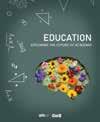









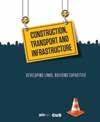





9 771451 783002 ISSN1451-7833 CHARLOTTE RUHE MANAGING DIRECTOR FOR CENTRAL AND SOUTH EASTERN EUROPE AT THE EBRD Serbia Needs A Swifter Economic Shift H.E. MARIA LEVANTI AMBASSADOR OF GREECE TO SERBIA Greece’s Non-Recognition Of Kosovo Remains Unchanged MILJENKO JERGOVIĆ WRITER The Will Of War Compelled Me To Leave Sarajevo interviews opinions news comments events www.cordmagazine.com MARCH 2023/ ISSUE NO. 221 Year Of Turmoil COMMENT FOCUS MARIYA GABRIEL EUROPEAN COMMISSIONER FOR INNOVATION, RESEARCH, CULTURE, EDUCATION AND YOUTH Promised And Delivered! Exclusive ARE WE ON THE VERGE OF A NEW APPROACH TO EUROPEAN INTEGRATION
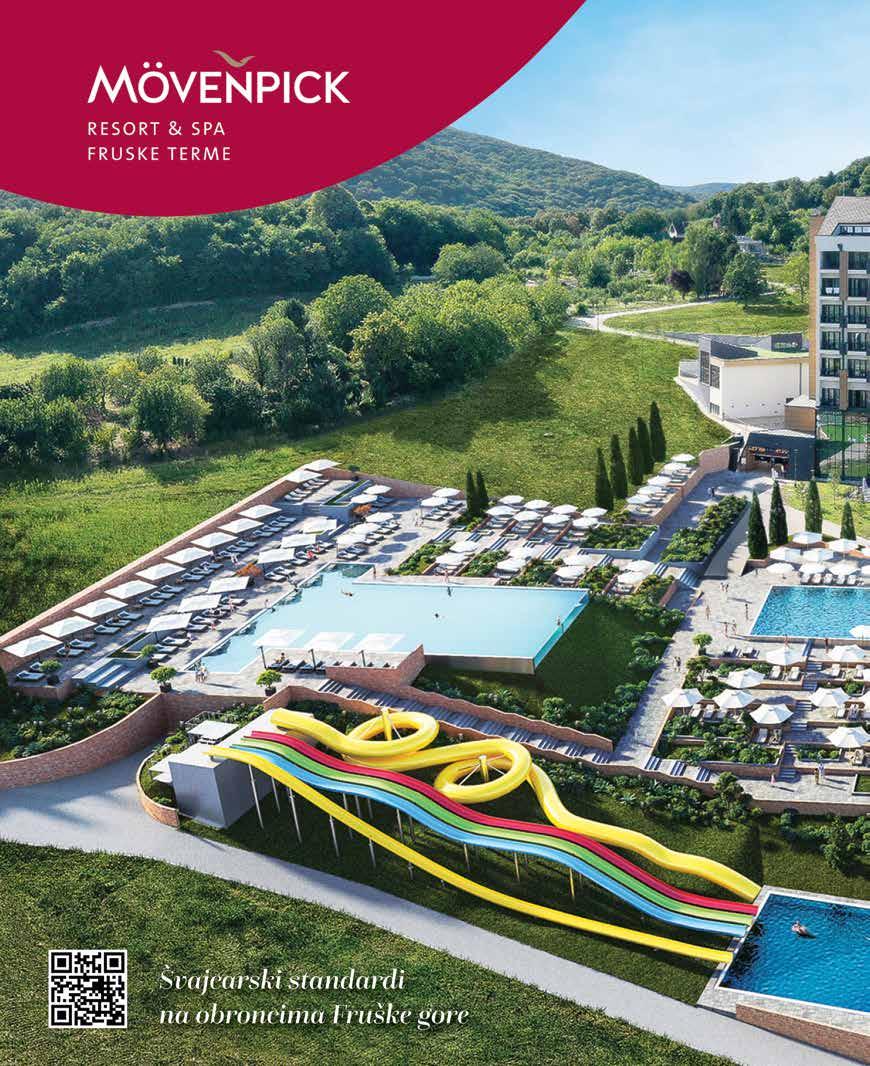
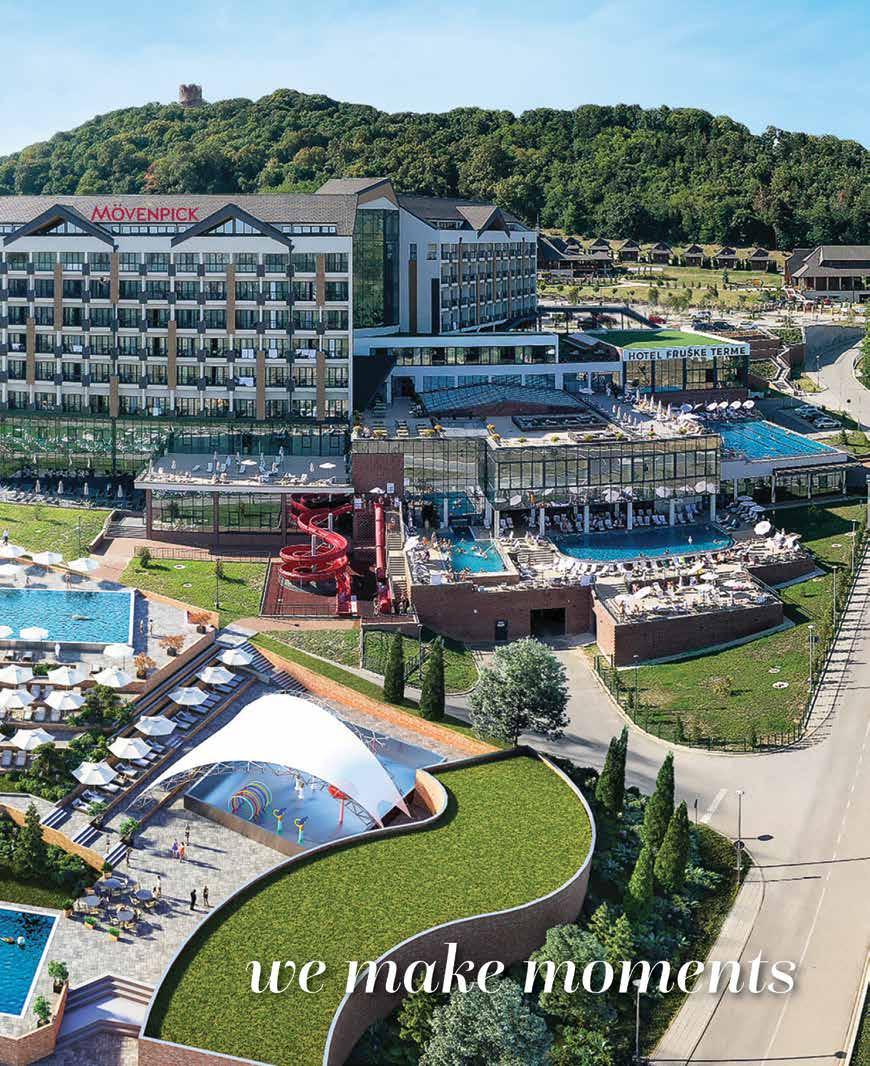
CURRENT TOPIC
@THECORDMAGAZINE
CORDMAGAZINE

EDITOR IN CHIEF:
Neda Lukić n.lukic@aim.rs
ART DIRECTOR:
Branislav Ninković b.ninkovic@aim.rs
CONTRIBUTORS:
Ljubica Gojgić, Radmila Stanković,
Maja Vukadinović, Mirjana Jovanović, Miša Brkić, Rob Dugdale, Steve MacKenzie, Zorica Todorović Mirković, Sonja Ćirić, Miloš Belčević
PHOTOS: Zoran Petrović
COPY EDITOR: Mark Pullen
TRANSLATION & EDITING: PULLEN EDITORIAL HALIFAX

SALES MANAGERS: Biljana Dević, b.devic@aim.rs

Mihailo Čučković, m.cuckovic@aim.rs

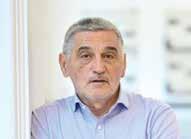
Renata Šteković Zagorac r.zagorac@aim.rs
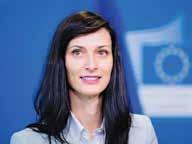
Bojana Nikolić b.nikolic@aim.rs
OFFICE MANAGER: Svetlana Petrović s.petrovic@aim.rs
FINANCE: Dragana Skrobonja finance@aim.rs

EXECUTIVE DIRECTOR: Maja Vidaković m.vidakovic@aim.rs
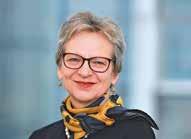
DIRECTOR: Ana Novčić a.novcic@aim.rs a.novcic@cordmagazine.com
PUBLISHER: Ivan Novčić i.novcic@aim.rs
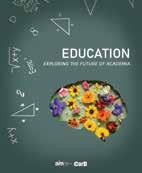


PRINTING:
Rotografika d.o.o. Segedinski put 72, Subotica
CorD is published by:
alliance international media
Prote Mateje 52, 11111 Belgrade 17, PAK 126909, Serbia
Phone: +(381 11) 2450 508

E-mail: office@aim.rs
office@cordmagazine.com www.cordmagazine.com www.aim.rs
ISSN no: 1451-7833
All rights reserved
alliance international media 2023
The views expressed in this publication are those of the presenter; they do not necessary reflect the view of publications published by alliance international media


4 March | 2023 “CorD does not criticise or critique. We are a place where people can inspire and be inspired by others” 06 YEAR OF TURMOIL Comment BY ZORAN PANOVIĆ 08 MARIYA GABRIEL
for Innovation, Research, Culture, Education and Youth PROMISED AND DELIVERED!
CHARLOTTE
NEEDS A SWIFTER ECONOMIC SHIFT 20 UNEXPECTED GIFTS OF WAR Focus ARE WE ON THE VERGE OF A NEW APPROACH TO EUROPEAN INTEGRATION 24 WHAT’S WRONG WITH CHATGPT? Feature
BUSINESS DIALOGUE 48 ROSALIND BREWER
Walgreens
SEEKING DIVERSITY OF THOUGHT
DR STEVAN JOKIĆ
– scientific advisor
OF CONTEMPORARY EDUCATION AND HOW TO OVERCOME THEM
DOG BREEDS IN FAMOUS PAINTINGS Art
MILJENKO JERGOVIĆ
WAR COMPELLED ME TO LEAVE SARAJEVO
CHILL OUT
BEST AND MOST INNOVATIVE NEW GADGETS AND DEVICES IN 2023 Tech
CULTURE CALENDAR
FACES & PLACES
European Commissioner
14
RUHE Managing Director for Central and South Eastern Europe at the European Bank for Reconstruction and Development (EBRD) SERBIA
27
CEO of
Boots Alliance
06
professor
CHALLENGES
52
58
writer THE WILL OF
64
66
68
70
CONTENTS @CORD_MAGAZINE @CORDMAGAZINE

On the morning of the day Russia invaded Ukraine – 24th February, 2022 – I was filming in Novi Sad for my TV show Pressia, and afterwards I went for coffee with the show’s guests. And back then many people were convinced, like one of my guests, in the success of Putin’s blitzkrieg. The other guest of my show wasn’t. He believed in Ukraine and opposed Putin’s autocracy, and he wasn’t particularly fascinated by Vučić. And his stance remains the same a year on. But that guest who was hoping for Putin’s swift blitzkrieg success on that 24th February was aggressively in favour of Vučić, while today – a year on – he remains an enthusiastic supporter of Putin, but in the meantime has publicly become quite sceptical of Vučić. In the sense that Vućić will reach agreement with the West over Kosovo, despite Serbian interests. He is actually implicitly critical of Vučić for being willing to thereby distance himself from Putin.
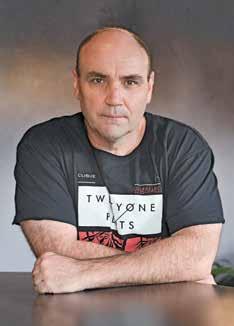
Judging by the mood of my two guests, Serbia has spent the past year subtly and gradually distancing itself from Russia, despite Vučić having not imposed sanctions on Moscow. And even if that is the case, a problem that remains for the opposition is that those two guests of mine with their opposing views on the war in Ukraine (but both conditionally opposed to Vučić), lack the synergy required to forge an alliance against Vučić. When we raise the issue
BY ZORAN PANOVIĆ
Year Of Turmoil
It would be tough to expect the anti-Vučić, pro-Putin Right and the liberal, pro-Western opposition to be able to form a functional alliance to oppose Vučić. This is in stark contrast to the 1990s, when it was possible for the right and civic Serbia to form an alliance against Milošević because the then right-wing opposition was pro-Western. A pro-Western right is today the commodity in shortest supply on the Serbian political market
of synergy to a higher level, it would be tough to expect the anti-Vučić, pro-Putin Right and the liberal, pro-Western opposition to be able to form a functional alliance to oppose Vučić. This is in stark contrast to the 1990s, when it was possible for the right and civic Serbia to form an alliance against Milošević because the right-wing opposition was pro-Western. A pro-Western right is today the commodity in shortest supply on the Serbian political market. And that space can only be filled by Vučić, if he wants or must. It seems somewhat tragicomic when Serbian supporters
Vučić’s influence over political gravity on the quantum vacuum of Serbia’s multiparty system could, in the best-case scenario, redefine and strengthen the politics of the centre in Serbia, even if that would be forced and fake
of the cult of Vladimir Putin attack Vučić for trampling all over democracy, just as liberals and leftists in Serbia who criticise the West and NATO can only serve as Putin’s useful idiots.
Despite having improved his rating with the creating of the cult of Putin, today Vučić has no need of his image as “little Putin” because that suggests he holds a puppet position and opens up Vučić’s “soft underbelly” of the Serbia of the ‘90s, which is used by Albin Kurti in particular. However, emancipating Vučić from Putin is a de-
manding job, even for a technician of government and public opinion like the Serbian president. And that would be the most important loyalty test for the members of Vučić’s Serbian Progressive Party. That’s because, according to Demostat’s research, introducing sanctions against Russia would likely lead to even larger demonstrations against Vučić than any Vučić action implying his acceptance of the West’s plan for Kosovo.
The turbulent parliamentary session on Kosovo and the demonstrations of the right held on Serbian Statehood Day additionally shifted the political panorama and atmosphere. And the question of the pro-Western part of the opposition that must become inclusive for SNS is whether Vučić still sees Serbia in the West. Would another pro-Russian election campaign by Dačić be convincing? Despite media brutally warning Dačić and his Socialist Party of Serbia that they aren’t sufficiently loyal, and the stoic response to their helplessness, it is hard to imagine a new Vučić coalition and a pro-Western partner for SNS if SPS is no longer there. Because there would be no unity whatsoever without them.
Vučić’s influence over political gravity on the quantum vacuum of Serbia’s multiparty system could, in the best-case scenario, redefine and strengthen the politics of the centre in Serbia, even if that would be forced and fake. If elections are held in Serbia this year, that certainly won’t only be Belgrade local elections, as Vučić promised Đilas. And even if they were only local Belgrade elections, there would still be more election talk about the imposing of sanctions against Russia and the situation regarding Kosovo than about the relocating of the city’s zoo.
6 March | 2023
Comment
 MARIYA GABRIEL
EUROPEAN COMMISSIONER FOR INNOVATION, RESEARCH, CULTURE, EDUCATION AND YOUTH
MARIYA GABRIEL
EUROPEAN COMMISSIONER FOR INNOVATION, RESEARCH, CULTURE, EDUCATION AND YOUTH
Promised And Delivered!
There are many examples of excellent cooperation between the EU and the Western Balkan countries in the portfolio of the European Commissioner for Innovation, Research, Culture, Education and Youth. In this interview with Commissioner Mariya Gabriel we address some of the most notable, such as those supported by the Horizon Europe programme, Erasmus+, the Digital Europe Programme and the Enterprise Europe Network
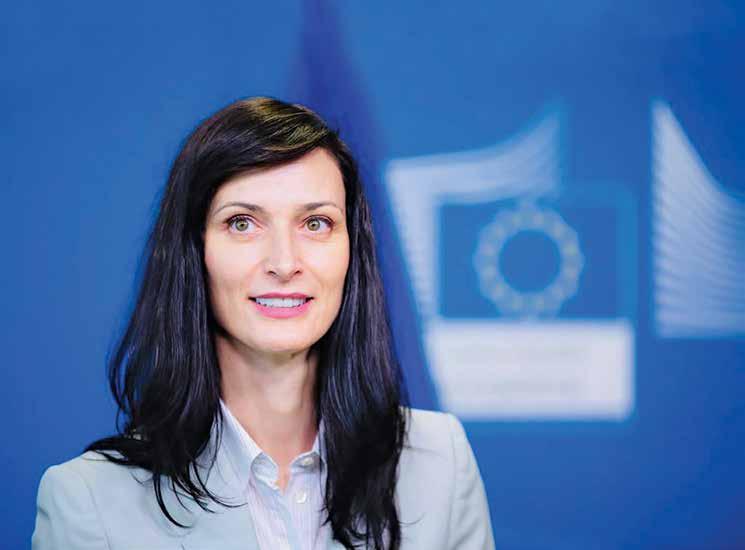
8 March | 2023 Exclusive
Interview
INNOVATION
Innovative measures are being implemented across the region to enhance irrigation and promote sustainable food production, such as the adoption of agri-solar schemes
While Western Balkan countries remain at different stages of the EU accession process, they enjoy the support of the European Union in many areas crucial to their further development – not only in terms of economic growth, but also in many other fields that are important to their European future and wellbeing. Our interview with Commissioner Gabriel serves as an example of the impressive level of cooperation between the European Union and Western Balkan countries. If we want to mention just a few of them, let’s say that all Western Balkan partners have been fully integrated into the Horizon Europe programme for the very first time. Moreover, their participation in the Erasmus+ programme has been renewed and expanded, while the region now also has access to various other initiatives, such as the Digital Europe Programme and the Enterprise Europe Network. And yet our interview with Commissioner Gabriel reveals many more areas of fruitful cooperation.
To what extent is the Western Balkans Agenda on Innovation, Research, Education, Culture, Youth and Sport, which was launched at the end of 2021, operational today?
The implementation of the Agenda is in full swing. Following the launch of the Western Balkans Agenda at the Brdo EU-Western Balkans Summit on 6th October 2021, I have continued my regular meetings with government ministers around the region. In Tirana last year, together with ministers for Culture, Education and Research, we took stock of the achievements of this joint agenda. The event resulted in a number of tangible deliverables across different sectors: we launched the Western Balkans Ministerial Platform on Culture, through which the exchange of best practices, knowledge and experiences will raise our joint work in the field of culture to the next level. I also announced the creation of a new Enhanced Partnership with the Western Balkans under the Erasmus+ programme. This means that education organisations and institutions in the Western Balkans that aren’t already associated
PRIORITY
The Digital Education Action Plan, as a key EU strategy to boost the digital skills of young people, sees youth in the Western Balkans as one of its priorities
with the programme will have the possibility to take part in important strategic actions, such as the European Universities initiative. And we delivered! This year’s Erasmus+ call was already open to all, and we really hope that universities from the region will take full advantage of this opportunity. As a next step, in the following years I would like to extend access to even more initiatives to the four Western Balkan economies not currently associated with the programme. We looked at the reform of education systems in the region and the need to create further youth opportunities, highlighting the opportunities offered by the Erasmus+ and European
SUPPORT
The region has showcased successful utilisation of the Energy Support Package for its green and sustainable energy transition, while more positive developments are also expected
resources are made available for innovation. For the first time, we have ensured that all six Western Balkan economies are participating in our flagship research and innovation programme – Horizon Europe – as associated countries. Their results for the first two years are well above the levels of the previous framework programmes.
I will also mention the first edition of the Regional Butterfly Innovation Award, which we awarded together with the Secretary General of the Regional Cooperation Council, Majlinda Bregu. I was very pleased to see how present the innovation culture is in the Western Balkans. The high level of participation – over 150 applicants – is an outstanding sign of the innovation potential of the region.
I look forward to the upcoming ministerial meeting in Skopje in early June, at which we will discuss with ministers of Western Balkan countries synergies between education and innovation, including how to scale up skills for young researchers and innovators.
Solidarity Corps programmes, notably in light of the legacy of the European Year of Youth 2022.
The meeting in Tirana also gave me the opportunity to present the JRC Science for Policy Report “Status of Environment and Climate in the Western Balkans”, which forms the baseline for our efforts aimed at improving air quality across the region; we highlighted and celebrated the fact that three cities from the Western Balkans are part of the ClimateNeutral and Smart Cities Mission; while we also announced that increased financial
When we consider the Agenda from the perspective of its three main pillars, i.e., support to the economy and job creation, closer alignment with the EU’s strategic priorities and encouraging creative solutions to foster economic growth and stability across the region, which one do you see as gaining the most interest from the EU and Western Balkan counterparts? Taking stock of the past two years of very close cooperation between Western Balkan partners, the European Commission and EU Member States, I see that the first pillar has gained the highest momentum. This is underlined by the fact that all Western Balkan partners are fully associated with Horizon Europe for the first time, participation in Erasmus+ has been renewed and deepened, and we see further initiatives, such as the Digital Europe Programme or the Enterprise Europe Network, that are now accessible to the region.
It is said that Research Infrastructures (RI) can improve anything from geopolitical tensions, the brain drain
9 March | 2023
I look forward to the upcoming ministerial meeting in Skopje in early June, at which we will discuss with ministers of Western Balkan countries synergies between education and innovation, including how to scale up skills for young researchers and innovators
and limp economic growth. How relevant are they today, when the Western Balkan region is suffering from all three?
Indeed, joint experimental facilities, joint survey programmes or large infrastructure projects bring together transnational financial resources and international specialist teams based on requirements that extend beyond the scope of individual countries. Research infrastructure projects are conceived as truly international projects, and world-class international science and technology cooperation is taking place.
Thanks to the support efforts of the Regional Cooperation Council, we now have Research Infrastructure Roadmaps for the Western Balkans. Key research infrastructures
Infrastructure Roadmaps
are located around the Western Balkans, some of which are already fully embedded in the Western Balkans research and innovation ecosystems. I last year launched the 12th round of the European Social Survey research infrastructure, which is fully open to the Western Balkans. Via Horizon Europe, scientists from the Western Balkans have full access to such world-class infrastructure.
How is the current agenda related to previous efforts to draft Smart Specialisation Strategies of the Western Balkan countries that replicate the same documents in the EU?
Smart Specialisation contributes to the enhancement of research and innovation potential across the Western Balkans by focusing on a set of priorities. It is a fundamental part of the second pillar of the Western Balkans Agenda, which combines different areas, including economic, industrial, innovation, labour market and education policies. In helping to develop their links with research and innovation, it often serves as an entry point to understand the broader structural problems confronting a region.
Serbia and Montenegro are already implementing their Smart Specialisation Strategies. Over the course of this year, we expect three

10 March | 2023 Interview
Exclusive
Thanks to the support efforts of the Regional Cooperation Council, we now have Research
for the Western Balkans
more partners to complete their efforts to establish strategies. As a next step, we will look into identifying synergies and communalities at the regional and macro-regional levels. The first efforts across the Adriatic, in the area of the blue-economy, have already begun.
While implementation of Smart Specialisation Strategies in the EU is supported by considerable funding, in Western Balkan countries their application is dependent on national resources. However, it seems that there are certain developments in the area of agriculture and green transformation where we see efforts to align those policies. Can you tell us more about this?
The development and alignment of Smart Specialisation Strategies has been supported by the Instrument for Pre-Accession Assistance, as well as by Horizon Europe’s dedicated support to the Western Balkans. Smart and Sustainable Specialisation Strategies strengthen cooperation between stakeholders and enhance innovation potential. One of the most important stages of the strategy design process centres on position-
ing the new strategy within the existing legal framework and coordinating sectoral policies.
In this context, the agri-food sector has been identified several times as one of the priorities in the region. Together with the Instrument for Pre-accession Assistance for Rural Development (IPARD), we have been working on innovative measure to facilitate rural development via sustainable agriculture and food production. Across the region, we see innovative measures for improving irrigation, as well as the application of agri-solar schemes for sustainable food production.
The €1 billion Energy Support Package presented at the end of last year by President von der Leyen is key to the region’s green and sustainable energy transition. I am particularly pleased to see that these funds are being used for innovative and renewable energy supply schemes. I look forward to hearing more such good news from the region at our next ministerial meeting of the Western Balkans Agenda.
Smart Specialisation Strategies are only one of several important reports provisioned by the Joint Research Centre (JRC) in collaboration with

domestic researchers. How do you see the further role of JRC research in aligning Western Balkan and EU cohesion priorities?
The Joint Research Centre has been the driving force behind Smart Specialisation Strategies. The support to Western Balkan governments has helped identify innovation priority areas and the most effective policy instruments for research and innovation. JRC colleagues have facilitated the dialogue between stakeholders and suggested ways for academia and business to cooperate.
We have so far concentrated our support on upgrading innovation capacities and developing the competitiveness of the Western Balkan region. As a next step, we are looking at the broader context, especially when it comes to the establishment of a more competitive and smarter Europe – with a fully integrated Western Balkan region.
The recent report on innovation readiness in the EU shows a stark divide between well-developed western and eastern members of the EU, while Eastern and Southeast Europe
lag behind. How can this gap be addressed and will these efforts also include Western Balkan countries? The fact that innovation cohesion is strengthening not only among Member States, but also among regions within a single country, makes me very happy. Ten years ago, in an effort to create a more unified and interconnected European research and innovation ecosystem, a dedicated Widening component was incorporated into research and innovation programmes. The Horizon Europe programme increased the budget for this expansion significantly, from €900 million to €2.9 billion. By taking part in this portion of the programme, Western Balkan countries can improve their research and innovation infrastructure.
The start-up scene in the Western Balkans has been growing rapidly over the past few years. The vast majority of these start-ups are in their early phases and are involved in software, eCommerce, digital marketing (AdTech) or gaming. However, the ecosystem is beginning to show signs of diversifying into new fields, including those that merge software and the physical world, such as healthcare, infrastructure, education, manufacturing, and agritech (aka deep tech innovations).
The New European Innovation Agenda targets deep tech innovations squarely. From mobilising 45 billion euros to training a million Europeans in deep technology fields, to establishing a hundred regional innovation valleys, the Agenda covers a wide range of possibilities. As a result of the talent pool and the investment opportunities presented by the New European Innovation Agenda, I believe that many of these innovation valleys will be established by regional authorities in the Western Balkans. I will be glad to assist Western Balkan authorities in creating these innovation valleys.
What are the concrete opportunities offered by the EU when it comes to raising skills and competencies among people in the region?
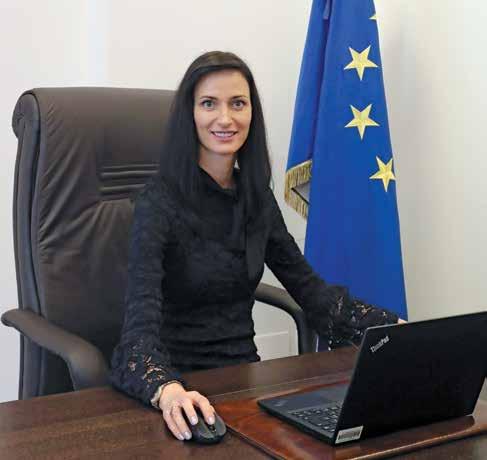
In today’s world, innovation is closely linked to digital knowhow. I strongly believe that education plays a fundamental role in this. We have to equip our young people with digital skills and competencies, and to ensure a just and high-quality digital transition for all. Young people are at the forefront of the digital decade. They should be aware that they have the power to lead and shape it. The Digital Education Action Plan recognises the Western Balkans as a priority. It is a key EU strategy to boost the digital skills of young people.
Addressing regional disparities in innovation capacity across the EU is one of the main objectives of the European Institute
of Innovation and Technology. In order to meet the objectives of the New European Innovation Agenda, the EIT is implementing the Deep Tech Talent Initiative flagship aimed at skilling, re-skilling and upskilling a million talented individuals in deep tech by 2025. This definitely includes talented people from the Western Balkans. It will foster entrepreneurial skills to better translate academic knowledge and research into real life products and services.
The upcoming Call on Excellence Hubs, with €60 million of funding available, addresses the innovation divide specifically, and ways to
improve links between science and business. Its new mentoring module supports emerging place-based innovation ecosystem established in the Western Balkans.
How can women in innovation be supported?
Supporting women in having a fair share of the European deep tech industries is one of the intrinsic responsibilities and objectives of the EU-wide deep tech talent initiative. And I do believe that, beyond numbers, the success of this initiative will also be measured against its concrete contribution to creating a more equal and inclusive deep tech community.
We have launched several programmes, such as the EIT’s Women2Invest Programme and the EU Prize for Women Innovators. With the new European Innovation Agenda, we will further boost our efforts towards ensuring a gender balance. The European Innovation Council (EIC) Women Entrepreneurship and Leadership scheme provides tangible support for early-stage women-led tech start-ups. We have introduced a specific ‘WomenTech EU’ call that will feed into other EU initiatives, such as ‘Women4Cyber’, and should inspire local and regional accelerator programmes, in order to speed up the growth of women-led companies.
12 March | 2023 Interview
Exclusive
For the first time, we have ensured that all six Western Balkan economies are participating in our flagship research and innovation programme – Horizon Europe – as associated countries
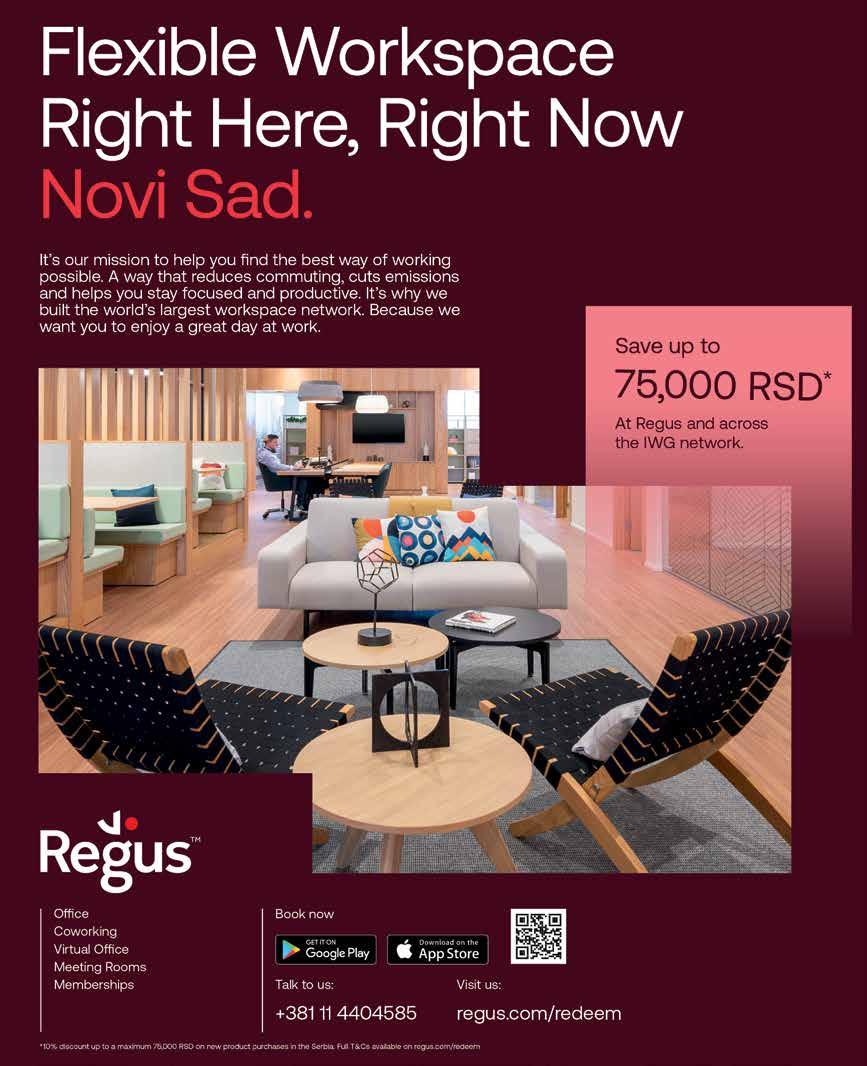 CHARLOTTE RUHE
CHARLOTTE RUHE
MANAGING DIRECTOR FOR CENTRAL AND SOUTH EASTERN EUROPE AT THE EUROPEAN BANK FOR RECONSTRUCTION AND DEVELOPMENT (EBRD)
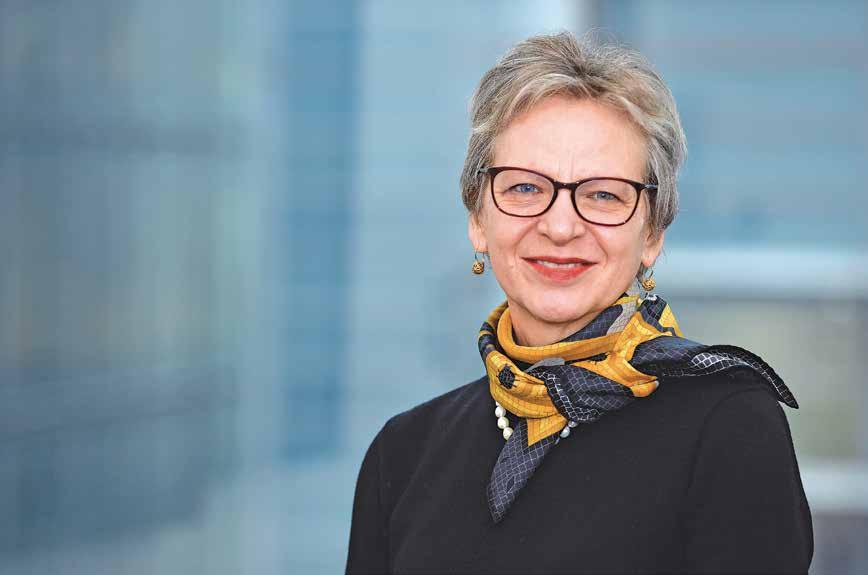
Serbia Needs A Swifter Economic Shift
Although the EBRD forecasts slower growth for Serbia in 2023, than in 2022, the pipeline of projects supported by the EBRD and the EU are promising greener and more advanced structure of the economy in the foreseeable future
14 March | 2023
Interview
POTENTIAL
Serbia has the potential to increase its production of higher complexity products, but currently large shares of its exports are either raw materials, primary products or low-tech manufacturing
In this exciting interview with Charlotte Ruhe, Managing Director for Central and South Eastern Europe at the European Bank for Reconstruction and Development (EBRD), we were provided with an excellent overview of the number of projects the EBRD is currently financing or set to launch in the near future. However, the interview also shows how Serbia and the Western Balkans are building strong bonds with the European Union in many ways that are important to the overall progress of the region and the future wellbeing of its citizens.
What are the most notable advancements in modernising, digitalising and greening the Serbian economy in the last two years?
There is much to say on this! Serbia is getting to grips with the energy sector reform, opening it up to green investment and moving to a more ambitious decarbonisation path. The long-planned introduction of renewable energy auctions is eagerly awaited by investors and, of course, by the EBRD, which is supporting their design and preparation through an extensive technical cooperation programme. Last year brought particular clarity to where the problems lie. Serbia is not the only European country to have been hit with an energy crisis last year, but many problems are home-grown. Structural challenges have been accumulating in the energy sector over many years, and this did not help the country when last year’s energy crisis hit. The government is now confronted by both with the need to reform the state-owned enterprises in the sector and to support the most vulnerable energy consumers. For the Serbian economy to achieve a true breakthrough as a whole, the energy system needs to decarbonise. This is not only to reduce emissions and air pollution, but to reduce reliance on imported fuels. When we look at the European Union,
OPPORTUNITIES
FDI has been remarkably strong in Serbia in recent years, although these investments need to be better leveraged to develop domestic value chains
SUPPORT
While the EBRD invested eight billion euros in Serbia, the same projects we worked on received about €1.6 billion in co-financing from EU institutions.
part of the reason it was able to withstand last year’s energy crisis was because solar and wind power accounted for a record 24 per cent of all energy produced in the EU in 2022. Overall, renewable energy saved the EU about 100 billion euros in gas imports last year.
The EBRD Board of Directors has just approved a loan to Elektropriveda Srbije (EPS), the state energy company, for a total of 300 million euros to support its energy imports. This loan (in two tranches) has a green reform programme attached as a
EU, EIB and the government. The EBRD has committed a total of 550 million euros in tranches. Our loan comes together with several reforms, both at the national level and within Serbian Railways internally. Nationally, work will focus on the independence of the rail regulator, implementation of the Transport Community Treaty and the Rail Sector Action Plan. Serbian Railways will adopt a gender-responsive corporate governance action plan. Separately, the project will lead to a new market-relevant dual learning curriculum for the railway sector, building on the EBRD’s wider work in this area in Serbia (and a number of other countries).
A flagship “green” project we are keenly waiting to come on-stream is the waste-toenergy facility in Vinča outside Belgrade, the former location of one of the largest waste landfill sites in Europe. Now there will be a state-of-the-art facility that will burn nonrecyclable waste with low emissions; gas from the existing dump will be collected, and drain water will be treated. Working with us, IFC, Austria’s development bank and many other partners, Serbia can transform the largest untreated dump into the most striking example of green turnaround in Europe.
condition. It includes boosting renewables, setting a credible decarbonisation path and reforming the company. There will also be a programme to help EPS upskill its workforce.
Decarbonisation of transport is another core priority. What we are doing right now in green transport is one of the largest infrastructure projects in Serbia to date, the high-speed €2.4 billion Belgrade-Niš railway.
As I write this, we are preparing to announce this major upgrade together with the
You recently visited Bosnia-Herzegovina and Serbia with the EBRD president, for whom this was the first in-person visit. What were the most pressing issues to discuss, and how satisfied are you with the outcomes?
Indeed, this was the first in-person trip to the two countries for the EBRD President, who paid a “virtual” visit to Serbia in 2021, during the pandemic. She was very glad to have this opportunity. In Bosnia and Herzegovina, we met with the new authorities; in Serbia, with President Vučić and Prime Minister Brnabić, and in both countries with private sector clients,
15 March | 2023
A flagship “green” project we are keenly waiting to come on-stream is the waste-to-energy facility in Vinča outside Belgrade, the former location of one of the largest waste landfill sites in Europe. There will now be a state-of-the-art facility that will burn nonrecyclable waste with low emissions
infrastructure companies and civil society organisations. The President was optimistic about the long-term potential for green transition in both countries. We discussed renewable energy in both Sarajevo and Belgrade, and both capitals recognise the need to unlock private sector investment. In Serbia, as I mentioned, we are expecting the first renewable energy auctions; in BiH, the issue of grid connection for private developers needs to be resolved.
We also discussed the economy in general; our economic forecast for this year is slower growth than last year, but we expect it to pick up in 2024.
What do you see as the most significant impact on the region, and on Serbia specifically, that has occurred as a result of the continuous EBRD support to improving infrastructure links in the country and across the region?
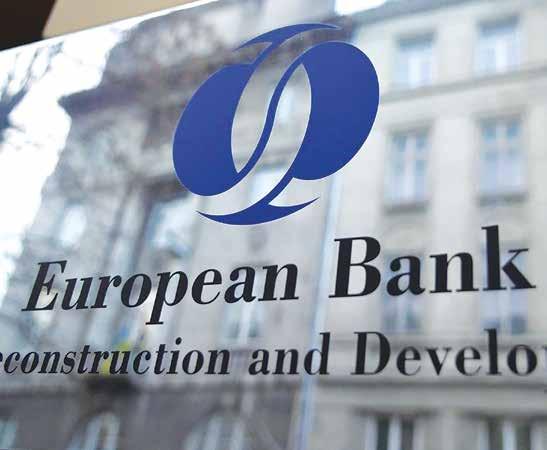
Infrastructure investment has been and remains a key driver of economic growth in Serbia. There is a fairly well-developed road
network that dominates the transport sector, but the railways are set to gain popularity with reforms in the sector underway and the high-speed network expanding. Road and rail coverage in Serbia are already good, but now the task is to improve their quality,
because maintenance of outdated infrastructure is quite costly.
Partly as a result of improving infrastructure, Serbia’s openness to trade has risen exponentially over the past decade. This trade is strongly tied to the nearby EU countries. There is also a steady and broad-based inflow of foreign direct investment.
Observing comparable EU member states, how advanced is Serbia today when it comes to digital infrastructure and the fibre broadband network? Where do you see opportunities for the EBRD to further its support?
Digitalisation in Serbia is progressing well, contributing to the improvement of the business environment, partially thanks to a reduced administrative burden. One of the signs of this is a steady flow of foreign capital, which in turn supports exports. Another good sign of economic development is strong growth in the export-oriented IT sector. The EBRD has provided support to some companies in this field. This sector has a lot of potential to attract educated young Serbians who might otherwise consider employment abroad.
In terms of physical infrastructure, the expansion of broadband to rural areas is advancing. Of course, when we speak about digitalisation we don’t just mean physical connections, but the rise of digital economy and e-government. An open government strategy, which includes a disclosure of more data and an easier participation of citizens, also relies on digitalisation.
Most of our current policy engagements are also in this area: the e-Agrar reform, which aims to establish the online Registry of Agricultural Households and enhance access to finance of farmers; digitalisation of administrative procedures and licenses needed for investing in renewable energy sources; and supporting the digitalisation of the public administration.
Serbia has serious ambitions when it comes to scientific and innovation capacities, starting from the Bio4 campus to expanding the network of Science and Technology Parks. In your opinion, how do these initiatives shape Serbia’s transition to a knowledge-based society?
16 March | 2023
Interview
Infrastructure investment has been and remains a key driver of economic growth in Serbia. There is a fairly well-developed road network, which dominates the transport sector, but railways are set to gain popularity with reforms in the sector underway and the high-speed network expanding
Serbia has the potential to increase production of higher complexity products, but currently a large share of its exports are represented either by raw materials, primary products or low-tech manufacturing, like copper ore, frozen raspberries or electric conductors. At the same time, the country has the same level of education as the European Union. Serbia needs to speed up the shift to a more knowledge-based economy – which we are already seeing in the IT sector – otherwise its workforce will continue moving abroad to find jobs that match their education levels. So, any project that stimulates innovation is good.
To what extent do these advancements represent part of the EU’s largescale efforts?
The EU will answer this question better, but what I can say is that EU efforts in Serbia focus on precisely the areas you are mentioning. Our projects largely leverage EU grants, either as incentives or for technical assistance. This is true both for infrastructure projects and the credit lines implemented through local commercial banks in areas like SME competitiveness, energy efficiency, and gender & youth inclusion.
While the EBRD invested eight billion euros in Serbia, the same projects we worked on received about €1.6 billion in co-financing from EU institutions.
Dual education is among the many topics that the EBRD president discussed with Serbian PM Brnabić. What brings this topic into the focus of policymakers at this time? How do current initiatives build upon previous ones? How does dual education address current worker shortages?
During the president’s visit, we signed a memorandum of understanding with the newly established Office for Dual Education and National Qualifications Framework, tasked to lead the work of the Sector Skills Councils.
This follows several years of efforts, including support to the Sector Skills Council for ICT and agribusiness sectors. As I mentioned earlier, the Belgrade-Niš railway project will have a programme aimed at increasing the supply of skilled workers in that sector. We also
cooperated with the United Group on this. Why is it important right now? There are many reasons, including the one I mentioned: the high levels of education in Serbia do not fully match the skills the industry needs today, or will need tomorrow, and one of the reasons this happens is insufficient communication
between the private sector and education authorities.
How relevant are EBRD initiatives in Serbia and across the Western Balkan region when it comes to the current trend of relocating large value chains?
Maybe not relocating entire large value chains per se, but opportunities lie in creating new pockets of more complex and higher value-added exports, as well as better integrating foreign companies into domestic supply chains. We have historically supported foreign direct investment in all our markets, which helps to drive exports and improve economic complexity. In Serbia, FDI has been remarkably strong in recent years, although these investments need to be better leveraged to develop domestic value chains. But, according to our economists, the structure of Serbian exports is showing some signs of diversification, as we see the emergence of relatively technologically-intensive pockets in a number of industries.
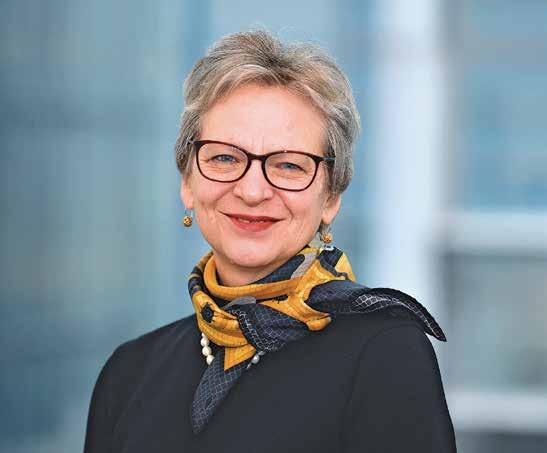
17 March | 2023
Serbia needs to speed up the shift to a more knowledge-based economy – which we are already seeing in the IT sector –otherwise its workforce will continue moving abroad to find jobs that match their education levels. So, any project that stimulates innovation is good
GLOBAL DIARY

US PUTS FORWARD AJAY BANGA TO LEAD WORLD BANK
The World Bank is set to have a new leader as US President Joe Biden has nominated Ajay Banga, an Indian-American entrepreneur, to take over the position following the early resignation of its current head. The decision was made amidst the US govern-

“The goal of the West is to inflict a strategic defeat on Russia, to end us once and for all. We will react accordingly because we are talking about the existence of our country” –
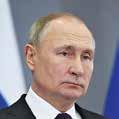
ONE YEAR OF RUSSIAUKRAINE WAR
Ukrainian President Volodymyr Zelenskyy promised victory against Russia on Friday, exactly one year after the start of Europe’s largest conflict since World War II, as Kyiv’s Western allies held commemorations. “It’s the year since everything has changed. Diplomacy did not work. The existing security architecture did not work. But there was something that did work. Unity of Ukraine, Germany, and the entire free world. We endured. We were not defeated. And we will do everything to gain victory this year,” Zelenskyy said in a statement released on social media, adding that his country had “inspired the world. Ukraine has united the world.”

ment’s call for the institution to undertake reforms, particularly in addressing climate change issues. Having been raised in India, Mr. Banga has over a decade of experience as the head of Mastercard, a leading credit card company. According to US officials, his extensive background makes him well-suited to help the World Bank collaborate with the private sector in achieving its objectives. However, the bank’s board is responsible for the official appointment of its next leader.
LEBRON JAMES BECOMES THE ALL-TIME HIGHESTSCORING PLAYER
During the basketball game between the Los Angeles Lakers and Oklahoma City Thunder, LA Lakers forward LeBron James became the all-time highest-scoring player in NBA history during the second half of the game. The 38-year-old passed Abdul-Jabbar’s mark of 38,387 points. But while Abdul-Jabbar took 1,560 games to record his total, James set his record in just over 1,400 appearances. Michael Jordan has the most points per game in NBA history, with 30.1. James is fifth on that list with 27.1, just behind another active player, Kevin Durant, with 27.3.

18 March | 2023
VLADIMIR PUTIN, PRESIDENT OF RUSSIA
“When Vladimir Putin rolled tanks into Ukraine, he thought the world would roll over. He had been dead wrong to think Russia could outlast Ukraine and its Western allies” – JOE BIDEN, U.S. PRESIDENT

MAJOR EARTHQUAKES STRUCK SOUTHERN TURKEY AND NORTHERN SYRIA

When a 7.8 magnitude earthquake struck southeastern Turkey and northwestern Syria, its tremor could be felt as far afield as Lebanon, Cyprus, Greece, Israel, and the Palestinian territories. Both countries at the center are still reeling from the devastating aftermath. More than 46,000 people have been killed as a result of the quakes, and tens of thousands more have been injured thousands more were injured after major earthquakes struck southern Turkey and northern Syria on 6 February and again on 20 February. Thousands of buildings have also been reduced to rubble.

ITALY’S DEMOCRATIC PARTY ELECTS ITS FIRST FEMALE LEADER
The Democratic party (PD), Italy’s most prominent left-wing party, has elected its first female leader, Elly Schlein, aged 37. Schlein surpassed poll predictions to win the leadership race against Stefano Bonaccini. In her victory speech, Schlein declared that
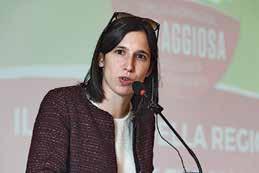
VISITORS ENJOY BLOOMING FLOWERS ACROSS CHINA
As Spring arrives, various flowers are in full bloom, enchanting tourists and adding beauty to nature in both rural and urban areas in many parts of China. Flowers are meticulously taken care of by locals, as they help the villagers develop rural tourism and improve soil nutrition through crop rotation. In Guanzhong Village of Minhou County, east China’s Fujian Province, the bright sunshine and clusters of plum and cherry blossoms together created breathtaking views, attracting many city dwellers to take pictures and enjoy beautiful moments in the sea of flowers.
WORLD OF COLOUR AND TRADITION AT BARRANQUILLA CARNIVAL

the PD was “alive and ready to stand up” and that the party, which has struggled to form a robust opposition to Italy’s right-wing parties, “will be a problem” for the government led by Giorgia Meloni, leader of Brothers of Italy, a party with neofascist roots. Schlein, a former MEP, gained prominence in early 2020 when her small party, Coraggiosa (Courageous), played a crucial role in preventing the farright from taking power in the traditionally left-wing Emilia-Romagna region.
Members of a troupe participate in the Battle of Flowers, the first parade of the Barranquilla Carnival, attended by tens of thousands of people, in Barranquilla, Colombia, on 18 February 2023. Barranquilla is the most important popular festival in Colombia, whose origins date back to the end of the 19th century and which, since 2003, was declared by UNESCO as a Masterpiece of the Oral and Intangible Heritage of Humanity. One of the most important characters of the Barranquilla Carnival is the Marimonda, a grotesque figure dressed in ragged clothes and a mask with a long nose and big ears. The Marimonda is meant to represent the foolishness and carefree spirit of the carnival.
19 March | 2023
Are we on the verge of a New Approach to European integration Focus
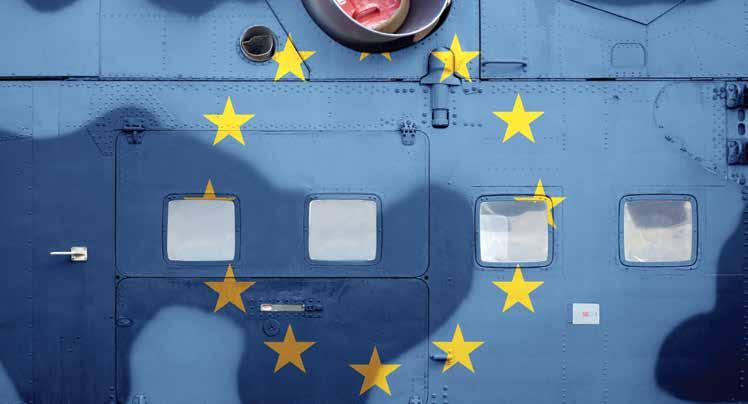
Unexpected Gifts Of War
It appears as though the new approach to the European integration process, which resulted in the expediting of the EU membership candidate status of Moldova and Ukraine, but also Georgia’s potential candidacy, being driven more by geopolitics than adherence to the Copenhagen Criteria. Is it plausible to believe that this change could potentially also impact Western Balkan countries?
Many people are currently wondering about the possibility of a breakthrough in Serbia-Kosovo negotiations, but we took a step back to discuss the broader perspective in which the dialogue between Belgrade and Pristina, the European Commission’s recent recommendation that Moldova and Ukraine be granted EU membership candidate status and that Georgia be considered a potential candidate are all part of the same package - an all-encompassing realignment of EU and NATO foreign and security politics vis-à-vis Russia.
According to our interlocutors, a new concept of European integration seems to be emerging. Driven largely by geopolitics and prioritising the need to secure borders and consolidate the continental bloc amid the prolonged war in Ukraine and Russia’s impact on the wider region, this new approach could also have a detrimental impact on Western Balkan countries.
These advances might be pushing all questions related to chapters and clusters, which have hitherto defined the pace of the Euro integration, onto the backburner. Only a few people are today contemplating the possible effect of Serbia’s failure to open new chapters in 2022. That seems to be of secondary importance in these times when bigger issues of peace
and security are on the table.
Of course, it is far from clear whether all the pieces will fit into this landscape. There are uncertainties surrounding the Belgrade-Pristina dialogue and the attitudes of Western Balkan leaders, particularly Serbia’s. Moreover, there is always the possibility that the EU will be less proactive in encouraging Western Balkan countries to feel welcome in the European family, as was previously the case despite concessions.
Finally, the issue of public opinion in these countries is also important. Unlike before, when the focus was on those opposed to Euro integration, the attitudes of disheartened pro-EU citizens are now of greater significance. While they were always a certain voting base, today – at least in Serbia – they are increasingly nonbelievers.
This new shift in the momentum of Euro integration might not be come as uplifting news for supporters of EU accession in the Western Balkans, given that topics of security could overshadow those related to democracy, freedom of press and corruption, which were in focus during the previous period.
Here our interlocutors dissect these assumptions in greater detail.
20 March | 2023
BRANIMIR JOVANOVIĆ
ECONOMIST AT THE VIENNA INSTITUTE FOR INTERNATIONAL ECONOMIC STUDIES

THE EU AND THE WESTERN BALKANS STILL NEED EACH OTHER
THE IMPORTANCE OF THE WESTERN BALKANS IS PRIMARILY STRATEGIC AND POLITICAL. IF THE EU PUSHES THE REGION AWAY, IT WILL TURN TOWARDS RUSSIA AND CHINA, WHICH WILL BRING MANY CHALLENGES FOR THE EU
Thetroubled relationship between the EU and the Western Balkans comes as no surprise. After all, it seems as though the two sides have nothing much in common except mutual dislike.
The Western Balkans are disappointed by the EU’s broken promises and its constant shifting of the goalposts. They feel that the EU doesn’t really care about the region and views it only as a source of cheap labour that it can exploit even without granting membership.
The EU, on the other hand, isn’t too happy with the Western Balkans’ track record on corruption and is worried about rising authoritarianism in the region, which it sees as being a big problem if the region joins the EU. It also feels like the region is only interested in using the EU as a cash cow.
There’s some truth in those complaints, but the big question is: what happens if the two sides really do split up?
The Western Balkan region is heavily dependent on the EU for trade and investment. The EU buys around two-thirds of the region’s exports, contributes around two-thirds to foreign investments and provides hundreds of millions of euros annually to each of the regional economies through the IPA funds. If the region were to break up with the EU, it could face significant economic consequences.
For the EU, the economic incentives are far smaller. It is already reaping basically all the benefits it could from the Western Balkans: it is taking its brains and talented individuals, selling its products on its markets and taking advantage of cheap labour and low taxes. But the importance of the Western Balkans for the EU is not economic. It is primarily strategic and political. If the EU pushes the region away, the region will turn towards Russia and China, which will bring many challenges for the EU.
The EU and the Western Balkans therefore MUST understand that they need each other and that they will both be worse off if they separate.
WHILE THE WESTERN BALKAN REGION IS HEAVILY DEPENDENT ON THE EU FOR TRADE AND INVESTMENT, THE EU IS ALREADY REAPING BASICALLY ALL THE BENEFITS THAT THE REGION MAY OFFER: BRAINS AND TALENTED INDIVIDUALS, CHEAP LABOUR AND LOW TAXES
The EU, as the bigger partner, should take the first step and show that it really cares about the Western Balkans by speeding up the accession process. While granting membership candidate status to Bosnia-Herzegovina and launching accession talks with Albania were good steps, more needs to be done to speed things up for the rest of the region. Moreover, the EU should provide greater financial support to the region, because the current support provided through the IPA funds is not enough to improve living standards.
The Western Balkan region needs to show its commitment to implementing the necessary reforms in areas like combating corruption, upholding the rule of law and promoting democracy and equality. It should demonstrate to the EU that the accession process is viewed as an opportunity to improve Western Balkan societies and provide a better life for citizens, rather than just a way to extract money and enrich corrupt elites.
The time is now.
21 March | 2023
Are we on the verge of a New Approach to European integration Focus
DR DUŠKO LOPANDIĆ PH.D. VICE PRESIDENT OF THE EUROPEAN MOVEMENT IN SERBIA

THIRD ROUND OF EURO INTEGRATION?
THE NEED TO ACCELERATE UKRAINE’S EU INTEGRATION, COUPLED WITH INCENTIVES TO FORTIFY THE UNION’S INTERNATIONAL GEOPOLITICAL “MIGHT”, AS WELL AS THE GENERAL INFLUENCE AND INTEREST OF THE U.S. IN STABILISING SOUTHEAST EUROPE, WILL LEAD TO A SOMEWHAT GREATER AND FASTER OPENING UP OF THE EU TOWARDS THE COUNTRIES OF THE WESTERN BALKANS DURING THE DECADE AHEAD
Thecouncil of the European Union’s swift acceptance of the EU membership candidate status of both Ukraine and Moldova, but also Georgia, under the conditions of war in Ukraine and dramatic shifts in geopolitical relations within Europe, provided an implicit indication of historical “unfinished business” in the Western Balkans. In this sense, the situation today in Southeast Europe arose, among other things, as a consequence of a series of geostrategic omissions/errors made by the EU over the course of this century to date. They include the following: a de facto slowdown, or the deferring of the enlargement process following the “big bang” expansion of the Union from 15 to 27 member states in the 2004-2007 period; the territorial “crumbling” of the enlargement process when it comes to the once unified socioeconomic area of the former Yugoslavia, i.e. the application of the “frigate” principle instead of a collective approach (like the one applied in the case of the CEE region); this separation was particularly harmful in a geopolitical sense, given the need for the parallel EU integration of Croatia and Serbia; unilateral recognition of Kosovo’s independence without the prior consent of the country to which it belongs (Serbia) – with which all previously accepted principles of respect for national borders were contradicted, including the views of the Badinter Arbitration Committee – had a significant and long-term impact on Serbia’s internal and international situation and consequently possible instability in the region, or across Europe more broadly (i.e., on Russia’s views regarding the issue of the inviolability of national borders).
SERBIA’S FULL EU INTEGRATION WILL NOT BE POSSIBLE WITHOUT DEEPER POLITICAL CHANGES AND REFORMS TO BELGRADE’S CURRENT CENTRIST, AUTOCRATIC REGIME
The government in Belgrade itself has had a significant influence over the slow dynamics of enlargement negotiations when it comes to Serbia, given that the government’s initial enthusiasm - brought by the opening of accession negotiations in 20132014 - quickly gave way to a specific “enlargement fatigue” that manifested internally through a slowing down or abandoning of reforms and a strengthening of the klepto-corruption system, but also an effort on the international front to maintain some kind of policy of friendship in relations with both Russia and China.
The need to accelerate Ukraine’s EU integration, coupled with incentives to fortify the Union’s international geopolitical “might”, as well as the general influence and interest of the U.S. in stabilising Southeast Europe, will lead to a somewhat greater and faster opening up of the EU towards the countries of the Western Balkans during the decade ahead. This will most likely be realised in the form of a “third round” of European integration, i.e., some kind of partial membership with full integration in certain sectors (market, energy, transport, science and education etc.), alongside additional financial incentives from the EU. However, Serbia’s full EU integration will not be possible without deeper political changes and reforms to Belgrade’s current centrist, autocratic regime.
22 March | 2023
VUKAN MARKOVIĆ
UNIVERSITY OF BELGRADE INSTITUTE FOR PHILOSOPHY AND SOCIAL THEORY; CAMBRIDGE UNIVERSITY PH.D. STUDENT

EU ENLARGEMENT IS BACK IN FOCUS
EU ENLARGEMENT IS BECOMING A GEOPOLITICAL TOOL FOR SECURING BORDERS AND CONSOLIDATING THE CONTINENTAL BLOC. THIS WILL LIKELY ALSO IMPACT THE BALKANS, JUDGING BY THE EU’S INCREASED DIPLOMATIC PRESENCE IN THE REGION OVER RECENT MONTHS
TheEU’s decision to grant candidate status to Ukraine and Moldova, and potential candidate status to Georgia, is part of an all-encompassing realignment of the Union’s foreign and security policies: the EU (alongside NATO) is strengthening its eastern flank against Russia.
This decision has very important implications for the logic behind the EU accession process. Not only has proximity to Russia expediated negotiations with these three former Soviet republics, but it has also shifted priorities away from the strict Copenhagen criteria and convoluted negotiation procedures. Conversely, Albania and North Macedonia waited more than 20 years to start negotiating, while Bosnia-Herzegovina only gained candidate status after Ukraine and Moldova.
Accession requirements – ranging from the adopting of essential values, implementing of reforms, securing of human rights and the rule of law, to the resolving of regional issues – seem to have been circumvented in the case of Ukraine and Moldova. At the same time, those criteria proved crucial in slowing the accession negotiation process for Balkan countries for decades. It is worth noting that Moldova is much less attuned to EU criteria than Bosnia-Herzegovina, North Macedonia or Albania. When it comes to unresolved territorial issues, all three of these post-Soviet countries have secessionist regions and contested borders (Georgia even has two of them!).
THE BEST THING THE EU CAN OFFER IS EU MEMBERSHIP ITSELF; ALL OTHER ALTERNATIVES, SUCH AS GRADUAL ENTRY OR SECOND-TIER ACCESSION, ARE HARDLY COMPENSATION FOR RECOGNISING KOSOVO’S INDEPENDENCE
So, the most important implication of the three new prospective EU member states for the Balkans is the fact that security and geopolitical logic – a realpolitik of sorts – seems to have prevailed over the previously dominant narrative that was bureaucratised through the Copenhagen criteria. And EU enlargement is thus back in focus as a geopolitical tool for securing borders and consolidating the continental bloc. This is likely to be the case with the Balkans as well, judging by the EU’s increased diplomatic presence in the region over recent months.
Geopolitics seems to have become the rule of the game when it comes to Serbia’s accession, rather than merely the opening of new chapters or clusters. And this geopolitics centres around the issue of Kosovo, which is slowly becoming the main obstacle on Serbia’s path to Europe. The dispute with Kosovo will actually overshadow all other processes when it comes to future negotiations.
But this isn’t the only reason EU popularity is on the wane in Serbia. What appears to be bothering the Serbian population the most, perhaps even the staunchly pro-EU part of that population, is the distinct lack of a clear perspective. The best thing the EU can offer is EU membership itself; all other alternatives, such as gradual entry or second-tier accession, are hardly compensation for recognising Kosovo’s independence. That being said, this fully-fledged membership in the European Union seems quite elusive – there is no clear indication that Serbia would be admitted sooner even if it fully accepted all conditions. Behind the EU’s diminishing appeal are the excruciating, decade-long negotiations without clear benefits, and not merely anti-EU attitudes.
23 March | 2023
By Daron Acemoglu, Professor of Economics at MIT and Simon Johnson, a former chief economist at the IMF, professor at MIT’s Sloan School of Management / Project Syndicate
What’s Wrong With ChatGPT?
Artificial intelligence is being designed and deployed by corporate America in ways that will disempower and displace workers and degrade the consumer experience, ultimately disappointing most investors. Yet economic history shows that it does not have to be this way

Microsoft is reportedly delighted with OpenAI’s ChatGPT, a naturallanguage artificial-intelligence program capable of generating text that reads as if a human wrote it. Taking advantage of easy access to finance over the
past decade, companies and venture-capital funds invested billions in an AI arms race, resulting in a technology that can now be used to replace humans across a wider range of tasks. This could be a disaster not only for workers, but also for consumers and even investors.
The problem for workers is obvious: there will be fewer jobs requiring strong communication skills, and thus fewer positions that pay well. Cleaners, drivers, and some other manual workers will keep their jobs, but everyone else should be afraid. Consider customer service. Instead of hiring people
24 March | 2023
Feature
to interact with customers, companies will increasingly rely on generative AIs like ChatGPT to placate angry callers with clever and soothing words. Fewer entry-level jobs will mean fewer opportunities to start a career – continuing a trend established by earlier digital technologies.
Consumers, too, will suffer. Chatbots may be fine for handling entirely routine questions, but it is not routine questions that generally lead people to call customer service. When there is a real issue – like an airline grinding to a halt or a pipe bursting in your basement – you want to talk to a well-qualified, empathetic professional with the ability to marshal resources and organize timely solutions. You do not want to be put on hold for eight hours, but nor do you want to speak immediately to an eloquent but ultimately useless chatbot.
Of course, in an ideal world, new companies offering better customer service would emerge and seize market share. But in the real world, many barriers to entry make it difficult for new firms to expand quickly. You may love your local bakery or a friendly airline representative or a particular doctor, but think of what it takes to create a new grocery store chain, a new airline, or a new hospital. Existing firms have big advantages, including important forms of market power that allow them to choose which available technologies to adopt and to use them however they want.
More fundamentally, new companies offering better products and services generally require new technologies, such as digital tools that can make workers more effective and help create better customized services for the company’s clientele. But, since AI investments are putting automation first, these kinds of tools are not even being created.
Investors in publicly traded companies will also lose out in the age of ChatGPT. These companies could be improving the services they offer to consumers by investing in new technologies to make their workforces more productive and capable of performing new tasks, and by providing plenty of training for upgrading employees’ skills. But they are not doing so. Many executives remain obsessed with a strategy that ultimately will come to be remembered as self-defeating: paring back
employment and keeping wages as low as possible. Executives pursue these cuts because it is what the smart kids (analysts, consultants, finance professors, other executives) say they should do, and because Wall Street judges their performance relative to other companies that are also squeezing workers as hard as they can.
AI is also poised to amplify the deleterious social effects of private equity. Already, vast fortunes can be made by buying up companies, loading them with debt while going private, and then hollowing out their workforces – all while paying high dividends to the new owners. Now, ChatGPT and other AI technologies will make it even easier to squeeze workers as much as possible through

25 March | 2023
AI-powered digital tools can be used to help nurses, teachers, and customer-service representatives understand what they are dealing with and what would help improve outcomes for patients, students, and consumers. The predictive power of algorithms could be harnessed to help people, rather than to replace them
workplace surveillance, tougher working conditions, zero-hours contracts, and so forth.
These trends all have dire implications for Americans’ spending power – the engine of the US economy. But as we explain in our forthcoming book, Power and Progress: Our Thousand-Year Struggle Over Technology and Prosperity, a sputtering economic engine need not lie in our future. After all, the introduction of new machinery and technological breakthroughs has had very different consequences in the past.
Over a century ago, Henry Ford revolutionised car production by investing heavily in new electrical machinery and developing a more efficient assembly line. Yes, these new technologies brought some amount of automation, as centralised electricity sources enabled machines to perform more tasks more efficiently. But the reorganisation of the factory that accompanied electrification also created new tasks for workers and thousands of new jobs with higher wages, bolstering shared
prosperity. Ford led the way in demonstrating that creating human-complementary technology is good business.
Today, AI offers an opportunity to do likewise. AI-powered digital tools can be used to help nurses, teachers, and customer-service representatives understand what they are dealing with and what would help improve outcomes for patients, students, and consumers. The predictive power of algorithms could be harnessed to help people, rather than to replace them. If AIs are used to offer recom-
mendations for human consideration, the ability to use such recommendations wisely will be recognised as a valuable human skill. Other AI applications can facilitate better allocation of workers to tasks, or even create completely new markets (think of Airbnb or rideshare apps).

Unfortunately, these opportunities are being neglected, because most U.S. tech leaders continue to spend heavily to develop software that can do what humans already do just fine. They know that they can cash out easily by selling their products to corporations that have developed tunnel vision. Everyone is focused on leveraging AI to cut labour costs, with little concern not only for the immediate customer experience, but also for the future of spending power.
Ford understood that it made no sense to mass-produce cars if the masses couldn’t afford to buy them. Today’s corporate titans, in contrast, are using the new technologies in ways that will ruin our collective future.
26 March | 2023
Feature
Other AI applications can facilitate better allocation of workers to tasks, or even create completely new markets (think of Airbnb or rideshare apps)
In The Company Of The Best
Becoming
Constructing and Managing A


Future
We Are Ready For Global Goals
Slovas
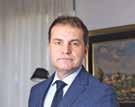

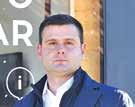


Luxury & Green
Page /35
Banks Operating Very Securely
Page /36
Unparalleled Hedonism
Page /39
SAGA
Three Decades Of Successful Operations

Page /48
Our Plan For The Future Of Logistics
Page /42
The Golden Age Of Zlatibor In The 130th Year Of Tourism
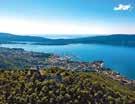


Page /44
A New Chapter In Saga Begins
Page /47
Carlos Puglia Galenika Executive Director for Sales and Marketing
Page /34
Tijana Elez MPC Properties Finance director
Page /33
Brighter
Vladimir Spasić Account Executive, Dell Technologies
Page /30
We’re
A Digital Society
Aleksandar Cicmil CFO, Promont Group Dejan Pejčinović General Manager, Movenpick Fruške Terme
Page /28
– Serbian Hospitality With International Standards!
Vladimir Živanović Director, Zlatibor Tourism Organization
Milan Matić CEO, Delta Transportni Sistem
Viceroy Kopaonik Serbia
Vladimir Vasić Secretary General of the Association of Serbian Banks
Tivat
In The Company Of The Best – Serbian Hospitality With International Standards!
Hotel Fruške Terme has become the first hotel of Mövenpick Hotels & Resorts in Serbia and part of the AccorHotels group, which represents a major step forward for Serbian tourism and the country’s hotel industry. At Fruške Terme, they believe that they will continue their successful operations in 2023 and will satisfy and even exceed their guests’ expectations

Through guest comments, they receive constant confirmations of quality and are compared to the world’s best hotels, which demonstrates that Fruške Terme is not lagging behind similar world destinations of this type and that it additionally has certain advantages that are specific to our lands. And revealing for our magazine just how that is achieved are Aleksandar Cicmil and Dejan Pejčinović.
Only the best are able to join the AccorHotels family, which operates in 110 countries. Fruška Terme proved worthy of its place as Serbia’s largest wellness and spa resort, and thus earned the right to add Mövenpick to its name?
With the high operational standards, excellent visitor numbers and positioning that we achieved as a hotel in the previous period, we compelled the people from Accor to take notice of us and that’s how we received the offer to integrate and enter the group and the Mövenpick premium brand. This largest hospitality company in Europe, with more than 5,300 hotels and around 800,000 rooms in 110 locations worldwide, has

28 March | 2023
ALEKSANDAR CICMIL, CFO, PROMONT GROUP DEJAN PEJČINOVIĆ, GENERAL MANAGER, MOVENPICK FRUŠKE TERME
ALEKSANDAR CICMIL AND DEJAN PEJČINOVIĆ
approximately 40 brands in its portfolio. On the basis of service type and quality, but also the values that we share, we opted for Mövenpick. Integration also implied harmonising certain technical and work standards, and in the period ahead we will have an even better service and lots of things that will make our guests’ stay even more attractive.
For all of us, this serves as great confirmation and recognition of our quality work and business standards. At Promont group, we consider that entering Accor’s European and global chain will contribute significantly to improving the visibility and positioning of our tourist offer and, as a consequence, to higher numbers of visitors from Europe and around the world. We successfully combine Serbian hospitality and international standards, to the great pleasure of all our guests.
Are you relying on Accor’s powerful global network and outstanding loyalty programme contributing to increasing the number of guests you have arriving from beyond Serbia and the Balkan region?
Membership in the Accor programme will certainly influence promotion and presentation, as well as the number of foreign guests, but will also increase the average length of stay in Serbia. Under the scope of the offer itself, benefits are earned for staying longer than two days, which is also promoted under the scope of our package offer, in which we enable guests to take advantage of additional benefits if they stay three or more days.
Thanks to its holistic approach to environmental protection, Green Globe has declared Mövenpick the world’s most sustainable hotel company for five consecutive years already. This fact makes us particularly happy, as it reassures us that you will protect our Fruška Gora...
We also share the same values with the Mövenpick brand on this issue. The Promont company and Fruška Terme resort provide major support to sustainable development programmes. Testifying to this are the areas of greenery and flower gardens at the resort itself, but also the solar panels on our garage that supply electricity to the public lighting system. We have electric chargers in the garage and within the framework of the ethno complex.
The hotel has already spent years working on recycling and the composting of organic
waste. We will this year also be involved in the major drive for the afforestation of Fruška Gora. We are partners in projects promoting a healthy lifestyle, cycling and the Tour de Fruška event, which this May will bring together cyclists from all over Europe on Fruška Gora. Our offer will also include chargers and an electric bicycle rental service for touring Fruška Gora.
Under the auspices of the Mövenpick brand is a programme for the elimination of single-use plastic that we also implement, so at our resort you will see ecological straws for drinks, dispensers for hotel cosmetics that have replaced small plastic bottles, paper bags instead of plastic ones, wooden pencils instead of pens in the rooms and more many details that imply caring for natural resources and sustainability.
precisely this close proximity and accessibility that make us competitive on weekdays too.
On the sunny side of Fruška Gora, surrounded by greenery and hiking trails, you are offered relaxation through nature walks and enjoyment in a natural environment. The Serbian holy mountain, with its 17 monasteries and other cultural and historical monuments, offers additional activities and tour programmes, while there are also the Fruška Gora vineyards and the possibility to tour wineries. Under the scope of our gastronomic offer, we prepare tasting menus at our ethno-restaurant, pairing local specialities and wines.
Mentioning the wooden pencil, it has a cap that contains basil seeds, with the aim of being sowed and producing a new plant.
Mövenpick Fruške Terme Resort & Spa is located a 40-minute drive from Belgrade Nikola Tesla Airport and represents the perfect combination of luxury and nature. We wouldn’t be mistaken if we said that this is precisely what modern people need?
Taking a higher number of shorter holidays throughout the course of the year is a growing trend around the world. A weekend of relaxation in our resort’s thermal mineral pools or indulging in one of the massages at our wellness and SPA centre, all accompanied by delicious local specialities to the songs and sounds of tamburica players, are certainly motives that suit this philosophy. The fast tempo of life, but also extended working days, exhausts modern people, regardless of their occupation. Our geographical position, just an hour away from Belgrade and 20 minutes from Novi Sad, and enabling excellent accessibility from other cities, enables us to spend less time on the road and more time using the facilities we offer. It is
Your hotel has 201 rooms, 11 swimming pools with healing, thermal-mineral water, 12 types of saunas, 11 conference rooms, two restaurants, bars etc. You certainly have more than enough to satisfy even the most demanding guests seeking only the very best. In shaping the offer, we took into considerations the needs of the modern guest, but also the multifunctionality of our facilities. We last year established the Thermal Riviera, a complex of outdoor swimming pools on an area of approximately 10,000 square metres with slides, a splash safari section for children, pools and accompanying bars, thus expanding our pool capacity to accommodate more than 1,200 gusts. At our hotel we welcome families with children and romantic couples, but also business clientele, who comprise an important segment of our business. At present, with around 2,000 square metres of conference halls, we are probably the country’s largest hotel-congress centre, which is also confirmed by our specialisation within the scope of categorisation, in which we define ourselves as a congress hotel.
I think we are a perfect example of another trend being marketed in the MICE (meetings, incentive, conferences & events) segment: BLEISURE – a trend representing the fusing of business & leisure destinations. Participants in educational seminars are additionally motivated to more easily opt to participate in conferences and to stay longer because of the ancillary content that they are able to utilise once the business part of their stay has ended. One of the goals for 2023 is to further develop the entertainment offer at the resort itself, as well as cooperating with other destination-based service providers.
29 March | 2023
At our hotel we welcome families with children and romantic couples, but also business clientele, who comprise an important segment of our business
With its digital solutions, products and services, Dell Technologies advances the operations and business processes of the companies with which it cooperates, while the company’s contribution to public sector digitalisation and improvement is also noticeable. As a socially responsible company, Dell Technologies also addresses the issues of sustainable business operations, climate change, environmental protection, and the position of women in the IT sector, as well as consistently and continuously utilising technology to change the world for the better
We’re Becoming A Digital Society
Apart from developing digital solutions, products and services, Dell Technologies also invests its time and effort in the development of society and provides support to numerous events that could help in the achieving of further progress, one of which is the Kopaonik Business Forum. Our interlocutor believes that this year’s forum will – as has been the case in all previous years – highlight areas where we need further progress and development, as well as ways to achieve those goals and improve the country where we live.
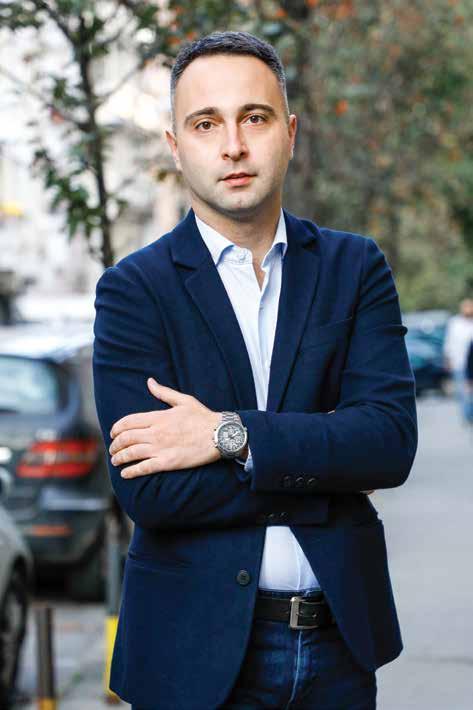
30 March | 2023
VLADIMIR SPASIĆ, ACCOUNT EXECUTIVE, DELL TECHNOLOGIES
The world has been confronted by enormous challenges for the past three years. Initially with the pandemic, then with the war and the arrival of the energy and economic crisis. How did all this reflect on the IT sector?
The previous three years were extremely challenging in a business sense. The stability and development of the IT sector, which had enjoyed natural growth for years, experienced a sudden boom in a very short period. Somewhat unexpectedly, the whole world turned to solutions that had previously existed, but that hadn’t enjoyed widespread use.
With the outbreak of the pandemic, everything shifted online. There were really great challenges at the start, because companies had invested in an “in-house” culture, but employees had to adapt very quickly to the new situation and to function under those conditions. Projects halted instantaneously, but then it was as though someone waved a magic wand and used it to suddenly speed up all activities. We soon reached a paradox: new projects came at such a high speed that companies had to hire additional staff, because their existing human resources were overloaded. Of course, not all companies felt an improvement in their business – unfortunately, a certain section of those same companies had to lower their expectations.
A large part of the problem from the beginning of the pandemic and the general crisis spilled over onto companies that had based their core business on producing IT equipment. There were such major delivery delays that certain projects failed to meet their own planned deadlines and lasted a year and a half longer than planned. That also became our reality at one point, but we then reached production and delivery stabilisation in mid-2022, so everything went back to normal.
It isn’t possible to provide a generic answer explaining how the overall situation impacted the IT industry as a whole. Some segments of our industry flourished markedly and technological solutions found their application, while parts of the industry sustained heavy losses. We will
feel the full impact of the crisis in the long run, because the IT industry – according to the assessments of world-renowned agencies – is awaited by a period of instability and unpredictability.
The market is constantly changing and imposing the need to increasingly introduce new solutions and more modern services. Serbia doesn’t differ from the rest of the world in this respect?
The world market is changing by the day, with the use of modern technologies having opened the door to the advancement of humankind. The tempo of daily life has increased drastically, and with it created the need to amend procedures and switch from paper to electronic services. Serbia has been lagging behind
and the digitalisation of the entire state administration is underway, and we are thus becoming a digital society.
In both the state and private sectors, we will take banks as an example. Services have been simplified so much that we almost don’t need any physical contact in order to interact with the bank and complete everything we need on a daily basis.
Your company is among the sponsors of the Kopaonik Business Forum. What do you expect from the event itself, and how do expect the rest of 2023 to unfold in an economic sense?
the rest of the world in that sense, and a huge need arose to digitally transform procedures, both in the state and private sectors. The establishment and development of the state’s Office for IT and eGovernment led to significant shifts in the state sector, while in the meantime a significant number of civic procedures have been simplified and transferred to digital channels.
Thanks to these developments, we can state unreservedly that Serbia is actually ahead of individual EU member states at this moment, when it comes to the number of services it provides to citizens; that there are no longer long queues to submit requests to issue new passports or identity cards. Apart from the services that are now already basic, we have taken a significant step forward
Apart from developing digital solutions, products and services, Dell Technologies also invests its time and effort in the development of society and provides support to numerous events that could help in the achieving of further progress. The Kopaonik Business Forum is one of the events at which opinions are exchanged regarding the further advancement of society and economy, and simply how we can improve the country where we live. I believe that this year’s forum will – as has been the case in all previous years – highlight areas where we need further progress and development, as well as ways to achieve those goals. From the current perspective, the future appears really unpredictable, alongside all the events currently unfolding around the world, and 2023 will be no less demanding than all previous years. In an economic sense, it was expected that emerging from the two-year crisis caused by the pandemic would usher in a more peaceful period that would enable economic development, first and foremost of fiscal policies, and would provide sufficient time to return to a certain sustainable path, according to the words of world experts. Alongside all the expectations of experts, and there are various opinions, and when we take them all into consideration, I think we shouldn’t stop fighting and that we should have a positive attitude in order to influence the environment and successfully overcome the possible negative impacts of possible crises.
31 March | 2023
We will feel the full impact of the crisis in the long run, because the IT industry –according to the assessments of world-renowned agencies – is awaited by a period of instability and unpredictability
“Our job is to ensure that business is faster, more efficient and simpler, both through regional initiatives like the Open Balkan initiative and the Western Balkans Chamber Investment Forum, as well as through submitting initiatives to the Government in the best interest of the economy“ ~
MIHAILO VESOVIĆ, DIRECTOR OF THE CCIS (PKS) SECTOR FOR STRATEGIC ANALYSIS, SERVICES AND INTERNATIONALISATION

BRANKOV BUSINESS CENTRE, GREEN OASIS IN THE CITY CENTRE
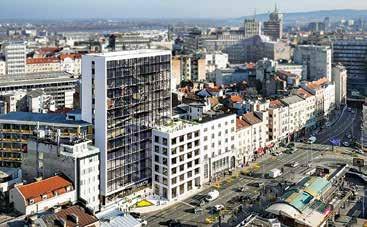
BRANKOV Business Centre covers a total area of 10,500 square metres, of which about 8,000 will be for rent. The building has 15 floors, a modernequipped entrance hall that uses natural and sustainable materials in accordance with global trends, and a green terrace for tenants on the sixth floor roviding a view over the capital. The value of this investment is estimated at around 20 million euros. Respecting the concept of sustainable development, this new, modern office building in the city centre will be harmonised with green building principles according to the criteria of EDGE (Excellence in Design for Greater Efficiencies) global standards, with a focus on creating a healthy work environment and optimising energy consumption, which minimises costs for tenants.
ELECTRONIC RECORDING OF VAT IN THE ELECTRONIC INVOICE SYSTEM, CHALLENGES FROM PRACTISE
The Slovenian Business Club and IB Interbilanz Consulting & Audit d.o.o., with the support of the Ministry of Finance of the Republic of Serbia, organised a working breakfast on the topic “Electronic recording of VAT calculations in the electronic invoice system - challenges from practise”. It was noted that SEF represents a new channel of EF exchange, that EF enables attachments to be submitted in which VAT is shown, but that one should definitely avoid creating documents with VAT shown if it is not about invoices for the sale of goods or services (e.g. delivery notes and construction situations).
MERCEDES-BENZ LEADS LUXURY ELECTRIC VEHICLES MARKET IN SERBIA

In 2022, Star Import, general distributor of Mercedes-Benz vehicles for Serbia, Montenegro, Bosnia-Herzegovina and Albania, sold the most electric luxury vehicles on the territory of Serbia. From January to December 2022, the Mercedes-Benz brand in Serbia delivered 33 fully electric passenger vehicles to customers, accounting for 19.41% of total sales of electric vehicles. With 22,785 vehicles, the market of new passenger vehicles in Serbia in 2022 decreased 6% compared to 2021. The share of sales of fully electric vehicles on the Serbian market is 0.75% in 2022, while in 2021 it stood at 0.28%.
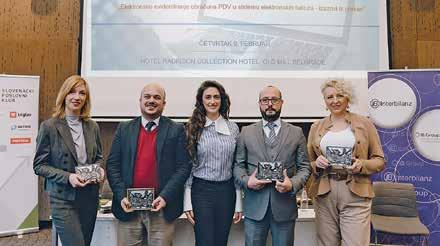
32 March | 2023
LOCAL NEWS
Constructing and Managing A Brighter Future
For MPC Properties, ESG goals are more than a strategy woven into the business plan; for this company they are a modus operandi. Here MPC Properties’ Finance Director Tijana Elez discusses this, but also future investments and redevelopment projects, with CorD Magazine.

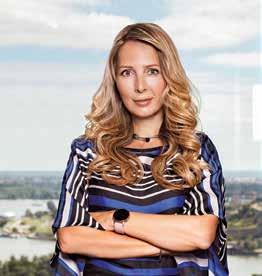
Your company has constructed some of the highest quality properties in the best locations, while you also manage those properties. Are you aware of the major positive impact you have on the community?
The highest quality properties on the best locations, indeed gives us dominant position on the market, but it should not be taken for granted. Real estate is not easy to manage, and I would say that the way of management is key factor that gives a leadership position to MPC Properties. I believe that all stakeholders in our business ecosystem, but also the local community, can testify to MPC Properties’ multi-layered commitment: to the construction and managing real estate in accordance with green building standards and application of innovative solutions that bring prosperity to all the business partners, visitors, or users of our buildings. By sharing the best business practices and projects in our community, we strengthen it and make our business sustainable in the long term.
Could it be said that this is a good moment for investment, taking into consideration the complex global situation?
It is important to use resources wisely. The previous years were years of development projects for us, so we are now able to focus on redevelopment projects. The shopping centres’ renovation is one of the primary goals bringing along innovations in the
offer of the centre, such as, for example, a new F&B concept, entertainment zone etc. When it comes to new investments in 2023, I would say that this is the year to be patient and selective.
MPC Properties has developed its CSR strategy in accordance with ESG targets. What does that bring you as a company, and what do you offer the wider community with this strategy?
For us, ESG goals are more than a strategy woven into a business plan. For MPC Properties, they are modus operandi. Our commitment, in this sense, always goes a step further. The crucial green building strategy is that during the development of the project, its entire life cycle is considered, which starts from the idea, planning, design, through the execution of works, all the way to the operations. MPC Properties deals not only with the construction of assets but also with their management and maintenance, so it is very important for us to manage the entire development of the project, bearing in mind that after the investment in green building systems,
significant savings will be achieved during operation. It is not only that our portfolio is certified according to the most important world certificates, whereby placing the focus on achieving energy efficiency and reducing environmental impact (LEED GOLD, BREEAM, WELL Health-Safety), but it’s also a “nursery” of ESG projects. With a systematic and comprehensive approach, sustainable real estate is developed, which in the long run reduces risk and affects profitability. Green projects represent an example of the implementation of innovative solutions for the scaled process of the circular economy at the micro level of a building and closed sustainable solutions at the property level, with the aim of implementing projects that are in accordance with the Declaration of the Green Agenda, and in connection with the reduction of emissions with the greenhouse effect, environmental protection and promoting new sustainable projects.
This year began with the procurement of a composting machine located on the building of Usće Shopping Center. Alongside recycling, to which we have been already committed, with composting we have also introduced an innovative business model that implies treating waste where it is being generated. The procurement of the UŠĆE compost machine was supported by the UNDP project “Just Green Transition and Decarbonisation in Serbia”, funded by The Embassy of Japan and implemented by the UNDP Serbia in cooperation with the Ministry of Mining and Energy and the Ministry of Environmental Protection of the Republic of Serbia in strategic partnership with Chamber of Commerce and Industry of Serbia.To conclude, our mission and contribution is creating a strong community around our portfolio, in which diversity, inclusion and loyalty programmes are fostered through the most varied projects.
33 March | 2023
Investment is an essential element of doing business successfully, and MPC Properties continues to make intelligent investments across its entire portfolio, in both business and retail segments
TIJANA ELEZ, MPC PROPERTIES FINANCE DIRECTOR
CARLOS PUGLIA, GALENIKA EXECUTIVE DIRECTOR FOR SALES AND MARKETING
We Are Ready For Global Goals
As part of Grupo NC, one of the largest conglomerates in Brazil, Galenika is a company that operates on the global market. Its focus is on further expansion to international markets and the 2023 plan includes further expansion on the EU market, with the goal of launching products in Croatia and Slovenia

Galenika has a new Executive Director for Sales and Marketing, who will take advantage of his enviable experience to additionally expand operations and position new products. Here he reveals for our readers what he will do to ensure Galenika achieves its global goals.
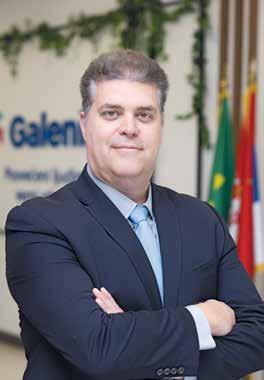
Over the course of the 26 years of your career to date, you have amassed great experience and achieved a series of successes at major national and multinational pharmaceutical companies. How useful is that experience to you today?
Working in various segments of the pharma industry led to me facing many challenges, but also opportunities. I have solid experience in implementing and achieving results in areas of management, commercial, demand and marketing, with strategic performance and support in restructuring within multicultural business environments. My experience in implementing strategic and innovative initiatives allowed me to redesign assertive plans many times, and accordingly to market trends to adapt the existing business model. This is something that I plan to implement at Galenika in order for it to achieve its global goals.
Galenika operates successfully on 17 international markets of Europe, the Middle East and Africa. Will you take advantage of your enviable experience to additionally expand its operations and position new products?
As part of Grupo NC, one of the largest conglomerates in Brazil, Galenika is a company that operates on the global market. Our focus is further expansion on international markets. In 2022, through Galenika International ltd., our subsidiary in Hungary, we launched Galenika products for the EU
In the non-prescription drugs and food-supplement segment, Galenika has 14 leading brands that are among the top three in their respective categories in Serbia, including 8 that are number 1
market for the first time. We plan further expansion on the EU market in 2023, with the goal of launching products in Croatia and Slovenia, while we are also planning, among other things, to extend our footprint to new markets in the coming years. These plans may sound like a challenge, but I strongly believe that my international experience of
the European and Latin American markets, including market global strategy localisation, will contribute to achieving this goal.
You and your team are working full steam ahead on the implementation of ambitious plans for 2023 and the coming years. Could you share some details of those plans with us and our readers?
To illustrate Galenika’s way of thinking - I am proud to say that in the non-prescription drugs and food-supplement segment, Galenika has 14 leading brands that are among the top three in their respective categories in Serbia, including 8 that are number 1! However, our business aspirations do not stop there. In that regard, we created a new portfolio structure and process to monitor and track innovative products that form part of our new action plan. This also encompasses new marketing and sales tools in order to reach our 2023 goals. The focus will be on new launches of strategic brands, both in Serbia and the markets of the region.
Despite you having only been based in Serbia for just seven months, we’re sure that you’ve managed to familiarise yourself with our culture. What do you like in Serbia? I have a friend in Brazil, an ophthalmologist, whose is of Serbian origin. He mentioned to me that Serbia is the “European Brazil”. The way people celebrate and the way they welcome foreigners is very similar to Brazilian people...Having been in Serbia for seven months, I can truly confirm the veracity of all his words and I’m very happy to have an opportunity to live and work in this country.
34 March | 2023
Luxury & Green
The Montenegrin coastal town of Tivat was declared one of the ten most colourful conference locations in 2021, in category M - up to 1,200 conference participants, and the current year began with an award within the Meeting Star Awards 2022/2023 competition
Apart from the fact that it is located in one of the most beautiful bays in the world - the Bay of Kotor, Tivat can boast of easy accessibility by air and excellent hotels. Tivat Airport connects the Montenegrin coast with destinations throughout Europe. Some of the best and most prestigious hotels in the world are located here, such as Regent Porto Montenegro, The Chedi Luštica Bay, Nikki Beach. Two seaside villages, Porto Montenegro and Luštica Bay, offer many possibilities for holding events of all kinds.
Surrounded by islands with a rich cultural heritage, walking paths, fishing villages and a nature reserve, Tivat can recently boast the label of a green destination. Tivat was the first applicant from Montenegro to join the Green Destinations programme and after an audit and evaluation by the Green Destinations certification committee, successfully achieved the Green Destinations Bronze Award status. With this achievement, Tivat is the first destination in the Western Balkans (WB6) to reach this level.
Tivat is also loved by fans of water sports, such as sailing and diving. The picturesque bay, the rich underwater world, clean nature and the warm sea have for years been tempting regatta participants to enjoy the sunset on the Tivat Riviera. Ideal for relaxation, sporting opportunities add to the value of Tivat as a luxury and conference destination.
We should not forget that Tivat is an ideal base for visiting the rest of the Bay of Kotor and Montenegro. This small, mountainous Mediterranean country is easy to get around, but difficult to get to know. It is full of hidden corners, and
The luxury found at every step in Tivat exudes charm and leisure and beckons you to enjoy yourself. Besides, this small town also has its own story. It is told by medieval palaces, interesting museum exhibits, but also by the locals - through innate hospitality, festivals that preserve age-old traditions and a sophisticated gastronomic culture
each region has its own characteristics that distinguish it from the others. The coast is typically Mediterranean, but in Tivat everything is raised an octave.
The luxury found at every step in Tivat exudes charm and leisure and beckons you to enjoy yourself. Besides, this small town also has its own story. It is told by medieval palaces, interesting museum exhibits, but also by the locals - through innate hospitality, festivals that preserve age-old traditions and a sophisticated gastronomic culture.
Tivat is a town that serves as an example that inspires us all to always do better and more. Its success story began recently, although it seems as if it has always belonged there. Tivat also teaches us that it is possible to succeed and develop, while remaining committed to tradition and preserving nature.
Tivat is luxury that motivates, nature that relaxes and culture that broadens horizons!
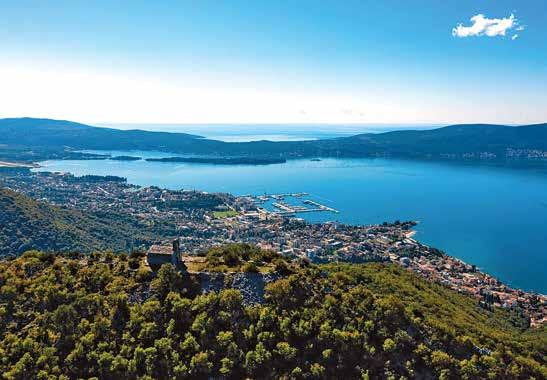
35 March | 2023
TIVAT
Banks Operating Very Securely
The previous year was marked by numerous challenges, from the war in Ukraine, via energy and economic crises, rising inflation in the U.S. and across our continent, to the growth of benchmark interest rates and Euribor. However, despite all this, banks in Serbia operate very securely and without any agitation whatsoever. This provides a serious argument testifying to their stability and ability to participate in the implementing of investments and raising citizens’ living standards
The Secretary General of the Association of Serbian Banks, an institution that has existed for an entire century and can boast of providing a great contribution to the banking sector, observes the economic trends in our country and around the world with a sense of optimism. He expects inflationary pressures to ease, interest rates to fall, growth in savings and credit activity to continue and banks to digitalise further, but also the development of fintech services. Vladimir Vasić believes that banks operating in Serbia will continue mounting resistance against negative global trends and adopting the best solutions from developed markets.

Globalisation is a process that has long since encompassed all segments of life, and that includes the banking system in Serbia. How has it reflected the influence of the world market? Can we feel a sense of serenity? Globalisation is generally inevitable, and in this sense the banking sector is no exception. Serbia is part of the world in that it receives and implements global innovations, but also in that it feels the influence of the global economy, for example in terms of the interest rate policies of the leading central banks. However, it should also be noted that banks in Serbia actually exist on the basis of the deposits of local citizens and are thus partly protected against global influences.

36 March | 2023
VLADIMIR VASIĆ, SECRETARY GENERAL OF THE ASSOCIATION OF SERBIAN BANKS
The previous years have shown us just how serene we can be. During the COVID pandemic, and the subsequent situation caused by the conflict in Ukraine, during a period of rising inflation globally, banks are operating very securely and without any agitation whatsoever. I believe that this is a serious argument testifying to their stability.
Let’s start with a little optimism... You stated recently that light is finally appearing at the end of the tunnel and that inflationary pressures seem to be coming to an end. What are your expectations and forecasts for this year?
Inflation isn’t an easy opponent and halting it always takes time. That’s why it’s necessary to have a little patience until the activities of central banks and other mechanisms used by governments start to take effect. We are already seeing positive results on the American economy, and we expect to see progress in Europe and Serbia by the end of the year. Our central bank has announced a halt to inflation in the second half of the year and a significant reduction during the next year. That assessment seems realistic and achievable.
We long had a negative interest rate and the Euribor was also negative, which was good for euro loans until the situation changed. Who has been hit hardest? Will falling inflation drive interest rates down? Benchmark interest rates increased due to rising inflation and, with its return to planned frameworks, we can expect interest rates to fall. It should also be considered that negative interest rates like those seen over the past decade are not the rule, but rather the exception. It isn’t realistic for money to be so cheap, though I understand that this was a pleasant situation for sections of the citizenry or the economy.
We are continuing to see growth in savings and loan activity. What does that tell us about the living standard of citizens, trust in the local currency and the banking system, economic trends in Serbia etc.?
The continuous growth of savings is extremely good news for the Serbian economy. I don’t need to remind you that savings form the basis of development, that deposited savings cover the crediting needs of
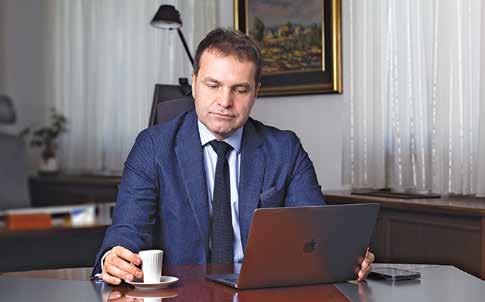
companies and the population. The growth of savings demonstrates growth in the amount of earnings that citizens are able to set aside, but it also points to increased trust in banks and the state, because that money is not, as the saying goes, in straw sacks, but rather in savings accounts. The same can be said for the growth of loan activity, which is a way banks operate and also participate in the realisation of investments and raising citizens’ living standards. It is important that loan indebtedness is sustainable, and this is indeed the case in Serbia, because in terms of levels of indebtedness we remain below most comparable countries and regions.
In the field of digitalisation, Serbia is absolutely keeping pace with the world, which is why most tasks are completed without needing to visit a branch. Does the credit for this belong to banks that bring new technologies from their home markets?
The vast majority of banking tasks can today be carried out without the need to go
to a counter, or a branch: cash withdrawals and payments, payment by card, QR codes, via the internet or mobile devices. Even opening an account and receiving a loan approval can, under certain circumstances, be completed without paying a visit to the bank. Banking is undoubtedly at the very top when it comes to digitalised businesses and services. The majority of innovative technologies have indeed arrived via the leading European banking groups, which expanded their operations to the territory of Serbia, and that process of learning from the best is continuing.
The banking system endeavours to preserve its certitude and reliability, because they are what make it the basis of every economy. Why is it important to differentiate the system from new, modern and fast financial services?
Banks are already digitalised, and thus very modern and efficient. It’s no secret that we learnt from technological innovators in this process and applied the best solutions reached. In that sense, banking and fintech services are very similar in some domains. On the other hand, we mustn’t forget that banks bring tradition and confirmed reliability, that they are under special attention and operate within the legal framework of regulatory bodies. This is a quality that still distinguishes them from all other market participants.
37 March | 2023
Our central bank has announced a halt to inflation in the second half of the year and a significant reduction during the next year
“The energy field, IT industry and domestic agriculture and production will, alongside tourism and foreign direct investments related to projects in these sectors, be motors of the country’s economic development” ~
GORAN ÐUROVIĆ, MONTENEGRIN MINISTER OF ECONOMIC DEVELOPMENT
GAS PIPELINE CONSTRUCTIOIS AN IMPORTANT MOMENT FOR SERBIA AND BULGARIA
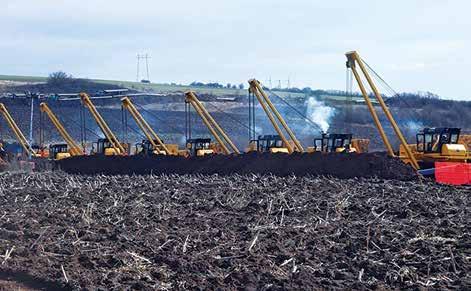
Serbian President Aleksandar Vučić and Bulgarian President Rumen Radev met in Kostinbrod near Sofia, where work began on constructing a gas interconnector between Serbia and Bulgaria on Bulgarian territory. Head of the EU Delegation in Serbia, Emanuele Giaufret, also attended that event. “I hope that both of us, on both sides, will complete the works by October and that before the end of the year, gas will flow through this interconnector,” said Vučić.
On this occasion, the European Union Commissioner for Energy, Kadri Simson, congratulated Bulgaria and Serbia in a video message on the start of construction of the gas interconnection from the Bulgarian side.

WB6 CIF APPOINTS LULZIM RAFUNA AS THE PRESIDENT OF ITS MANAGEMENT BOARD

After President Marko Čadež announced at the Investment Conference in Ljubljana, members of the Managing Board officially confirmed the appointment of the newly elected President of the Kosovo Chamber of Commerce, Lulzim Rafuna, as the President of the WB6 CIF Management Board until the end of the mandate previously entrusted to President Marko Čadež. In this way, the region’s chambers proved their willingness to work even more strongly and effectively to strengthen mutual ties and create a region without borders and obstacles for business.
SERBIA HAS THE LOWEST UNEMPLOYMENT RATE IN THE WESTERN BALKANS
Kosovo and Bosnia and Herzegovina lead the number of unemployed in the Western Balkans, while Serbia has the lowest unemployment rate, the World Bank announced. At the same time, the unemployment rate in the five countries of the Western Balkans fell by 13.5 % in the last 15 years, ending in mid-2022, reports Radio Free Europe. In Kosovo, which has 1,739,825 inhabitants, the unemployment rate is 31.3 %, followed by BiH, which has 3,531,159 inhabitants with an unemployment rate of 30.7 per cent. In Montenegro, which has 619,211 inhabitants, the unemployment rate is 20.1%, and in North Macedonia, with 1,836,713 inhabitants, the unemployment rate is 14.3 %. In Albania, which has 2,829,741 inhabitants, the unemployment rate is 11.1 percent, while Serbia, with 6,834,326 inhabitants, has the lowest unemployment rate of 8.9 %, according to the World Bank announcement.

38 March | 2023
REGIONAL NEWS
Unparalleled Hedonism
Viceroy Kopaonik Serbia is this year again continuing to raise hospitality standards
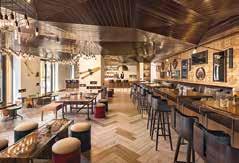

There are many reasons to visit Kopaonik this winter – whether you’re a fan of nature, winter sports, gastronomy or good parties. If you belong to one of these groups and have yet to experience hotel Viceroy Kopaonik Serbia, now is the right time to do so
After adventures on the ski slopes and hiking in beautiful landscapes, immediately after descending from the mountain, you are awaited by a hidden bar with faded golden ambience, an ideal place of enjoyment. While enjoying majestic mountain views, treat yourself to delicious snacks and authentic cocktails (recommendation: Adrenalin Pique) prepared by experienced bartenders. Whether you’re in the mood for pizza, burgers or truffle fries, every choice is right. In the case that you want to spice up your food selection, opt for the share platters with falafels, Indian naan and various sauces.
ALWAYS BE AT THE PIQUE OF THE SEASON
Various offers and contents are at the disposal of all guests and visitors during the week. Given that ladies receive special attention at Viceroy, not only on 8th March, every Thursday on the schedule is Ladies First Night, from 7 to 10 pm. With light musical rhythms, ladies will receive a second free drink for every one they order, as well as an exclusive 20% discount on light snacks.
For all those who prefer good parties and want to leap into the weekend in a frenzy of excitement, there’s live music every Friday, as well as a specially created two for the price of one cocktail offer, alongside a rich selection of beverages. In the case that your Saturday morning starts late due to the previous night’s crazy party, all you need is a genuine gastronomic recharge at Pique. Enjoy an endless Tapas brunch from 1 to 5 pm. Discover some new, interesting flavours or taste some of your favourite dishes.
TRAVELLING THROUGH ASIA ON KOPAONIK
If you have a sudden craving for exotic Japanese cuisine (seasoned with local fla-
vours), Peroko, the only Asian restaurant on Kopaonik, is the right address. Throughout this winter, every Friday you’ll have an opportunity to enjoy “All you can eat”/Infinity sushi. A team of top culinary experts will present to you a sushi menu inspired by the
picturesque Japan. The chef’s presence in the dining hall and interaction with guests raise the food and drink tasting experience to a higher level. Expert sommeliers will select the right wine as the perfect accompaniment to your selected bites, and creative bartenders will amaze you with unusual cocktails that include Japanese drinks. There are many different flavour combinations to choose from, and even those with the most discerning palate will surely find their favourite.
ADVENTURES FOR THE YOUNGEST
In order for your youngest to enjoy their favourite activities, the Kids Club will definitely prove to be their oasis of games and learning. Together with the enthusiastic staff of the V Team Children’s Playhouse, your little ones will be able to try their hand at sports, art workshops, tentmaking and many activities that will nurture and develop their creative minds and strengthen their play.
WELLNESS RECHARGE
After indulging in gastronomic tours and exciting adventures, enjoy a relaxing time in the spacious rooms and the unique experience of the hotel’s intimate SPA centre. By choosing a 5-star experience, you will receive the opportunity to indulge in unique wellness amenities like massages, revitalisation treatments, relaxation in the pool and saunas. There are ample reasons to take the time to create unforgettable memories at the only “ski-in, ski-out” 5-star resort on Silver Mountain, to recharge your batteries in the company of your loved ones, and don’t miss out on the opportunity to bid farewell to winter and welcome a memorable spring. Book your stay at:

www.viceroyhotelsandresorts.com/serbia

39 March | 2023
BOOK YOUR UNFORGETTABLE EXPERIENCE AT PEROKO RESTAURANT Infinity sushi (All you can eat), every Friday, from 6 to 11pm.
VICEROY KOPAONIK SERBIA
Three Decades Of Successful Operations
One of the leading companies in the country and around the region when it comes to trade in stainless steel materials, engineering and the manufacturing of process equipment, Slovas has celebrated three decades of successful operations and presented its major plans for the future, with its recognisable quality and even better results
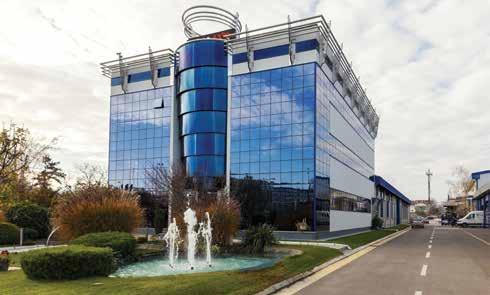
Slovas’s story begins on 4th February 1993, when Slobodan Vasilijević embarked, with modest capital and a clear vision, on his own business mission, setting the highest objectives for himself. The company today operates with more than 10,000 customers and has a range of more 24,000 items, with sales throughout the country and around the region. Additionally, as many as 65 small enterprises have developed their operations alongside Slovas and today function as the company’s customers and suppliers. As they point out at Slovas, this represents the perfect recipe for success and the progress of the economy as a whole, with subcontractors provided with the support needed to develop their operations.

Slovas’s core activity is trade in stainless steel/inox and stainless steel materials, such as: sheets, tubes, bars, rods, steel flat bars, “L” profiles, as well as complete basic accessories and additional materials. Apart from trade, Slovas also deals with design activities, the manufacturing of equipment and the execution of works. As stated by the company itself, Slovas has the capacity to produce cutting-edge process equipment for the food, chemical, construction, mechanical and mining industries, as well as all other branches of industry. Its production plant possesses state-of-the-art equipment, which has enabled Slovas to become the absolute market leader and provided the ability to respond effectively to any technical-technological request, thanks to which customers
can source both raw materials and finished products in one place.
At Slovas they highlight with pride that their operations utilise the latest generation industrial machinery, as well as the fact that constant investments in the latest industrial equipment, but also in people, have enabled this domestic company to maintain its market leadership position.
Slovas has so far operated successfully for three decades, with each decade having brought with it new challenges, but also new business successes. As pointed out at the company, this year’s anniversary represents the right juncture to construct a new service centre for processing stainless steel materials and to expand the team that already comprises more than 40 employees,

40 March | 2023
SLOVAS
including some who’ve been with the company since its very inception. At Slovas they are particularly proud of the fact that the team is being joined by the children of their existing employees, noting that this second generation provides proof that the company has operated in a correct manner and to the satisfaction of employees.

The celebration of the jubilee, held on 5th February 2023 at Čačak’s Morava Hotel, was attended by more than 380 guests from around the world. Business partners and friends of Slovas arrived from as far away as Russia, Germany, Iran, Austria, Switzerland, Egypt, Pakistan, Ukraine, Spain, Great Britain,

as well as Čačak Mayor Milun Todorović, who gave a welcome speech and congratulated Slovas on its jubilee.
The Vasilijević family serves as proof that family is the starting point of all successes, but also provides a safe haven after every working day. Slobodan Vasilijević is the father of three children and, as he himself points out, his eldest daughter, Anđela, accompanied him on business trips from an early age and expressed a desire to continue the family business. She is today a successful third-year mechanical engineering student at London’s prestigious Queen Mary University and a brand-ambassador of the Slovas

Eritrea, Sri Lanka, Italy, India, Slovenia, North Macedonia, Bosnia-Herzegovina, Montenegro, France, Czechia, Saudi Arabia, Hungary, Belgium, Croatia, Qatar and Slovakia.
Great successes also come as a result of excellent business cooperation with many other companies, which is why Slovas utilised this celebration to present plaques commemorating outstanding business cooperation to its business partners. The most loyal workers received appropriate gifts as a sign of gratitude for all the knowhow, energy and dedication that they’ve provided, and will continue to provide, in their jobs.
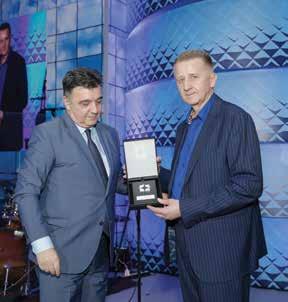
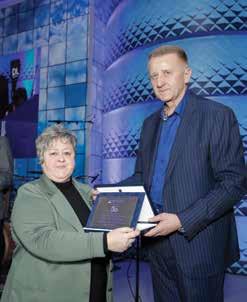
Among the many guests were His Excellency Rashid Hasanpour, Iranian Ambassador to Serbia, the directors and owners of the largest companies operating in this industry,
company, having worked successfully on the internationalisation of the company’s trade and services. Slobodan’s younger daughter is also slowly entering the world of business with her father’s advice, while ten-year-old son Vukašin, as the family’s youngest member, has been growing up at Slovas since taking his first steps and will one day continue achieving business success there, together with his sisters.
Finally, it should be noted that Slovas is also a company that has a strong CSR culture and demonstrates its social responsibility through various projects and donations, participating in the improving of living standards and helping the community with the aim of ensuring that we all live a better and higher quality life together.
41 March | 2023
SLOBODAN VASILIJEVIĆ, SLOVAS OWNER AND DIRECTOR, WITH FAMILY
Our Plan For The Future Of Logistics
Delta Transportni Sistem has been continuously improving its operations since its foundation and until today, aiming to improve the quality of its service. They began their regional expansion by opening companies in Montenegro and BosniaHerzegovina, then, at the end of 2021, they opened a company in Slovenia and, in December 2022, in Croatia

Our goals for the coming period are to continue developing our services and to expand our storage and transport capacities, both on the Serbian market and in the region - announces DTS director Milan Matić, who was chosen as the most successful young manager in 2022 by the Serbian Association of Managers.
You have an exceptional year behind you... DTS’ total revenue is up by about 35% over the previous year, and EBITDA by 30%. What else do the numbers say? Numbers are consequences and always come as a result of steps taken and decisions made. At DTS, we have worked a lot on rejuvenating and expanding our team, with which we plan to achieve all our ambitious goals, as we have done until now. When you have a team like this, it’s easy to talk about numbers. We have done a lot. First of all, last year we expanded part of our storage capacity, introduced new software solutions, and marked the first anniversary of our very successful work in Slovenia. In addition to all this, DTS is the first logistics company that has five electric vans in its fleet.

42 March | 2023
MILAN MATIĆ, CEO, DELTA TRANSPORTNI SISTEM
You have taken great steps forward. We assume that you have big goals and ambitious plans for the coming period... Our goals for the coming period are first of all to continue developing our services, for which our custom software solutions will help us. We are also continuing to expand our storage and transport capacities, both on the Serbian market and in the region. Since February of this year,
dedicated and responsible people, is the key to our success.
There have recently been many changes on the market where you operate. Are you happy with how you’ve adjusted to it all? Our vision is to be a regional leader. With all the changes that are happening in the logistics market, but also those that are yet to happen, we see a huge opportunity for us, because we at DTS are dedicated to quality. Change is an integral part of our lives, and one of my favourite quotes speaks to exactly that. Natural laws are universal, and we should listen more to nature and apply certain laws to business more often.
“It is not the strongest of the species that survives, nor the most intelligent that survives. It is the one that is most adaptable to change,” ~ Charles Darwin.
matured together with us and accepted very responsible tasks and projects. The development of our young staff is of great importance to us, because they are our future. On the other hand, our ambition and the vision we have set has brought many experts from the market to join our team in recent times. We all have the same goal, for DTS to be a regional leader in logistics services, recognisable above all for its impeccable quality, trust and the people who make it what it is.
You received the annual award of the Serbian Association of Managers for the most successful young manager of 2022. What does this award mean to you, how do you see it?
DTS has further expanded its portfolio of services by entering the cold chain field, which is increasingly important in supply chains both locally and globally.
In addition to our existing storage capacity of 26,000 pallet places, we have invested in expanding this capacity by as many as 12,000 pallet places in a controlled temperature regime. In this way, we have positioned ourselves as the strongest logistics provider in the region in the field of cold chain and a partner of world-famous brands in this industry. We are convinced that our cold storage facilities, modern and technically equipped to the highest international standards with four multifunctional chambers for minus and plus mode, which makes it unique in this region, will become one of the strongest generators of growth and development for DTS.
DTS has continued its regional expansion. After opening companies in Montenegro and Bosnia-Herzegovina, at the end of 2021, we opened a company in Slovenia, and, in December 2022, in Croatia. We will continue on this path, because we want to extend our quality to the entire region and show that we have something to offer the market. I would like to conclude that the integration of all logistics services, together with our software solutions and
We are all witnesses of what recently happened in the logistics market. Falling prices in container transport, lack of capacity, serious fluctuations in imports and exports are just some of the things that have happened in the market where we operate. Labour shortage is now a problem here in almost all industries, and a few years ago, logistics was the first to feel the lack of drivers, forklift operators and warehouse workers.
That’s why I believe the key thing when you’re in the business of providing a service is the trust you build with your customers. It is this trust that will make a serious difference in the business we are engaged in.
Without a good team, without colleagues who share the same vision, it is not possible to make long-term plans. Does the fact that you have a great team mean that you have big, ambitious plans?
Ambitious plans are an integral part of all Delta companies. What is much more important than the plans themselves are the people who are tasked with turning those plans into achievements. I can safely say that the DTS team has changed its look in the last couple of years. A large number of young people for whom DTS was their first working experience
This award is intended for an individual, but it is solely the merit of the people I was surrounded by and the environment in which I moved throughout my life, both privately and professionally. I am most
We expanded our existing storage capacity of 26,000 pallet spaces by 12,000 pallet spaces in controlled temperature regime
proud of the fact that this award went to a logistics company. Above all this is an award for the entire DTS team and the whole staff and is the result of everything we have done together in recent times. I personally see it as a reward for all logistics specialists. The work we do is very challenging and you have to love it. And when you love something, you don’t see it as a job, you live, sleep and wake up with it.
I would like to point out that I am proud of all the young people at DTS at the beginning of their careers who were not aware of the work we do, and then came to love it after coming to our company through practice and specific responsibilities. Ambition, energy and passion for the work you do are, for me, the main formula for success!
43 March | 2023
A large number of young people for whom DTS was their first work experience matured together with us and accepted very responsible tasks and projects
The Golden Age Of Zlatibor In The 130th Year Of Tourism
Our ‘golden mountain’ welcomes the 130th anniversary of its history of tourism with record attendance, the most comprehensive offering, the longest panoramic cable car, the richest cultural programmes, top-quality accommodation and beautiful nature
Among other things, our rise is the result of heavy investment by the Municipality of Čajetina, the state and private investors, the development of the centre and surroundings of Zlatibor, the construction of new facilities and tourist sites and constant adjustments - says Živanović, noting that the number of tourists is approaching half a million each year.
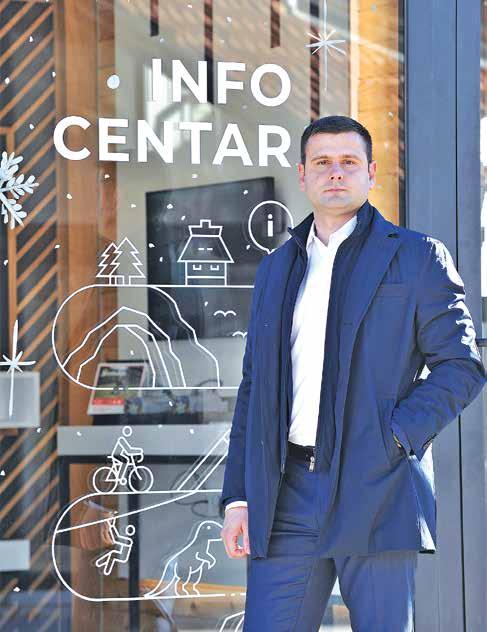
This year is very important for you. How long has it been since the beginning of organised tourism on Zlatibor?
From the feast of the Transfiguration in 1893, when the young king Aleksandar Obrenović was welcomed by dance and song in Zlatiborac and gave the funds to build the King’s fountain, until today, a full 130 years have passed. This fountain is proof of the durability and stability of our tourist tradition. Such a long history of organised tourism, of which we are proud, shows a continuous upward path. It started with modest tourist steps at the beginning of the 20th century, when the first visitors discovered the beauty and value of this mountain, and reached the current golden age of Zlatibor, with records in the number of guests and the prestigious title of the most visited mountain in Serbia.
How did the ‘golden mountain’ reach the first place among mountain destinations in popularity and visitor numbers?
We can proudly point out that the rich past and tradition of Zlatibor tourism were patiently built by generations of tourism workers, without whose dedication the
44 March | 2023
VLADIMIR ŽIVANOVIĆ, DIRECTOR, ZLATIBOR TOURISM ORGANIZATION
‘golden mountain’ would not be at Serbia’s summit today. Such a rise is the result of constant investment by the municipality of Čajetina, the state and private investors, the development of the centre and surroundings of Zlatibor, the construction of new facilities and tourist sites and adaptation to different types of tourist.
That’s why the ‘golden mountain’ is now one of the favorite destinations for visitors who can enjoy not only natural beauty and clean air, but also many attractions, active vacations, theme parks, wellness and spa centers, modern flavours and traditional local specialities. Today there are many kinds of accommodation: from the most luxurious five-star hotels with a touch of glamour and an offer for particularly demanding guests, to homely accommodation in private apartments, boarding houses and rural households.
It is mostly families who stay and enjoy themselves with us. There are many families with a long tradition of holidaying on Zlatibor, often for generations. It is especially pleasing that more and more
young people are coming to us, because it is fashionable to stay on the most visited mountain in Serbia. They enjoy having fun in clubs and parks, delicious meals, walks in nature. Photos of the fountain lake and impressive scenes from the gondola cabins are among the most frequently posted on social media.
Are we wrong when we say that today’s guests are looking for much more than natural beauty, decent accommodation, delicious food and prices to fit their budget? Although we have never had a shortage of guests, a special contribution to the development of Zlatibor’s tourism in recent years has been made by the Gold Gondola, the longest panoramic cable car in the world, which connects the centre of Zlatibor with the highest peak, Tornik, via a nine-kilometre aerial route. For the past two years of operation, it has confirmed that it brings us a key step forward: from the first rides in January 2021 until now it has carried more than 500,000 passengers, who have seen that the view from the top of the mountain
It is mostly families who stay and enjoy themselves with us. There are many families with a long tradition of holidaying on Zlatibor, often for generations
is the most beautiful. In this winter season, the Gold Gondola offers something new: Zlatibor Tourism Organization’s unique “brunch in the air” is available to passengers, as a light traditional Zlatibor meal in the cabins, then tubing at the intermediate station and other activities.
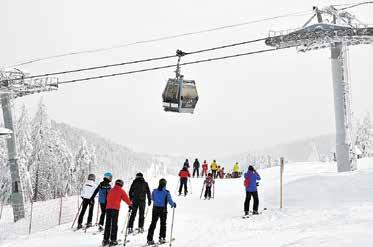
Besides the renovated King’s Square in Zlatibor centre there is a renovated lake and a multimedia fountain, which - with its sound, light and laser effects - is an attraction to be proud of. The play of its shining beams of light always delights our guests, and there were the most of them during the New Year’s concerts on the King’s Square, when Zlatibor saw a record 100,000 visitors.
The special value of Zlatibor’s diverse
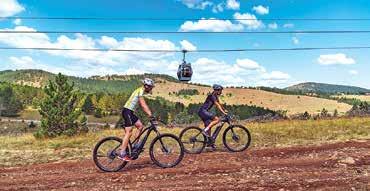

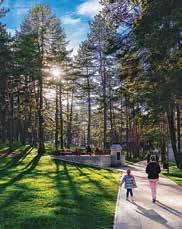
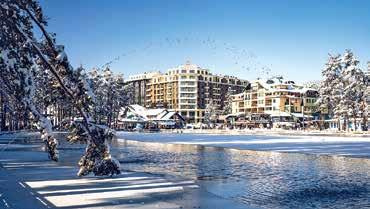
45 March | 2023
KING’S FOUNTAIN
GOSTILJE WATERFALL KING’S FOUNTAIN
TORNIK
CYCLE TRACK
tourist offer is also enhanced by well-known attractions that are available to tourists all year round: the pride of speleology, Stopića Cave (the most visited in Serbia); the heart of Zlatibor’s tradition, the Staro Selo museum in Sirogojno; the pearl of water and nature, the waterfall at Gostilje; the adventure park and Dino park with lots of activities for children; the El Paso City theme park, and other attractions on the ‘golden mountain’. These enable our guests to complete their stay on Zlatibor with 10 organised day trips to surrounding areas.
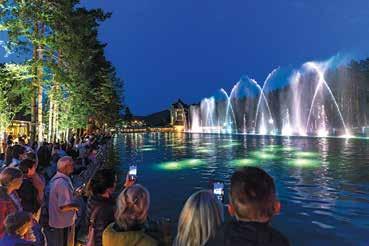

It’s been a long time since you’ve had an off season. Does this mean that you have something to offer at every time of the year? It’s not only summer and winter that bring prosperity to Zlatibor. It has become a destination that gathers a large number of local and foreign tourists throughout the year. First of all, Serbian guests have a large share in maintaining the high tourist traffic. There are, of course, tourists from the countries of the region, mostly from Republika Srpska and Montenegro, and we are pleased with the increase in the number of guests from Western countries. Thanks to the exceptionally equipped and located Zlatibor autocamp, we are regularly visited by campers from the Netherlands, Belgium, the Czech Republic, Slovenia and other countries. In recent seasons, a larger number of tourists from Romania has been noticed, and there are also some from Arab countries.
Event and sports tourism are booming in our country. Traditional events are organised, and sports competitions are increasingly numerous – thanks to our
new fields, more and more sports teams are coming to us for training camps. We regularly hold the Zlatibor Cultural Summer with more than 50 quality events, and there is also our Zlatibor Cultural Centre, which contributes to the strong development of culture with all kinds of exhibitions, cinema screenings, theatre performances and international events.
How do you feel about the winter season now winding down?
We have many reasons to be happy because tourists from Serbia and the whole world have found their holiday and entertainment right here on Zlatibor. They have enjoyed a real winter idyll here, on the trails, cable cars, ski slopes, ice rink, promenades... Many skied at the Tornik Ski Centre, which has five ski trails covering a total length of about 10 kilometres, a six-seater cable car and a system for artificial snow. Besides skiing, Tornik also offered visitors adrenaline fun on bobsled tracks, an adventure park and a conveyor belt for training children and novice skiers. At the Obudovica ski resort in the centre of Zlatibor, a large number of children and recreational sportspeople had the opportunity to enjoy the snow, and the nearby Adventure Park offered them its winter facilities, enabling pleasant and safe skiing. Overall, it was a successful winter for ‘Golden Mountain’ tourism.
Would the results have been so impressive if there were no large investment and an inconsistent implementation of the development strategy?
The Municipality of Čajetina has contributed in a major way to the overall tourism
This year, the Gold Gondola offers passengers a unique “brunch in the air”, a traditional Zlatibor meal in the cabin, then tubing at the intermediate station...
success by investing record amounts in infrastructure and development. Year by year, this investment is increasing, and this year the construction of a sports complex with 20 open football fields is starting on the stretch from the Tornik hotel along the Golden Gondola route. The Zlatibor Tourism Organization proudly presents all of the novelties on offer and other valuable content with which the ‘golden mountain’ maintains its leadership position, at domestic and European fairs, in the media, publications, and on social networks.
And when such natural beauty, so much investment, work and commitment to tourism are combined, it is no surprise that in 2022 the number of tourists was 10 per cent higher than the previous year. That’s why Zlatibor is more organised, more visited and stronger than ever, with the highest attendance in history (close to half a million tourists per year), the most comprehensive offer, first-class accommodation, the best arranged centre of the tourist area, the longest panoramic cable car, the most visited cave, the richest cultural programmes, modern buildings, amusement parks, halls, swimming pools, ski centres – as it marks the 130th anniversary of organised tourism.
46 March | 2023
STOPICA CAVE
MULTIMEDIA FOUNTAIN
TOYOTA AND HONDA ANNOUNCE BIGGEST PAY RISES IN DECADES

Japanese motor industry giants Toyota and Honda say they have agreed to give their workers in the country the biggest pay rises in decades. They are the latest firms in the world’s third-largest economy to increase wages as prices jump. Official figures published last month showed Japan’s rate of inflation was at its highest level in over 40 years. That has put pressure on businesses and authorities to help people as their spending power shrinks. Each year Japanese firms typically hold pay talks with unions for weeks before announcing their decisions around the middle of March. The car makers have not said why this year’s announcements were made earlier than usual.
A New Chapter In Saga Begins
Since its founding almost three and a half decades ago, Saga has been a leader in the digital transformation, and today, after establishing a partnership with Noventiq, it will further expand the scope of support it can offer its clients.
Noventiq is a leading global provider of solutions and services in the digital transformation and cyber security. Their multi-cloud solutions enable, facilitate and accelerate the digital transformation for companies around the world.
We are proud to announce that a new era in our business is beginning. We have agreed with Noventiq for them to acquire a majority share in our company Saga d.o.o. Belgrade , and all terms of the acquisition have been fully finalized.
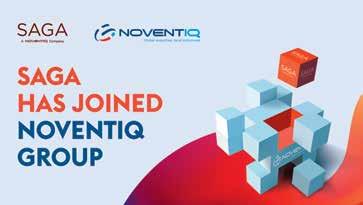
Since it was established in 1989, Saga has selflessly shared and increased its knowledge, constantly transferring experience, both among its staff, its partners and users. All this has made Saga a leader in the digital transformation. Our company is

recognized in the world of finance and banking for its own advanced fintech solutions and solutions based on artificial intelligence and machine learning models.
On the other hand, Noventiq is a leading global provider of solutions and services in the
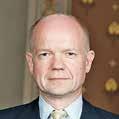
digital transformation and cyber security. Noventiq’s multi-cloud solutions enable, facilitate and accelerate the digital transformation for companies around the world.
You can read more about Noventiq on their website noventiq. com
Now that the deal is officially closed, the scope of support that Saga and its daughter companies can offer their customers will expand, thanks to Noventiq’s global position.
Our company will gain greater international exposure and access to Noventiq’s expanded portfolio.
We thank the Noventiq team for a warm welcome!
47 March | 2023
“Politicians need to embrace technology in the fastest period of innovation in human history” ~ WILLIAM HAGUE, FORMER UK SECRETARY OF STATE FOR FOREIGN, COMMONWEALTH AND DEVELOPMENT AFFAIRS
WORLD NEWS
Seeking Diversity Of Thought
Rosalind Brewer is today one of only two Black female CEOs of Fortune 500 companies. However, she has previously held a series of top jobs, including at Sam’s Club, Starbucks and Walmart. The current CEO of Walgreens Boots Alliance says that bringing her whole self to work has been the key to her success
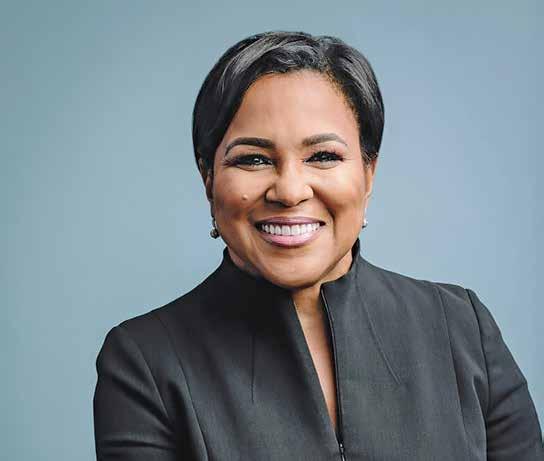
When Brewer accepted what was essentially a demotion by switching to Walmart from her position as group president at Kimberly-Clark, some questioned the move. However, she believes that she needed to start there in order to learn about retail. “I was in a learning mode, but I took a step back to get ahead. That’s when my career began to really explode,” she says.
After a series of top jobs at Sam’s Club and Starbucks, Brewer took the bold and courageous
choice to accept a top spot at a healthcare company, namely Walgreens Boots Alliance, in the middle of a pandemic, which she admits was “a pretty gutsy move”. However, she says that she’s been fortunate to accumulate so many different learning experiences over her career and that she’s pretty adamant about making sure that she’s clear about her role, her intent and how she brings together her toolbox.
“I think the one thread that I can pull through all of my roles and opportunities is my personal leadership, and that’s the way I show up first and foremost. Because most of the business problems
that I face in these leadership roles require character, guts, problem solving, and when I bring that basic toolkit to bear in these different roles, that has proven effective for me every time.”
She also admits that she’s very fastidious in her work, becoming a real student of the business whenever she takes on a new role. “I remember when I joined Walmart after being with KimberlyClark for such a long time, and being in consumer products, and going into retail. My job was based in Atlanta, Georgia, but I decided to move myself to Bentonville, Arkansas, and go on a learning journey
48 March | 2023
ROSALIND BREWER CEO OF WALGREENS BOOTS ALLIANCE
Entrepreneur
for 90 days. And I stayed in a little hotel and came into the home office there and really studied them during what I call the honeymoon period, and it was the best thing I could’ve ever done. I met people. I learned more about retail. And I really put myself in a learning position and not in a position initially of leadership, and I chose to learn and be an advocate and open-minded about the opportunities ahead of me,” explains Brewer.
As if being a Fortune 500 CEO didn’t place her in a sufficiently elite group, she’s also both female and black, which makes her a true rarity. But how does she balance the pressure, scrutiny and expectations that come from being practically the only person of her kind in such a position?
“Sometimes it’s a lonely position,” she admits, “because you don’t see yourself in different environments that you’re in, and then I look at myself personally and say, what can I do to change this, because it could be difficult at certain times? I think that the environment is opening up more to people recognising and appreciating the differences. Many times, I’m called upon and asked to give my opinion on diversity issues, and I will be honest with you: I am as frank as I possibly can be, because I do think I hold a unique position. When I get in these settings, I take advantage of the opportunity to learn and educate those around me, because I can feel it when they’re unfamiliar with me or my culture. I don’t hide my culture. I talk about it very openly. I feel like that is almost my second reason for being. Everybody has their purpose in how they get into a situation or an environment, but I take advantage of it and do everything I can to teach and expose people to my culture and who I am. I learned early in my career, I’d say maybe five to seven years out of college, that I really wanted to bring my whole self to work so I don’t cover up my culture at all, and I think that that’s helpful for me, because they know how to count on me and what the expectations are in terms of interacting with me.”
Throughout her career, she’s often found herself as the only woman, and even the only person of colour, in a room full of executives. But in this fast-changing world, she looks forward to the day when she’s no longer ‘the only’ in these rooms and environments, and she personally does a lot to try to make that happen. “The way I deal with this is really I’m no different than other individuals in the room, and I try to share that as well. My accomplishments come from hard work, from exposure. One of the things
I find myself doing, fortunately or unfortunately, is having to run a few people through my resume, because I think they look at my titles and wonder if I really do the work and how I got here. But I have some absolute real lived experiences.”
She explains in more depth: “When I was at Starbucks, I worked the drive-thru window. When I was at Walmart, I had three trucks at night so I could learn distribution logistics and warehousing at those companies. So, I’ve done the worst and the best of the jobs. Sometimes I have to remind people of that. And it gives me credibility that I’ve not been a token. I’ve not been granted these jobs. I’ve absolutely had to work very hard to get where I am.
“And so, I find myself doing that. It doesn’t bother me. I’m hopeful, I’m an optimist, and I hope that is not what the next person has to do, but for now I find myself having to really go on a deep dive in terms of my experience and do a lot of storytelling about why I believe in what I believe. I’m on the Business Roundtable and we’re getting into some really courageous conversations around the new infrastructure bill. I happen to have a lot of experience in the space of what it takes to move goods across the United States, and I’ve been fortunate enough to maybe share a little bit of that, and maybe people didn’t realise that I had a background in that as well, because you can’t be in retail and not understand supply chain and logistics.”
Speaking more broadly about workplace diversity, she explains that the corporate world is striving to advance diversity, equity and inclusion, through so-called DEI strategies, but that few people really understand the core of the issue as it stands in America. “When the George Floyd incident happened, I actually thought I knew it all and I had been doing a good job in DE&I. And I quickly realised that, even myself, who’s been a huge proponent of it, myself, who is a double minority, myself, a mother of a young black male, I thought I understood this, but I realised that I didn’t. I realised that I hadn’t been asking all the right questions; I hadn’t been focusing on the parts of our environment and our social

49 March | 2023
I met people. I learned more about retail. And I really put myself in a learning position and not in a position initially of leadership, and I chose to learn and be an advocate and open-minded about the opportunities ahead of me
environment that are very much broken. I think we have been focusing on the D of DE&I, and not on equity and inclusion. And I say that because what really happened with the George Floyd incident is that I don’t think people understood the race issues that are happening in our country. Those that are left out and those who don’t see a way out of their current situation. But we do see putting numbers in place and hiring numbers. But have we asked the questions: how can someone survive on minimum wage; and where is our country on great education and access to healthcare? It also made me think back. I took it personally, when all of that was happening. As you can imagine, I didn’t know George Floyd, and not many of us did, but I tried to put myself in the shoes of him and his family. And I think about the work that I was doing at Walmart. I was just so adamant about clearing the way and thinking about, “How can I close in on food deserts.” Right? If people have proper food and access to the best price, the best cost in food. So, I did everything I could do to put Walmart stores in the right zip codes. That was my focus… So, if you put the food right near them, and there’s still not proper nutrition and proper healthcare in those places, what’s causing them to not be able to thrive and rise above the minimum wage job, and go to the next level, and the next level? … I was listening and I wasn’t acting. And I wasn’t drilling down enough. And I think that’s the next level of leadership: that we’re going to have to get pretty gritty about listening and acting and making people feel included in the environments that we create, as leaders.”

Her first takeaway, thus, is that business leaders should leave their phones in their pockets. And even when there is diverse representation, corporate cultures can produce a kind of group-think and group-speak. This is why Rosalind, who goes by the nickname Roz, has been thinking less about diversity of ethnicity and culture and more about the kind of diversity of viewpoints that trace varied experiences and backgrounds.
“One of the things that I think about when I’m thinking about diversity is diversity of thought. Because we can also realise that there are individuals who may not be of diverse culture, race, or gender themselves, but where is their mindset? How do they think about different cultures and different environments? One of the things that I began to do in my career is to put agile teams together. And what I mean by that is, a lot of times, you have your finance team working in their silo. You’ll have the tech
team working in their silo. But what I really think works is when we create these agile teams and put them against the biggest problems to solve. That’s one of the things I’m doing right now at Walgreens Boots Alliance: make sure that this organisation understands the biggest problems that we’re going to solve? It’s not a question of whether we have enough technology, but whether the technology we have is fulfilling the need for efficiencies in the organisation. Is it creating the right tools for our team members at stores and for our customers?”
As Roz concludes, “you can have the best strategy in the world, but if your team operates
in a silo-driven environment, you’re not going to get the results that you expect. For instance, right now we’re trying to create a tech-enabled healthcare company. I have the same message for the entire group. And the biggest problem to solve is, how do we become the best performing stock in the Dow? And so, when you put that team together, you are forcing finance and technology and operations and manufacturing all to be in the same room, in the same discussion, against the biggest problem to solve. And it’s not finance solving a finance problem. What that actually does: it gets the diversity of thought to happen. And then you have different people sitting around the table. And in some cases, one of the outcomes that I’ve seen is that, in certain functions, we have heavier opportunity for diversity than we do in others. I would love to see more diversity in technology. It’s coming, but right now I have a lot of diversity in finance. So, I get the opportunity to put a diverse financial team with a growing diverse tech team in the room. Diversity of thought is happening around the problem to solve, and then the cultures are coming together. And, hopefully, we’ll move all of those opportunities up. But it’s about creating these agile teams and putting them against the unique problems to solve. And forcing them to relate to each other and think about how to solve the issue at hand.”
50 March | 2023
Entrepreneur
I’ve done the worst and the best of the jobs. Sometimes I have to remind people of that. And it gives me credibility that I’ve not been a token. I’ve not been granted these jobs. I’ve absolutely had to work very hard to get where I am
DR STEVAN JOKIĆ, PROFESSOR – SCIENTIFIC ADVISOR

Asociety’s attitude towards its heritage is most evident through its attitude towards the level of scientific literacy of every member of the young generation and the assistance provided to teachers and schools in achieving this goal. Because that’s the only way the civilisation of the 21st century can competently confront the following challenges:
• The necessity for each individual’s conduct to be harmonised with the concept of sustainable development;
• Existing development in which nature is to the fore and everything else is subservient, with which activities characteristic of the industrial revolution are reduced drastically;
• New technologies that are characterised by multi-disciplinarity, interdisciplinarity and trans-disciplinarity, coupled with a reliance on nanotech, cognitive technologies, information science and biotechnology;
• The teaching approach introduced by the ancient Greeks, which experienced significant transformation during the Renaissance, with the advent of the printing press, when Montaigne himself said that he would rather have a guide with a well-made head than a well-filled one, and now it is set to undergo even more significant changes with the advent of digitalisation.
Challenges Of Contemporary Education And How To Overcome Them
That’s why every educator, tutor or subject teacher, of any educational institution at any level of the education system, is confronted by the following three questions:
Who are we addressing today? Young people whose education is provided through the use of book culture and screen culture; users of the results of the first quantum technological revolution, but contemporaries of current trends of the second quantum technological revolution, as well as a cultural, cognitive and psychological shift; youngsters who look at a picture for seven seconds and take 15 seconds to find an answer, who spend more than five hours in front of some kind of screen and will, in the next few decades, have a vocabulary that’s about 30,000 new words richer... Nevertheless, the data shows that, on the basis of a survey of approximately 900,000 adolescents in France (data from the magazine CLEFS NO64, 2014, p.30), upon completing primary and secondary school, around 25% of pupils are unprepared for the challenges they face today! I don’t have the data for Serbia!
What should we offer them? Perhaps curricula that, apart from taking a disciplinary approach, will also use an interdisciplinary one, with complex topics from everyday life. The possibility of providing greater freedom for teachers and the more active participation of pupils in the teaching process, with the use of non-formal and informal education, and more formative evaluation.
How can that be done? Try to apply teaching approaches based on research, projects, STEM and STEAM ((Science, Technology), Engineering/Art, Maths). These teaching
approaches are coherent and attractive to all learners, because they respect not only their social, cultural and geographical differences, but also the specificities that are imposed on them by every school-centred situation.
Education is a discipline of intervention, because the teacher has to react in an appropriate way at a given moment. That’s why they need resources, first and foremost! Under the scope of the Hands in the Dough (Ruka u testu / Hands-on) project, over the course of 20-odd years, teachers had at their disposal 20 books (mostly translated from French and English), 15 books in digital format available to be downloaded for free, around a dozen types of inexpensive experimental boxes that can be made in every school, the YouTube channel Informatika i nauka za sve [Informatics & Science for Everyone] (40,000 views), the website Ruka u testu [Hand in the dough / Hands-on] (containing more than 3,000 pages), around a dozen exhibition-workshops, multiple seminars, lectures etc. These resources were created within the framework of: the contract between the French Academy of Sciences, the Serbian Academy of Sciences and Arts - SANU and the University of Belgrade; international cooperation under the scope of EU projects SUSTAIN and FIBONACCI; cooperation among the collaborators in the Ruka u testu project and foundation La main à la pâte, the global network of science academies InterAcademy Partnership - IAP and the French Institute in Belgrade, with which we are also implementing this exhibition-workshop “Science and informatics for every child”.
Dr Stevan Jokić, professor - scientific advisor, served as a gymnasium-high school professor and teacher of a school for economics students; held the posts of sub-dean and dean of the University of Kragujevac Faculty of Natural Sciences and Mathematics, and scientific director at the Vinča Institute of Nuclear Sciences. He is a recipient of the international PurKwa award of the French Academy of Sciences for his contributions to the scientific literacy of the children of the planet, while he has also been decorated three times by France...
51 March | 2023
PROFILE
Dog Breeds In Famous Paintings

52 March | 2023
Art
DIEGO VÉLAZQUEZ, LAS MENINAS, 1656, MUSEO NACIONAL DEL PRADO, MADRID, SPAIN
Additionally, we have gathered some works that carry with them technical and historical curiosities that we sought to demonstrate, such as the importance of the dog in the scene. Here are four paintings with popular breeds in the old days:
1. BRUSSELS GRIFFON BY JAN VAN EYCK
This is considered Jan van Eyck’s masterpiece due to the very innovative techniques he used at the time. Particularly, besides demonstrating a great work of perspective and accentuating secondary planes, the work is characterized
by having several elements enriched in detail. As a result, these elements collaborate with the narrative of the scene which stimulated several theories about its representation.
The use of bright colors in the painting also accentuates the social aspect. The depiction of textures is so realistic we can practically feel the fabrics present in the image, such as the couple’s clothes and the hair of the dog at their feet.
THE WARM WELCOME OF A DOG
This particular dog would be an early form of the Brussels Griffon (or Griffon Bruxellois)
breed, a dog typically bred for hunting rats. Nowadays, we know this breed in a different way from what we see in this picture. Even so, due to the excellence achieved by Van Eyck, we can practically feel the animal alive in the painting.
The dog in this scene opens the door of the house of this newly married couple to us. Consequently, the dog demonstrates, as well as the objects of the house, comfort and

tenderness. The dog also brings life to the picture and demonstrates fidelity.
Another interesting element that contributes to different interpretations is the Latin writing around the mirror. It says that the painter was present in this engagement scene. This mirror holds a surprise though, we are able to see the painter’s reflection as well as
53 March | 2023
When we see a dog in a painting, we always try to guess which breed it is. Motivated by this curiosity we have selected some works that show representations of different breeds of dogs in famous paintings.
If we go back to the couple of The Arnolfini Portrait by Jan van Eyck, we will see by how many different means different artists can obtain the desired effects. Van Eyck endeavored to reproduce each one for the curly little animal; Velázquez, two hundred years later only try to capture his more general impression
TRADITIONAL SPANISH MASTIFF
another witness in the mirror. Practically a 15th-century cinematographer!
Jan van Eyck holds a crucial role in the history of art because his works marked the end of the medieval era. This is due to the development of techniques and accuracy in realistic painting, but he is also called an inventor of oil painting.

2. SPANISH MASTIFF BY DIEGO VELÁZQUEZ
In 1656, reaching the maturity of his work, Diego Velázquez made his masterpiece, Las Meninas. He was able to capture the composition in a harmonic way. Therefore the effect of his brushstrokes creates the illusion of realism and lifelike representation of his subjects, even before photography.
This picture has eleven characters, among them the painter himself. The scene captivates us due to its size (320.5 cm x 281.5 cm), the perspective, and the numerous actions occurring. There are several narratives that are taking place within this painting.
In its foreground, we have Infanta Margaret Theresa, the firstborn of kings, and the court beside her. Her position leads us to believe that Velazquez is painting a portrait of the young noblewoman.
However, looking deeper into the composition and other details are apparent. In the background there is a mirror next to Velázquez, reflecting two heads. Through it, we discover that the painter is producing a portrait of the king and queen.
THE DOG AS PROTECTOR AND GUARDIAN
We deduce then, that everyone we see is there because of the king and queen’s order,
54 March | 2023
Art
JAN VAN EYCK, THE ARNOLFINI PORTRAIT, 1434, NATIONAL GALLERY, LONDON, UK
maybe even to entertain them from the tiresome task of posing for the portrait. The presence of the two dwarfs, who are around the dog, affirms this.
This dog is a Spanish Mastiff, a symbol of loyalty and protection. Native to Spain, it is able to protect everything and anyone in its charge. This breed was used for shepherding cattle too.

REPRESENTATION AND CLAIM
The artist exuberantly records a moment of daily life in court, while also having the audacity to portray himself on a court canvas. This suggests to us that the painter is claiming the nobility of his profession and his art. This is because, at this time in Spain, painting was still considered an activity subject to taxes like any other artisan.
Las Meninas captures in a unique way, not only the scene but the spirit of an epoch and all the expressiveness of its creator. The effect of his work allows the imagination to suggest and complete his work, a technique that will be contemplated by the impressionists in Paris in the 19th century.
of King Ahasuerus, planned to annihilate the Jews within the Persian Empire. She then prepared a banquet to expose Haman to the king and came out triumphant. This picture captures the exact moment of accusation.
In the Rococo period, it was common to record mythological and biblical stories. However, we can observe different characteristics in the Baroque style in the Netherlands from the countries to the south. As a result, their paintings are marked above all by humorous scenes and festivities. Besides, aspects familiar to everyday life
and customs in Holland enriched the details of this painting. These include the composition of the still life, china, and furniture.
THE DOG IN THE SCENE
In the lower right corner, at Esther’s feet, we find the portrait of a dog in the Spaniel family. It perhaps has its origin in the Iberian Peninsula. This breed is also very popular among royalty today. Initially, its function was as a hunting companion, to catch and retrieve the birds that their owners hunted.
4. POITOU OR SAINTONGE BY
COURBET
If Vélazquez, in portraying himself in a royal picture, followed all the protocols of respect for those who subsidized his craft, Gustav Courbet‘s daring goes further in The Meeting or Bonjour Monsieur Courbet, almost 200 years later.
The painter was the main icon of Realism in 1855. He opened a solo exhibition in Paris called: Le Réalisme, G. Courbet. The painter proposed a realism that was different from what academic art was accustomed to. It was guided by the search for truth in representation and not beauty alone.
Specifically, with regard to this painting, it did not have intricate arrangements, but rather simple lines and colors as well as a routine situation that does not portray anything sophisticated.
Here, what we see is nothing more than the reality of the situation itself; a painter walking with all his work tools meeting a bourgeois and his companions, a countryman (probably his servant, due to his position and the carriage standing in the background with four horses) and his dog.
THE DOG AS AN IMPORTANT ELEMENT FOR THE SCENE
This bourgeois was a friend and sponsor of Courbet’s works, Alfred Bruyas. Being represented with his dog, a Poitou (also Poitevin hound) or Saintonge (also Gascon Saintongeois), reinforces his class. The dog is brilliantly and luminously rendered, showing us that it is a dog with a pedigree. Besides being a hunting dog, the animal is also a symbol of loyalty and protection.
55 March | 2023
People usually associate the Dutch art of the 17th century with the atmosphere of revelry and well-being typical of Jean Steen’s paintings.
Ernst Gombrich, The Story of Art, 2013 edition
BRUSSELS GRIFFON
If we pay a little more attention to the picture, we have very interesting observations beyond its realistic “simplicity”. We see that the painter is in the foreground of the painting. The sun shines on him since he is the only one who is not under the shade of the tree. This was an innovative detail in painting the behavior of light outside.
The two men are in the second plane, under the shade of the tree. In the third plane, the shade covers only a part of the dog’s body. They have all removed their hats in the form of a greeting.

The servant and boss are very well dressed. The boss is completely upright while the servant has his head down to show subordination. Courbet, despite his simple

56 March | 2023
JAN STEEN, WRATH OF AHASUERUS, 1673, BARBER INSTITUTE OF FINE ARTS, UNIVERSITY OF BIRMINGHAM, BIRMINGHAM, UK
KING CHARLES SPANIELS, PHOTOGRAPHED IN 1915
Art
attire, holds a staff, affirming his position in this encounter.
ART AND RESISTANCE
When we find the three characters so disposed, we realize that the painter is legitimizing his own craft and his position – like Vélazquez – that he would not be submissive to the tastes of the bourgeoisie to exercise his craft. The dog by directing his gaze back to him legitimizes the honesty of his work. These details show the boldness of Coubert behind his realism. The impression he conveys in his paintings is, above all, a protest to the customs of his time and to shock the bourgeois. He would not give up his beliefs so that the value of his artistic sincerity would be accepted. dailyartmagazine.com


57 March | 2023 By author
GUSTAVE COURBET, THE MEETING OR BONJOUR MONSIEUR COURBET, 1854, MUSÉE FABRE, MONTPELLIER, FRANCE
GASCON SAINTONGEOIS
THE WILL OF WAR
COMPELLED ME TO LEAVE SARAJEVO
Here we bring you the personal account of the exciting life’s journey of one of the top contemporary writers from the area of the former Yugoslavia. What was he made beholden to by his ancestors, or by his parents and extended family? How did the war split his life into two completely different parts? Why do he and his wife Ana Bogišić live in a village near Zagreb, and why does he visit Belgrade more often than to his native Sarajevo? How does he view Ivo Andrić and what are the common characteristics of Andrić’s world and his?
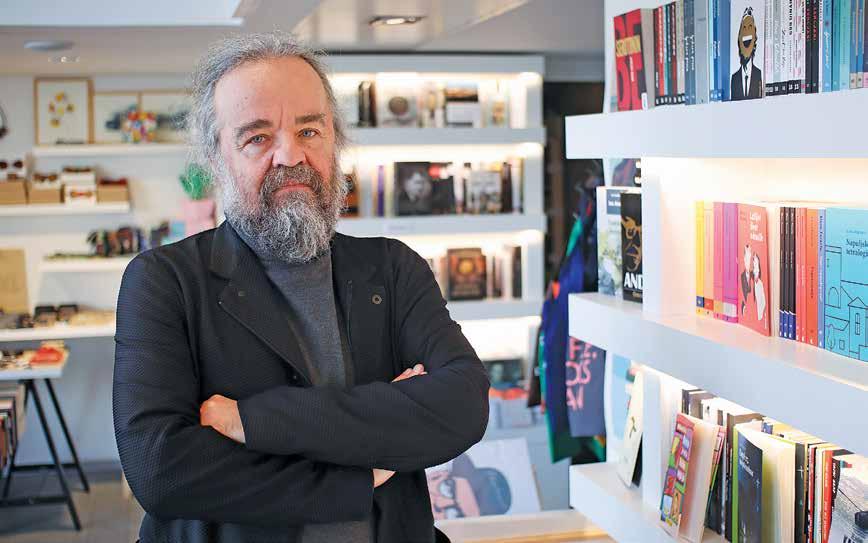
58 March | 2023
My life Miljenko Jergović, writer
He attended the same Sarajevo gymasium high school as two of the most famous natives of Bosnia: revolutionary member of the Young Bosnia movement Gavrilo Princip and Nobel-prize winning author Ivo Andrić. He went on to graduate in philosophy and sociology, prior to which he’d already started writing. Bornin 1966, Miljenko Jergović was a Yugoslav before the wars of the ’90s, while today he is known as a Bosnia-Herzegovinian and Croatian writer. An even more amusing illustration of the times that we lived through is the fact that his wife enrolled to study Yugoslav literature in Zagreb and Yugoslavia disintegrated while she was still studying, which meant that she ended up graduating in Croatian literature. An editor and proofreader by profession, Ana is the only proofreader and editor of Miljenko’s books.
“That’s a very important and fundamentally delicate matter. It was extremely difficult before her, just as it would be very difficult with someone else today, because I would have to explain too many things to those people. I reached my wits’ end explaining to people that the language in which I write does not appear in Croatian dictionaries. That’s my language; I have the right to my own language. Ana is my protector against the terror of standardised dictionaries and standardised grammar.”
He was just over 20 when he wrote the poetry collection The Warsaw Observatory [Opservatorija Varšava], for which he received the Ivan Goran Kovačić Award, Yugoslavia’s top award for poetry. He has since written around 50 books in various genres, which have been translated into 20-odd languages. These works are partly fiction and partly autobiographical, and for 1994’s Sarajevo Marlboro collection of stories he received the Erich Maria Remarque Peace Prize. Representing Jergović’s personal testimony to life in wartorn Bosnia-Herzegovina, it is still discussed to this day. Thanks to the persuasive argument of his translator to Polish, but also his own desire to see how Sarajevo Marlboro, which he wrote when he was 27, would look when written by a man of 54, he penned the book Three for Kartal [Trojica za Kartal], with the subtitle Sarajevo Marlboro Remastered. Inspired by the stories from the book that made
him famous, Three for Kartal was published by Booka in Belgrade last year.
He lived in his native Sarajevo until 1993, when he moved to Zagreb. Nowadays he spends his winters in the Croatian capital, spending the rest of the year living in the Turopolje region, around 20 kilometres from Zagreb. Together with his wife Ana, he visits Belgrade relatively regularly to relax and see friends. This time around, when we used the opportunity to record this interview for CorD Magazine, he had come to the Serbian capital to attend the premiere of The Idiot, under the production of director Ivica Buljan, at the Belgrade Drama Theatre.

There are numerous books in which Jergović discusses his family. His long-divorced parents, but also his close relatives on both his father’s and mother’s sides. And when asked how he
By Radmila Stanković
would describe the upbringing he received at home, or what is referred to as home education, this writer answers:
“I’m actually the child of my Nono and Nona, or my maternal grandparents. So, I have no experience of home education from my parents. When I recall them today, it is both completely unimaginable and terrifying that they could have brought me up, because who knows what would have come of that and how that would have looked. I am really a child of my previous ancestors, or my grandparents. In that sense, the world of my upbringing and maturing process also somewhat reflects a kind of previous civic world. I suppose I was brought up in the way kids had been raised in the 1930s. In a way I thus belong to the generation of Bora Ćosić. [writer Bora Ćosić turns 91 on 5th April this year]. And I don’t say this by accident. That’s because when I read his book My Family’s Role in the World Revolution, I somehow actually see the world of my own home in the most intimate possible sense. And that isn’t really normal, given that he was raised 35 years before me.”
Miljenko’s grandfather Nono was actually called Franjo Rejc. He lived as a Bosnian, but had Slovenian origins and self-identified as an ardent Slovene. Grandma Nona, Olga Rejc, was the daughter of an ethnic German from
59 March | 2023
I reached my wits’ end explaining to people that the language in which I write does not appear in Croatian dictionaries. That’s my language
IN ZAGREB WITH WRITER SVJATLANA ALEKSIJEVIČ, WINNER OF THE 2015 NOBEL PRIZE FOR LITERATURE
My life Miljenko Jergović, writer
the Banat region. And everything else in her family was equally complicated and mixed, such that it could be said that she was a typical child of the Austro-Hungarian monarchy.
“From the upbringing I received from them, I was left with a kind of detachment, withdrawn nature and non-aggressiveness. And some learned sense that this is not my city and this is not my world, and these aren’t my people. That’s something I’ve carried with me from an early age, and which has often caused me all sorts of social problems, but, unfortunately, that’s ultimately exactly how it turned out. In the end, both my life and my world turned out just as Nono and Nona told me they would.”
Responding to the observation that his literary work, particularly the vivisection of his family relationships, is capable of irritating the public, he offers a simple explanation:
“Literature is actually writing about something that is either impossible to write about or shouldn’t be written about. That’s because it’s actually meaningless to write about something that’s easy to write about, can be written about and everyone recommends as a topic to write about. One writes about what should not be written about or discussed.”
It was almost thirteen years ago that he published the novel The Father, which is actually a story about his own father that received very fierce public reactions.

“That had a slightly scandalous effect, but to me there was nothing scandalous about it. I didn’t intend to cause any scandals; I had no intention of provoking anyone. That was a story about my father, about my life, about the times I lived through. In an attempt to hide it from people who might take it the wrong way, I published the book in Belgrade [published by Rende]. That was a targeted move, as I counted on it going unnoticed among some malicious and ill-intentioned people in Zagreb. However, that just made it even worse.”
Miljenko’s father, Dobro, was a respected, highly-rated and beloved doctor in Sarajevo, and in his son’s eyes, he was “a great doctor, and that fact made up for everything that he was incapable of being in life. For him, medicine and his mission compensated fully for everything else. And that’s generally not an uncommon human trait.”
His mother, Javorka, was the most beloved character at the Academy of Performing Arts in Sarajevo, where she worked as head of the accounting department.
“Unlike my father, she was extremely sociable, and all beyond the confines of the home. It was decidedly glooming in the house, which was a combination of being unfulfilled in life and emotionally, due to the huge burden of her poor relationship with her parents. She lived
as though life had betrayed all her expectations and she was annoyed with her own life and all those who she felt stood in her way in that life. She was essentially an extremely problematic mother. There were moments and periods in her life when she didn’t shy away from showing me that I’d ruined her life’s journey in a certain way.”
As an educated and intelligent woman, Miljenko’s mother understood the way literature functions perfectly. She also understood her own role as a character in literature: “It is interesting how much could be written about her without her taking it personally.”
Jergović’s many stories, novels, essays and columns have been subjected to numerous comments, from shows of admiration to the casting of aspersions. His spiritual path, often teetering on the brink of the abyss, has prompted emotionally intoned judgements among readers and critics alike, but he didn’t reflect on them too much. Is that an integral part of his personality, or did he try a little harder to publicly communicate things that most would prefer not to mention?
60 March | 2023
it’s actually meaningless to write about something that’s easy to write about, can be written about and everyone recommends as a topic to write about. One writes about what should not be written about or discussed
WITH DRAGAN VELIKIĆ & BORA ĆOSIĆ IN FRANKFURT
“I think that’s a combination; that it relates very strongly to the certain kind of ‘outsiderness’ from which I emerged. Outsider in the broadest possible sense. For instance, you live in a multi-ethnic community like Sarajevo, while at the same time your origins are extremely complicated compared to that multi-ethnic community, and even extremely problematic in a political identity, ideological sense. And that was particularly so in Sarajevo, which was a pretty dark corner of Yugoslavia at that time, because various services were very fond of using such things to blackmail people. And I was, in a way, a child of enemies of the people. My parents weren’t enemies of the people, but rather loyal Party members, but my paternal grandmother had been a member of the fascist Ustasha Youth, and my mother’s much older brother had served as a German soldier in World War II. That knowledge had been present in the house and discourse with the external world was adjusted according to it, firstly towards the first neighbourhood, and then towards everything. There was fear over what someone would say, who would report
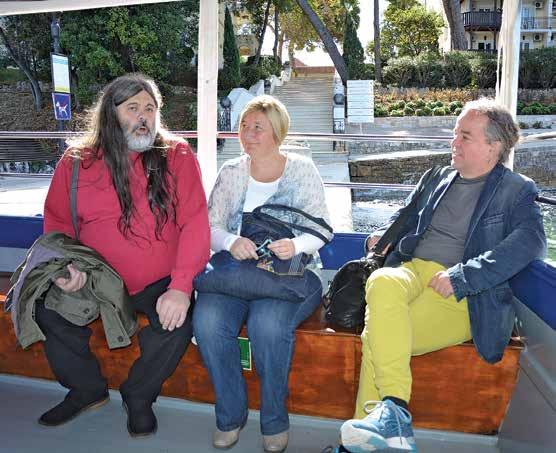
whom, what that information could mean somewhere.”
Miljenko developed an aware of this early on. He belonged to the ‘lucky generation’ of children who were left home alone by their parents and grandparents.
“Nona would go to the market, I would somehow get out of having to go with her, and as soon as she’s was out of the door, I would start rummaging through their drawers in search of documents, in search of secrets. I started doing that when I was eight or nine years old. Before the age of ten, I’d discovered the dark secret of my elder uncle. It is today impossible to explain what a shocking thing that was for me. It’s like finding out that your uncle was a salamander, that he didn’t belong to the human race. I think that was the moment that marked the start of my great interest in such things.
“As for my paternal grandmother, she has been the ultimate villain since I was born. A very dark woman who I quickly learnt was actually an Ustasha woman. That was somehow perfectly logical to me, given all the other negatives about her. That remained a reflex of mine
as an adult. For example, today, as an older man, I often wonder whether my deep-rooted intolerance of the Ustasha and domestic traitors contains something completely personal that’s much more intimate than nationalism and historical facts.”
Survivors always have a right. And that marks the emergence of deep injustice, which is blind to its victims. Since the war, Sarajevo has been a city where the survivors often suffered more than those who took the bullets. While everything resembled an idyllic place unstained by blood, Miljenko grew up in Mejtaška Mahala, or the Mejtaš Quarter, with this toponym also finding its place in his literature.
“Mejtaš is a small crossroads in Sarajevo that’s slightly elevated above the city. A steep street leads up t it, and extending from there is a series of steep and very steep streets. These are some of the sunny slopes of the city. There was a Muslim cemetery and mosque there until about eighty years ago, when they disappeared. Those graveside monuments, or tombstones, were carried off somewhere, the plateau was asphalted and covered by streets. The mosque burned down during the 1920s, with a grocery shop built on the site later, after World War II.
“The word mejtaš itself refers to the stone on which the deceased is placed before the funeral, or Islamic burial. It’s a kind of stone catafalque. Mejt means corpse and taš means stone. The neighbourhood itself consists of a square and a dozen surrounding streets and alleys. This was
61 March | 2023
I was, in a way, a child of enemies of the people. My parents weren’t enemies of the people, but rather loyal Party members, but my paternal grandmother had been a member of the fascist Ustasha Youth, and my mother’s much older brother had served as a German soldier in World War II
WITH TEOFIL PANČIĆ AND OLJA
the place where I grew up in Sarajevo. At the same time, I also had the privilege, or misfortune, of having two parallel upbringings. I grew up as a little Bosnian and Sarajevo native in Mejtaš, and as a Dalmatian at Nono and Nona’s place in Drvenik, where I’d spent eight months of each year until starting school. So, as a kid I changed identities on a seasonal basis, which seems bizarre, but it was a huge difference. I was both identities, but actually neither.”
What is certain is that, in Sarajevo, he lived and grew up in a passionately traditionalist urban environment. This awakened in him a lifelong preference for those parts of cities that preserve something a little older, from a little earlier. That’s also why, in Belgrade, he and Ana have been staying with the same landlord for about fifteen years, in the same flat, in the same place on the corner of the former Đura Đakovića and Budimska streets, where it still smells like old Dorćol.
During the siege of Sarajevo, Miljenko spent a year and a half in his hometown, before abandoning it.

“That experience split my life in half, forming two separate and completely different lives. I wouldn’t say that I’ve changed, but I would have been someone completely different if it hadn’t been for that war. I would be writing something else, thinking about something else, living a completely different life. And I would live somewhere else. However, I didn’t leave of my own free will, but rather of the will of the
war. And when you don’t leave of your own free will, you leave in a different way and the whole thing is experienced and lived differently. After such a departure, a person never feels the way they did before. One feels like someone who has been banished in one way or another; like someone who is a migrant, to use that modern word. In the meantime, between those two lives, those pre- and post-war lives, there is an entire decade that doesn’t belong to either, but rather marks a decade of waiting for things to be normal again.
“That’s because it takes a lot for a person to understand one terribly simple and selfexplanatory thing. And that is that things will never be normal again. I realised that around the year 2000 ago and developed the insight that I needed to live a different life.”
Prior to embarking on that quest for a new life, he was hit by the feeling of the impossibility of returning to Sarajevo. He hadn’t been to the city for almost five years, which was a longer period than the entire duration of the war. It is also a much longer period than when
62 March | 2023
Jergović, writer
I often wonder whether my deep-rooted intolerance of the Ustasha and domestic traitors contains something completely personal that’s much more intimate than nationalism and historical facts
My life Miljenko
WITH BOGDAN TANJEVIĆ
he didn’t come to Sarajevo during the ‘90s.
“There are naturally reasons why I would go to Sarajevo, but there are obviously much stronger reasons why I would not go to Sarajevo. And those reasons are of a very private and very intimate nature. A man simply doesn’t have to do certain things; he doesn’t have to participate in certain things, and he doesn’t have to attempt to turn back time by force and contrive his spaces and his cities where they no longer exist.”
Miljenko and Ana have long been living their second life. Their winter address has long been in Zagreb, while from April to October they reside in the countryside of Turopolje.
“At some point while living in our flat on the 16th floor of a Zagreb high-rise, around 15 years ago, we began fantasising about life in the countryside. I then realised that the last moment had arrived, because that could become too expensive in the next episode. Then Zagreb natives would also realise what Westerners have also been discovering: that it is better to live 20-odd kilometres from the city than in the city, and our fantasy would perish. Prices would then skyrocket and we’d have no chance. We then very ambitiously started searching for a house on the outskirts of the city until we found one. Partly with credit and partly with cash, we bought the weekend cottage of a socialist director 20 kilometres from Zagreb, from a gentleman who actually was a socialist director. We started living there and it was something sensational. That’s an excellent opportunity for a person to try to move out of their default context.”
There are few writers who write in the language of Ivo Andrić, and whose name is mentioned alongside Andrić’s as often as Miljenko’s. It is thus somehow normal to conclude this interview by asking him what Andrić means to him, apart from the fact, mentioned at the beginning of this article, that they attended the same Sarajevo secondary school.
“Ivo Andrić is our language’s most accomplished writer. And the greatest writer of our languages, whatever anyone might think of that. And the world of Ivo Andrić, his geographical world, the world of his cities, the world of his different religious-tribal

and religious-national identities, actually aligns very precisely with my world. This isn’t something that’s crucial for literature, nor for the reader, but it is something that’s actually a big deal when it happens, a big deal in the most intimate sense. That gymnasium high school that Gavrilo Princip, Ivo Andrić and I attended, was solidly built, never subjected to interior renovation, and those same stairs and handrails that we all walked on have remained. We were schoolmates with a difference of over 60 years.
“Andrić is the writer of my world, and Andrić is the writer who wrote my world.”
63 March | 2023
I would have been someone completely different if it hadn’t been for that war. I would be writing something else, thinking about something else, living a completely different life. And I would live somewhere else
WITH GRANDMA, NONA, OLGA REJC
CHILL OUT
Al-generated Portraits Attract Attention

An Instagram photographer who raked in thousands of followers thanks to his stunning portraits has admitted that they are fake. The apparent ‘photos’ were created by Midjourney - a software that uses artificial intelligence (AI) to generate images - and touched up on Photoshop. Jos Avery, from the US, even gave each figure a name, geotag and moving story that he added in the image captions, but these are marked as fictional. Up until recently, Mr Avery had either been purposefully vague to his followers about how he acquired his images or outright told them they were real photographs. He even went as far as fabricating the type of camera and lens he used to take them.
Freediving Couple Break Guinness World Record For The Longest Underwater Kiss

A Guinness World Record for the most extended kiss underwater has been broken by a freediving couple who wanted to ‘inspire others to fall in love’ with the ocean. The four minutes and six seconds smooch between 40-year-old Beth Neale from South Africa and her 33-year-old fiance Miles Cloutier from Canada was achieved in an infinity pool at the Lux South Ari Atoll resort in the Maldives earlier this month. The previous record of three minutes 24 seconds, held by Michele Fucarino and Elisa Lazzaina, was broken after 13 years.
Starbucks Launches Olive Oil Coffee In Italy
The world’s largest coffee chain, Starbucks, is launching a line of olive oil-infused drinks in Italy. Chief executive Howard Schultz says olive oil’s “unexpected, velvety, buttery flavour... enhanced the coffee and lingers beautifully on the palate.” Starbucks is among the major US businesses that have faced obstacles as they tried to expand into the Italian food and drinks market. Italy’s coffee scene is famous for its independent and often family-run cafes.

64 March | 2023
Space Tourism Firm To Offer Flights To Stratosphere
A space tourism firm has announced that it will offer helium balloon trips to the stratosphere later this year. Japanese startup Iwaya Giken promises passengers a view of the curvature of the Earth from an altitude of 15 miles (25 km). Despite the hefty price tag of almost 170,000 Euros, the company’s CEO, Keisuke Iwaya, hopes that commercialising space travel will eventually help to bring the cost down. ‘The idea is to make space tourism for everyone,’ he said yesterday at a press conference in Tokyo. The vessel comprises of an airtight plastic cabin, about 4.9 feet (1.5 m) wide, attached to a 144-foot-wide (44 m) helium balloon.
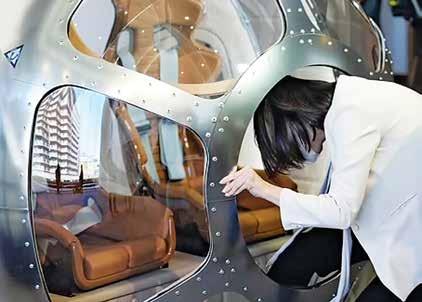
Queen Consort Speaks Out Against Censorship Of Roald Dahl Books
The Queen Consort has waded into the row over the decision to rewrite some of Roald Dahl’s most famous children’s classics, urging authors to resist curbs on their ‘freedom of expression’. Speaking at a reception to mark the second anniversary of her popular online book club, Camilla said to assembled writers: ‘Please remain true to your calling, unimpeded by those who may wish to curb the freedom of your expression or impose limits on your imagination.” The row over revisionism has seen words like ‘fat’ removed - August Gloop can only now be referred to as ‘enormous’ - and Charlie and The Chocolate Factory’s Oompa Loompas being made gender neutral. Mrs Twit’s ‘fearful ugliness’ has been chopped to ‘ugliness’, and Mrs Hoppy in Esio Trot is not an ‘attractive middle-aged lady’ but a ‘kind middle-aged lady’.
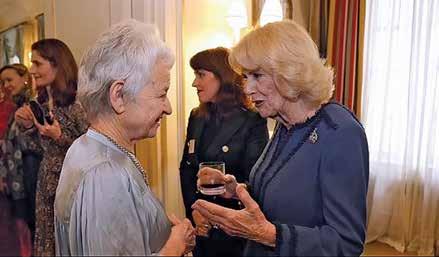
Spotify Launches An AI DJ
The tech giant has launched its most personalised service in the form of an AI DJ. The DJ, dubbed X, features a ‘stunningly realistic voice’ and creates personalised mixes based on your music taste. ‘The DJ is a personalised AI guide that knows you and your music taste so well that it can choose what to play for you,’ Spotify explains. ‘This feature, first rolling out in beta, will deliver a curated lineup of music alongside commentary around the tracks and artists we think you’ll like in a stunningly realistic voice.’
The AI DJ is Spotify’s latest personalised offering, following the success of other features such as Discover Weekly and Wrapped.

65 March | 2023
TECH BEST AND MOST INNOVATIVE
NEW GADGETS AND DEVICES IN 2023
New gadgets, gizmos, and devices are constantly hitting the market, all promising to make our lives easier, more fun, or simply more hassle-free
GE Profile Smart Mixer

A high-tech kitchen helper, the GE Smart Mixer automatically weighs out the correct quantities of ingredients thanks to its inbuilt scale and talks users through recipes with step-by-step instructions. Sensors detect the texture and consistency of mixtures to enable the device to offer real-time suggestions while preparing snacks and meals. It also integrates with Google and Amazon Echo devices meaning it can be fully voice-controlled.
Ring Always Home Drone Camera
The latest addition to Ring’s suite of smart home security devices is an autonomous drone designed to patrol your property, enabling you to have eyes on places that static security cameras just won’t reach. As well as potentially alerting you to intruders, it could also come in handy for forgetful homeowners wanting to check that they didn’t leave the kitchen stove on or the windows open.

Timekettle Translation Earbuds
Timekettle has created what it says is the most powerful and sophisticated range of real-time, AI-powered translation earbuds in the world. Coming in a range of models aimed at professional, casual, and travel users, the WT2, M3, and WT2 Plus earbuds enable translation in a range of situations, from business meetings, short conversations while traveling, and phone calls.

Withings U-Scan

Did you know your urine contains more than 3,000 metabolites, which can be used to create an in-depth snapshot of our health, providing early warnings of a number of medical conditions as well as recommendations for diet and exercise? Smart device manufacturer Withings does, which is why it has created the U-Scan.

66 March | 2023
Meta Quest 3 and Meta Quest Pro
Meta scored a hit with its Quest 2 virtual reality (VR) headset, enabling it to introduce almost 15 million of us to its version of the metaverse. Of course, we’ve always known that this was only the beginning, and soon we will see the introduction of two new headsets that will enable even more immersive and interactive virtual experiences.

Apple Watch Ultra

Apple has been making consumer smart watches for a few years now, but late 2022 saw the introduction of a new model designed to compete with the high-end sports and luxury models recently introduced by competitors such as Garmin and Tag Heuer. The Apple Watch Ultra is encased in a titanium shell, making it more hard-wearing and durable than any previous Apple Watch.
Lots of us have discovered the fun as well as the opportunities to capture stunning photography and video footage offered by drones in recent years. The latest offering from the leaders in the field of consumer drone technology, DJI, is aimed at those who want to experience the thrills of first-person flying. The DJI Avata is designed to provide a fully immersive flying experience via a wide field-of-view headset that truly imparts the feeling of high-speed flight from the airborne drone to the user on the ground.

GoCycle G4

The G4 from GoCycle is among the first of a new wave of fully foldable electric bikes that can be converted into a more manageable form that’s easy to take onto public transport or even to pack away in a car for vacations or longer journeys.

March | 2023 67
DJI Avata
Source: Forbes
51st FEST
until 5 March
This year’s edition of FEST will take place in the context of French film! About twenty French films and co-productions will be shown to the Belgrade audience, starting with the film “My Crime” by François Ozon, which will open the festival just a month after its premiere in France. During the ten days of the festival, the audience will be able to enjoy the latest films of Mia Hansen Love, Louis Garrel, Claire Dany, Rebecca Zlotovsky, Valerie Bruni Tedeschi, Leonore Seray, Rashid Bouchareb, Nicolas Bedos, Michael Hers, Mathieu
Vadpierre, Emily Atef, the Darden brothers and others... French actress Annabelle Langron will present the film “Mother and Son” by Leonor Seray, in which she plays, on March 2 at 7:30 p.m. in the Hall of the Cultural Center.
Martovski Festival
28 March to 2 April 2023 - Belgrade Youth Center
The Martovski Festival - the 70th Belgrade Festival of Documentary and Short Films will be held from 28 March to 2 April 2023 at the Belgrade Youth Center, also the event organiser.

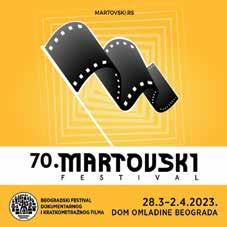
One of the oldest film festivals in Europe and the world will mark an extraordinary jubilee, marking 70 years since its foundation, which no film festival in Serbia and the former Yugoslavia has had until now. The Martovski festival will present to the audience a rich film program in several national competition categories: documentary film up to 50 and over 50 minutes, experimental film and video art, animated film and short feature film. All genres of short films will be represented in the international competition program. In addition to the competition, the Martovski Festival will have a traditional and diverse review film program divided into “World Panorama”, “Regional Panorama”, and “Domestic Panorama”. The audience can watch many film premieres and works by significant domestic and international authors. Numerous expert programs and panels for professionals and students, discussions with festival guests, master classes, book promotions and other accompanying programs are planned.
The Martovski Festival is traditionally a meeting place for filmmakers from the country and abroad, producers, distributors and representatives of renowned film festivals, journalists and critics, students and professionals. It is a place for the promotion of documentary, animated, short and experimental films, a platform for inspiration and the development of new ideas, as well as an opportunity for the local audience to watch exciting, carefully selected current titles, which they usually do not have the opportunity to see in the cinema offer. www.martovski.rs
Exhibition “Archiculture”
By Boris Podreka
Until 15 March - Museum of Applied Arts
The exhibition entitled “Archiculture” by the Italian-Slovenian architect Boris Podreka will be opened on 30 January in the Museum of Applied Arts in Belgrade. Apart from the architectural solutions from the recently held exhibition in Vienna, works of applied art will also be presented at the exhibition. For the first time, the Serbian public will have the opportunity to see the artworks of Professor Podreka. The exhibition, which can be visited until 15 March 2023, is organised by the Museum of Applied Arts in cooperation with the Embassy of Austria in Belgrade, the Austrian Cultural Forum, the Embassy of Slovenia in Belgrade, the Embassy of Italy in Belgrade, the Italian Institute for Culture in Belgrade and Wiener Städtische osiguranje.
Boris Podreka, architect, anthropologist, critic and professor, was born in Belgrade on 30 January 1940. He completed his architecture and fine arts studies in Vienna, where he lives and works. The characteristics of its architecture come from continuous movement and discovery. In Athens, a city he got to know thanks to international competition, Podreka discovers the city and becomes an urbanist. Cities are spaces that are a part of it, and in turn, Podreka leaves a part of itself in the cities.

March | 2023 68 SEE MORE: WWW.CORDMAGAZINE.COM calendar
Culture
Decoding Talent: How AI and Big Data Can Solve Your Company’s People Puzzle
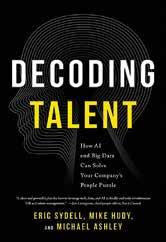
Eric Sydell 3361rsd
The typical hiring process is fraught with complexity, inefficiency, and bias and often shuts out the most talented candidates. Decoding Talent: How AI and Big Data Can Solve Your Company’s People Puzzle makes a case for using complex advanced technologies to move past these problems toward effortless optimal candidate decisions. AI experts Eric Sydell, Mike Hudy, and Michael Ashley explain why the traditional resume application is outdated, why hiring is complex, the cost of bad people decisions, how bias interferes in hiring practices, and how AI can address these problems.
Jean-Michel Basquiat: Of Symbols and Signs

Dieter Buchhart, Antonia Hoerschelmann 5872 rsd

Jean-Michel Basquiat’s symbolic, complex, and often emotionally charged work made a huge impact on the 1980s downtown New York City art scene. And though his all-too-brief career ended when he died at age 27, Basquiat left behind an enormous legacy in the number of works he produced and the messages he encoded around political, social, racial, and cultural issues. This exciting book shows how Basquiat used an intricate network of signs and symbols to challenge the very system that made him a darling of the art world.
The Ultimate Art Museum
Ferren Gipson
4414 rsd
Visit the world’s greatest museum without leaving your home through this imaginary art museum - a visually spectacular survey of world art for middle-grade readers, curated in collaboration with a global team of experts and educators. This imaginary art museum is an educational and inspiring experience without space and time constraints. Discover beautiful reproductions from pre-history to the present, arranged in easy-to-navigate, colour-coded wings, galleries, and rooms, each with an informative narrative guide.

Changemaker Playbook: The New Physics of Leadership in a World of Explosive Change
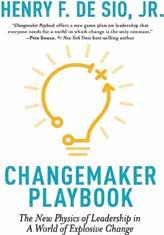
Henry De Sio 1295 rsd
Our one-leader-at-a-time past has given way to a present reality where everyone has the potential to lead in every aspect of life. We all have at our fingertips the tools of change that were once available to just a few - and The shift from one leader at a time to everyone leading in every moment has created a changemaker effect on society. Change is no longer linear and faster; it’s explosive and omnidirectional. The Changemaker Playbook will show you how to thrive in every aspect of today’s transformed societal landscape.
After Steve Tripp Mickle

2186 rsd
Steve Jobs called Jony Ive his “spiritual partner at Apple.” The London-born genius was the second-most powerful person at Apple and the creative force who most embodies Jobs’s spirit, the man who designed the products adopted by hundreds of millions the world over: the iPod, iPad, MacBook Air, the iMac G3, and the iPhone. In the wake of his close collaborator’s death, the chief designer wrestled with grief and initially threw himself into his work designing the new Apple headquarters and the Watch before losing his motivation in a company increasingly devoted more to margins than to inspiration.
Grip

Rick Pastoor 1700 rsd
The week just started, and already you’re playing catchup. At the end of another busy day, your to-do list is longer than it was this morning. Enter GRIP: the book for everyone who has too much to do. This fresh, nononsense guide brings clarity and direction to even the most hectic workweek. Using tools you know - like your calendar, to-do list, and email - Grip walks you through working smarter, thinking bigger, and clearing the way for what matters most. And Grip’s pick-and-choose structure makes it easy to dive in and apply what you like immediately.
69 March | 2023 RECOMMENDS
SEE MORE: WWW.CORDMAGAZINE.COM
FACES PLACES&
6/2/2023
IWC Coffee Morning At The Ethnographic Museum
The first event of the year was a chance for the International Women’s Club Belgrade (IWC) to gather at one of the oldest museums in the Balkans. The Ethnographic Museum recently celebrated its hundredth anniversary, and members were invited to join a tour followed by a showcase of traditional Serbian songs, food and drink. Before proceedings, Eun Hai welcomed the club back from the winter break and made a few announcements, including the Call for Proposals. The IWC is now accepting applications for funding and support for their 2022-2023 charity cycle.
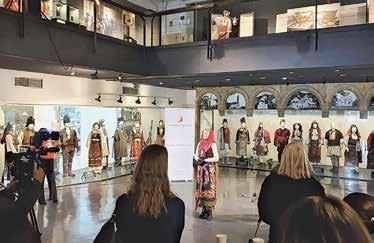
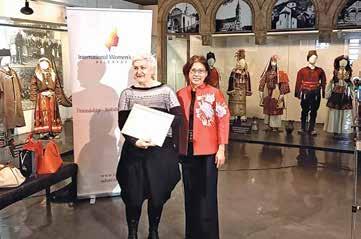
8/2/2023
The National Day Of Iran Marked
The ceremony marking Statehood Day and the 44th anniversary of the victory of the Islamic Revolution in Iran was held by the Embassy of the Islamic Republic of Iran in Belgrade on 8 th February 8. The ceremony was attended by members of the diplomatic community and Serbian guests, among whom were political and military officials, religious, cultural and academic figures and a group of Iranians living and working in Serbia. The dignitaries and guests congratulated the ambassador of Iran, H.E. Rashid Hasanpour, on the anniversary of the Islamic Revolution’s victory. The ambassador welcomed and thanked the dignitaries and those interested in the Islamic Republic of Iran for their presence.
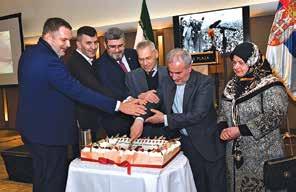

70 March | 2023
Conference On Finnish Education Held In Belgrade
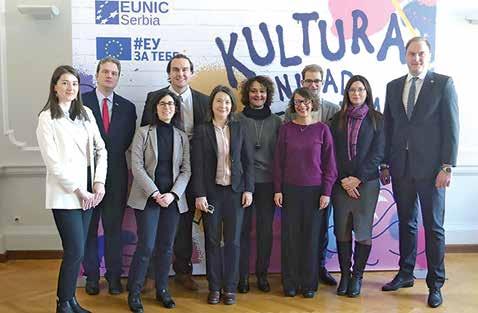


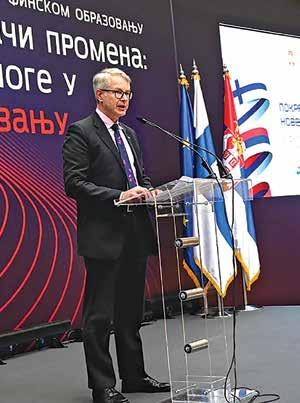
A conference on Finnish education, “Drivers of change - new roles in education”, was held at the Palace of Serbia, which was jointly organised by the Ministry of Education of the Republic of Serbia, the Embassy of Finland in Belgrade, the Nordic Business Alliance, the Foundation “Education for Serbia” and UniCredit Bank. Experts from Serbia had the opportunity to become better acquainted with the Finnish educational system and pedagogical model, which are among the most successful in the world. The conference was opened by H.E. Kimmo Lahdevirta, the Finnish ambassador to Serbia, who pointed out that the Finns have confidence in the education system, which is built on the belief that the nation can use its full human and economic potential only if every citizen has the opportunity to realise their personal potential.
Project “Culture Never Sleeps” Presented At The Embassy Of Austria
The project “Culture never sleeps”, launched at the Delegation of the European Union initiative as a platform of EUNIC (European Union National Institutes for Culture) Serbia, was presented at the Embassy of Austria. “The basic idea is very simple, as members, we socialise, we are not in competition with each other, but we learn from each other and become better together. We stand for the respect of liberal arts and sciences that transcend borders and are open to dialogue, progress and criticism, but also aware of one’s own values”, said Adrien Feix, director of the Austrian Cultural Forum, who reminded that the EUNIC Serbia cluster brings together 20 cultural institutes and embassies of EU member states that exchange ideas and develop joint projects with the desire to support diversity and creativity in Serbia.
71 March | 2023
10/2/2023
10/2/2023
SEE MORE: WWW.CORDMAGAZINE.COM
FACES PLACES&
Richard Grenell Awarded The Order Of The Serbian Flag 1st Class
The former White House envoy for dialogue between Belgrade and Pristina, Richard Grenell, was awarded the Order of the Serbian Flag of 1st Class on the occasion of the Statehood Day of the Republic of Serbia for his merits for the arrival of American investments, advocacy for peace and for the Serbian voice to be heard in international forums. “Grenell is one of the people who often tried to have a balanced approach, which is extremely important for our country regarding Kosovo and Metohija.”, said the President of Serbia, Aleksandar Vučić. He awarded the same order to the Minister of Labor of Azerbaijan Sahil Babayev, and the long-time Belgrade Archbishop Stanislav Hočevar. In addition, the former adviser to the President of Cyprus, Elena Mina, was awarded the Order of the Serbian Flag of the third degree for her contribution to developing and strengthening bilateral relations between the two countries.

20/2/2023
Event On The Occasion Of The Completion Of The “Nordic Green Project - Sustainable Solutions For Serbia”
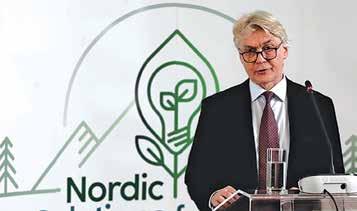
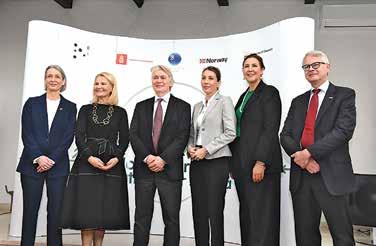
In the residence of the Norwegian ambassador H.E. Jørn Gjelstad, a ceremony was held on the occasion of the completion of the “Nordic Green Project - Sustainable Solutions for Serbia” initiative for 2022/23. This initiative presented to the domestic public Nordic green solutions, that is, Nordic green technology, business models for environmental protection, and solutions in the fight against climate change. The ceremony was attended by Ministers in the Government of Serbia, Tanja Miščević, Minister for European Integration and Dubravka Đedović, Minister of Mining and Energy; ambassadors of the four Nordic countries, Susan Schein of Denmark, Kimmo Lahdevirta of Finland, and Anika Ben David of Sweden, as well as representatives of local self-government, business associations, academic community and others.

72 March | 2023
15/2/2023
20/2/2023
Liberation Day Of The State Of Kuwait Marked


Ambassador of Kuwait to Serbia H.E. Fayez Al-Mutairi, was host of the reception marking the 32nd Anniversary of the Liberation Day of the State of Kuwait. The event was held at the Hyatt Regency Hotel and attended by numerous members of the diplomatic community, members of the Serbian Government, friends and partners of the Embassy. Ambassador noted that this year marks 16 years since establishing diplomatic relations between Kuwait and Serbia.
22/2/2023
Annual Event “Vasilopita Cutting” Of The Hellenic Business Association

The Hellenic Business Association of Serbia held the traditional reception “Vasilopita Cutting”, a custom that marks the beginning of a successful business year in the Greek corporate environment. The gathering brought together many members and friends of the Association. The event was held at Belgrade’s Metropol Hotel and was attended also by Ambassador of Cyprus H.E. Demetrios Theophylactou and representatives of the Office for Economic and Commercial Affairs of the Embassy of Greece.
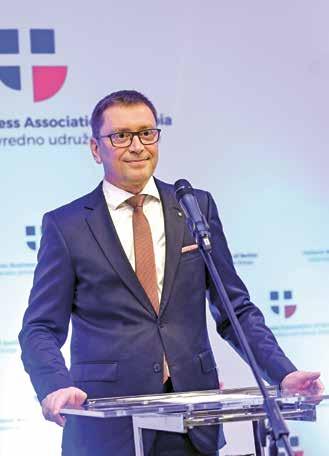
73 March | 2023
SEE MORE: WWW.CORDMAGAZINE.COM
FACES PLACES&
Embassy Of Japan Organized Reception On The Occasion Of Emperor Naruhito’s Birthday
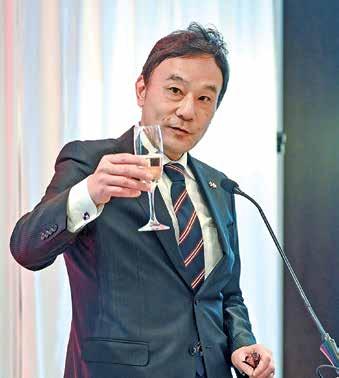
Ambassador of Japan to Serbia, H.E. Katsumata Takahiko, organised a reception at the “Metropol Palace” hotel on the occasion of celebrating the birthday of Emperor Naruhito of Japan and expressed his satisfaction that he had the opportunity to invite guests to the first ceremony after the coronavirus pandemic. The ambassador thanked Prime Minister Ana Brnabić for attending the enthronement of Emperor Naruhito in October 2019 and the state funeral of Prime Minister Abe the previous year. “Our two countries are entering a new era of bilateral regional and international cooperation,” said ambassador Takahiko.
23/2/2023
The 44th International Tourism Fair Opened


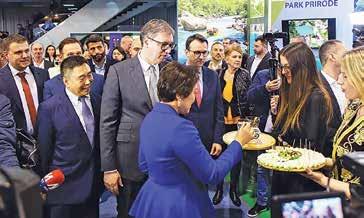
The 44th International Tourism Fair was opened at the Belgrade Fair, where around 350 exhibitors from 33 countries will present their offerings. The President of Serbia, Aleksandar Vučić, said in his speech at the opening of the Fair, held under the slogan “When vacation is not difficult”, that Serbia has made great progress in recent years, as the inflow from tourism is 2.5 billion euros.
China’s Ambassador to Serbia, H.E. Chen Bo, who visited the Fair with President Vučić, said there is an excellent prospect of tourism cooperation between China and Serbia and that she is pleased that China is a partner country of this year’s manifestation.
74 March | 2023
23/2/2023
SEE MORE: WWW.CORDMAGAZINE.COM
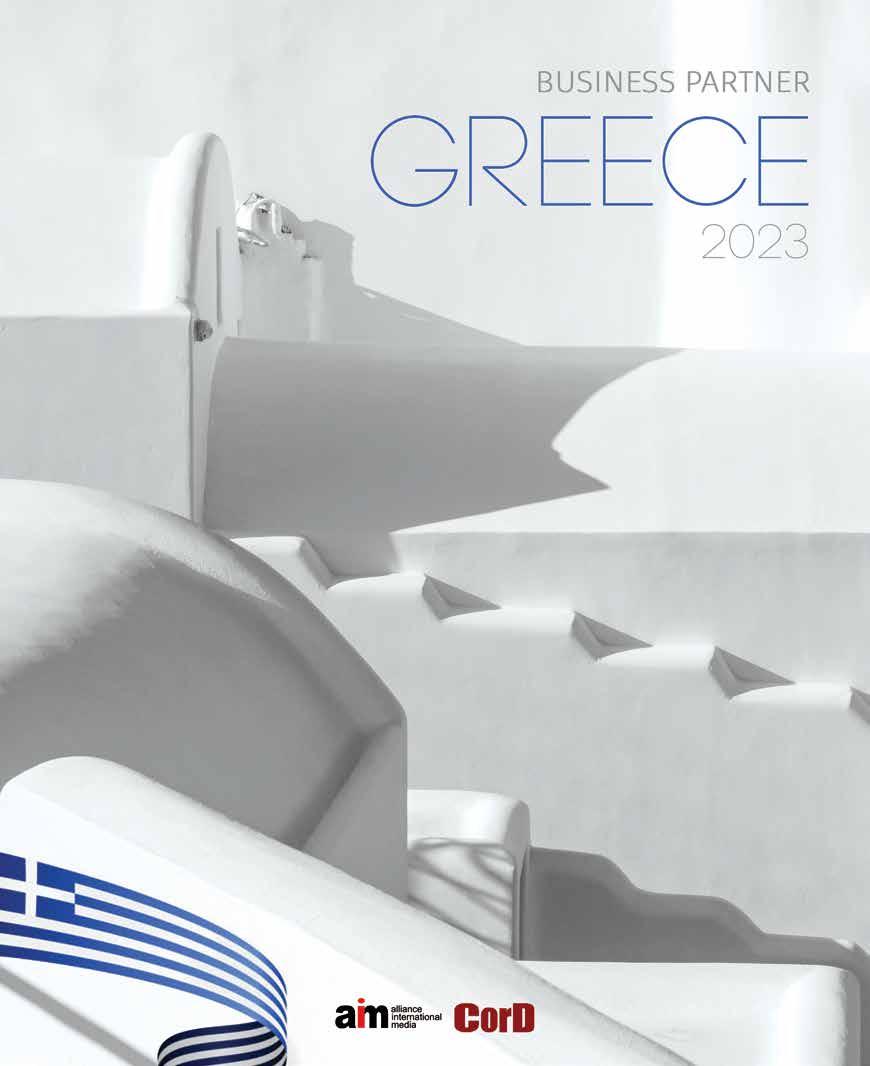 H.E. Maria Levanti, Ambassador of Greece to Serbia
H.E. Maria Levanti, Ambassador of Greece to Serbia
Greece’sNon-RecognitionOfKosovo Remains Unchanged
Greece’s stance regarding non-recognition of Kosovo remains unchanged. At the same time, Greece firmly supports the continuation of the EU-facilitated dialogue between Belgrade and Priština and the efforts of Miroslav Lajčak, with a view to reaching a comprehensive agreement that will contribute to strengthening the stability and security of the whole region. In this context, we welcomed, along with the other EU member states, the European proposal to put the relationship between Belgrade and Priština on a new and sustainable footing
When H.E Maria Levanti arrived in Belgrade at the end of 2022, she set as her priorities enhancing and enriching the already excellent relations and political cooperation between Greece and Serbia. She said that she would focus on areas of common interest, such as the economy, energy, connectivi -

ty, culture and education. One of the first visits she paid was to the Serbian National Assembly, the country’s parliament, because she believes that the national parliaments are important channels of communication between the two countries. “Greek-Serbian Parliamentary Friendship Groups are among the largest groups in both the Greek and
~ Maria Levanti
Serbian parliaments and I am very content to realise that they are very active,” adds Ambassador Levanti in her first interview for CorD Magazine.
Your Excellency, your term as ambassador to Serbia began recently. How are you finding life in Belgrade?
GREECE 2023 2 Interview
Greek-Serbian Parliamentary Friendship Groups are among the largest groups in both parliaments and I am very content to realise that they are very active, with many reciprocal visits
I have always desired to visit your country and, even though I have only been here for a few months, I must confess that Belgrade and Serbia have exceeded my expectations by far. The people I meet are very friendly and genuine; the culture, habits and mentality are quite similar to ours and, of course, the food is excellent. Belgrade has the atmosphere of a big European capital, while - on the other hand - life has a more relaxing pace and rhythm. All in all, I would say that Serbia feels like home and I really can’t wait to explore the rest of the country and all its hidden gems.
You noted upon arrival in Serbia that relations between our two countries are “excellent and friendly, and that the two peoples are connected by a similar mentality, shared history and spiritual closeness.” What do you have planned as your priorities?
Among my first priorities will definitely be the enhancement and enrichment of the already excellent bilateral relations and political cooperation, especially in areas of common interest, such as the economy, energy, connectivity, culture and education. Given that the COVID-19 crisis led to the level of our bilateral cooperation falling significantly, it is time to redefine our priorities and work together for the benefit of both countries. In this sense, the convocation of the fourth meeting of the High-Level Cooperation Council is a top priority.
It was stated during your first meeting with Serbian President Vučić that a new session of the High-Level Cooperation Council between Greece and Serbia will be held soon. Are preparations for this session underway?
A specific date for the 4th High-Level Cooperation Council, which is set to take place in Belgrade, has not yet been set. For our part, we expect it to convene at the earliest possible opportunity, though taking into consideration that national elections are to be held in Greece in the near future.
I am proud to say that not only political relations, but also economic, stand at an excellent level. Total Greek direct investment in Serbia is currently estimated at approximately 1.5 billion euros
One of your first activities in the country was to visit the National Assembly, where you spoke with members of the Friendship with Greece group. In your opinion, how important is bilateral cooperation at the level of parliaments?
It is important to develop and enhance all fields and aspects of bilateral relations and cooperation, including the parliamentarian aspect. Greece attaches great importance to parliamentarian cooperation and the Parliamentary Friendship Groups constitute another channel of communication between our countries, through which we can foster closer working relations and establish and develop re-
Being clear about one’s positions, especially during times of war, is important. I would like to stress that adherence to the sanctions regime should be required from all candidate states, without exceptions
time, Greece firmly supports the continuation of the EU-facilitated dialogue between Belgrade and Priština and the efforts of Miroslav Lajčak, with a view to reaching a comprehensive agreement that will contribute to strengthening the stability and security of the whole region. In this context, we welcomed – along with the other EU member states – the European proposal to put the relationship between Belgrade and Priština on a new and sustainable footing.
How will Greece respond to Kosovo’s candidacy for membership in the Council of Europe and its application to become an EU member state?
It has become clear that there is no unified position of member states with regard to Kosovo’s membership in the Council of Europe and that there are differing views about the timeframe in which it could appear on the agenda. We believe that, in the meanwhile, Kosovo needs to engage more constructively in a substantial dialogue with Serbia, with the aim of achieving progress in normalising relations.
lations with local communities. Greek-Serbian Parliamentary Friendship Groups are among the largest groups in both parliaments and I am very content to realise that they are very active, with many reciprocal visits.
You arrived in Serbia with the message that Greece will not change its stance regarding the unilaterally declared independence of Kosovo. However, Greece is a member of the EU, and Brussels has been increasingly calling on the government in Athens to abandon such a position. Information about diplomatic pressure being applied to compel governments to change this stance has also been confirmed by some of the other countries that don’t recognise Kosovo. Has Greece felt such pressure to conform? Greece’s stance regarding non-recognition of Kosovo remains unchanged. At the same
Do you have plans regarding ways to improve bilateral relations on the economic front, given the excellent relations between our two countries on the political level? In which areas could Greece and Serbia further develop their cooperation?
I am proud to say that not only political relations between Greece and Serbia, but also economic relations, stand at an excellent level. Total Greek direct investment in Serbia is currently estimated at approximately 1.5 billion euros. Greek interest in investing in Serbia is recovering strongly – some significant new investments have already been conducted over the last two years, i.e., the merger of Eurobank and Direktna Bank, the Athens Stock Exchange’s acquisition of 10.24% of shares of the Belgrade Stock Exchange, the construction of the new SuperVero-Jumbo hypermarket in Novi Sad, as well as the emergence of many new Greek SMEs.
GREECE 2023 3
It has become clear that there is no unified position of member states with regard to Kosovo's membership in the Council of Europe and that there are differing views about the timeframe in which it could appear on the agenda
PARLIAMENTARY COOPERATION INVESTMENTS EU FCSP
The annual volume of bilateral trade in goods and services equated to around a billion euros, while there’s no doubt that it will increase significantly in the future. It is worth mentioning that, according to data of the Hellenic Statistical Authority, bilateral trade reached the amount of 700 million euros in the first 11 months of 2022.
Of course, it is undeniable that there is plenty of room for bilateral economic cooperation to strengthen and improve. The Joint Declaration for the establishment of a Strategic Partnership between Greece and Serbia, signed in December 2019, highlights this potential. Greece is ready to support the Serbian economy, not only by encouraging investments in traditional sectors, but also by contributing to its growth through the sharing of the knowledge and experience gained through its own green transition path and technological advancement. Moreover, Greece is ready to support Serbia’s energy diversification efforts by all means – through the Bulgaria-Serbia Interconnection and its connection with TAP and the LNG terminal in Alexandroupolis.
There is strong interest among Greek companies in cooperating with their Serbian counterparts in sectors like infrastructure and construction, recycling, wastewater treatment, information and communication technologies, tourism, food and beverage trade and agriculture. And we have already taken concrete steps to enhance cooperation between the institutions of our countries in scientific and innovation sectors.
Finally, as stated recently by Prime Minister Mitsotakis, the completion of the Piraeus-Thessaloniki-Skopje-Belgrade railway line is of great importance, as it will facilitate not only trade and transport, but also communication in the region.
Serbia has been criticised harshly for its failure to comply with the EU’s common foreign and security policy when it comes to Russia. How have you, as ambassador to Serbia, understood the arguments of the government in Belgrade?
I can understand the rationale behind the Serbian government’s decisions, as it is faced with a particular situation: it is dependent on Russia for energy, has the open issue of Kosovo and a large part of its people feel
Some significant new investments have already been conducted over the last two years, i.e., the merger of Eurobank and Direktna Bank, the Athens Stock Exchange’s acquisition of 10.24% of shares of the Belgrade Stock Exchange, the construction of the new SuperVero-Jumbo hypermarket in Novi Sad, as well as the emergence of many new Greek SMEs
close to Russia. However, Serbia has stated repeatedly that EU accession is its strategic priority and aligning with the EU’s foreign and security policy has been a requirement since the beginning of accession negotiations. Being clear about one’s positions, especially during times of war, is important. Having said this, I would like to stress that adherence to the sanctions regime should be required from all candidate states, without exceptions.
Greece has also faced a situation that threatens its own territorial integrity in recent times. What is the current situation in the Aegean Sea and are tensions with Türkiye easing?
In the context of its strategic priority of consolidating its position as a pillar of peace, stability, security and cooperation in the wider region, Greece is pursuing the constant improvement of its relations with Türkiye. However, it has faced an unprecedented escalation of provocations and aggressive rhetoric from the Turkish side, which embraced the concept of an anachronistic revisionism aimed against our country’s territorial sovereignty and sovereign rights.
Greece’s position is clear and firm; it cannot be threatened on issues that concern its sovereign rights, which are guaranteed by International Law and the International Law of the Sea, and will not accept any fait accompli in the region. At the same time, Greece is clearly committed to maintaining open channels of communication with Türkiye. In this regard, I would also like to mention that Greece, in the spirit of solidarity, was one of the first countries to mobilise its resources and provide immediate assistance to Türkiye following the devastating earthquakes that hit the country in early February.

As ambassador, you’ve also inherited the tripartite dialogue between Greece, Cyprus and Serbia. How important is this form of cooperation in today’s world, when the crisis in Ukraine has led to increased talk of the possibility of nuclear war and the consequences of the crisis – not only economic, but also political – are also being felt in our region?
Greece deeply values regional cooperation, as an important instrument that actively promotes dialogue, coordination and development at a peripheral scale. The first trilateral meeting between Serbia, Greece and Cyprus was held in Belgrade in 2021. Our foreign ministers discussed the prospects of developing multilateral cooperation, promoting synergies and establishing joint activities in a number of areas, such as energy security through energy diversification and transport connectivity. I believe that, in the current complex geopolitical framework, the tripartite dialogue can be of even greater added value, serving as a tool to strengthen our collaborative efforts and actions in a broad range of economic fields and upgrading political communication and coordination among our three countries.
GREECE 2023 4 Interview
EKO Serbia,ServingTheCommunity
EKO Serbia has marked the opening of a new petrol station in Čačak by donating fuel to the social protection services centre Zračak, which will provide all its users with safe transport home

The new filling station operates in accordance with the most modern technical, safety and environmental standards, and is fully adapted to the demands and expectations of drivers.
EKO Serbia, a member of HELLENiQ ENERGY, has expanded its network to 57 petrol stations by opening a new station in Čačak. On this occasion, EKO Serbia donated funds for the purchase of fuel to the Zračak social protection services centre.
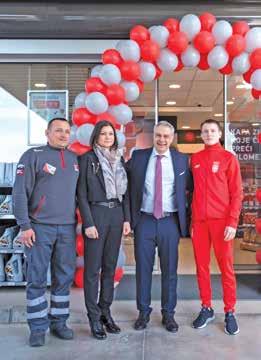
“In line with our business development plans, we are continuing to expand the EKO retail network in Serbia, maintaining high standards of product quality and providing the best services to our customers. At the same time we are contributing to the needs of the local community, donating fuel to the Zračak Centre, which will provide all its users with safe transport home. As a socially responsible company, we continue to support the local communities in which we operate”, said Aris Karousos, CEO of EKO Serbia.
The Zračak centre in Čačak has 256 users, and the donation is intended for a specialized van to transport users who live in rural areas.
“We would like to thank EKO Serbia for this donation”, says Ana Jakovljević, director of the Zračak social care centre. “It will enable our users to have easier access, above all to the day care centre, which provides the opportunity for people with developmental disabilities to stay in a family environment, and to use their opportunities and integrate into the community. This donation is also important for other services for people with disabilities and the elderly”
The new filling station in Čačak is open 24 hours a day and offers a complete portfolio of fuel products, including high-quality premium category fuels - Diesel Duplo Filtered and EKO
Racing 100 RON. Consumers also have at their disposal the completely modernised Kalypso minimarket, premium coffee in the Coffee Corner, and a carefully selected range of consumer goods, car cosmetics and EKO motor oils. At all EKO Serbia stations, consumers can join the EKO Smile loyalty programme, which rewards every purchase with points that can be exchanged for useful and valuable gifts, and until 12th March, every customer who fills up 15 or more litres of fuel receives a gift.
EKO Serbia a.d. is a member of the HELLENiQ ENERGY business group, the leading integrated energy group in Greece and the south-east European region Its activities include the production, supply and trade of all types of energy, with an increasing focus on clean energy and renewable energy sources. Since its foundation in 2002, the company has invested more than 100 million euros in Serbia. Their network has 57 filling stations under the EKO brand, which is undeniably synonymous with reliability, quality and excellent service. The main goals of the group are to achieve a leading position as an innovative international leader in the energy business, to be the first choice of consumers by offering top quality products and services and safe working conditions, while respecting the environment and consumers and providing a social contribution to the community.

GREECE 2023 5 Business
There are 57 filling stations in Serbia under the EKO brand, which is undeniably synonymous with reliability, quality and excellent service
Committed To DevelopmentAndCooperation
Nikolaos Sliousaregko, President of the HBA Management Board
The crisis in Ukraine has led to economic uncertainty at a global level, and economic growth will certainly slow sharply during 2023. It is expected that the war will continue to impact not only supply chains, but also the global economy as a whole, with rising inflation and high interest rates fuelling possible recession. European is particularly exposed to challenges as a result of its dependence on imports of gas and oil, which is why great work is being done to identify alternative sources of energy. 1
Despite the numerous challenges confronting us, Greek companies in Serbia have recorded stable operation during the period of crisis. Moreover, data exchange on goods trade between Serbia and Greece for 2022
1 https://www.forbes.com/sites/ chloedemrovsky/2023/01/18/supply-chainand-ukraine-shaped-a-hectic-year--whatwill-2023-bring/?sh=55d635796358
indicate a slight increase compared to 2021, when exports totalled a value of approximately 300 million USD, while imports were worth 534 million USD ~ says Nikolaos Sliousaregko, President of the HBA Management Board. “During the previous year, our association increased with several new members – new Greek companies on the territory of the country, from the SME sector. Simultaneously, the presence in Greece of very successful Serbian companies was noted during the previous period, through franchises and distribution in the sectors of cosmetic products, sportswear and sports equipment”.

How are HBA member companies weathering the crisis?
Rising energy prices and inflation are a challenge to big part of the corporations. When it comes to our members, Greek companies in Serbia are taking on challenges that are also
confronting all other domestic and foreign businesspeople, and those are aggravated transportation – both from territories hit by war or sanctions and from EU countries and China, due to high transportation costs and more difficult access to available capacities for transporting goods. Also, the search for labour has started to be a considerable problem for further development.
Searching for new suppliers, turning to solar power energy and importing workers seem like the first solutions that started to be adopted by Greek businesses.
Would you say that the current business environment is conducive to growth? How could it be improved from the perspective of your members?
Over the past few years, the Government of Serbia has remained consistent in implementing the programme of structural reforms and has improved the business and investment climate significantly. It is very important that promotion and investment in improving the infrastructure continues the following decade, along with the planned construction and modernisation of roads, railways, bridges
GREECE 2023 6 Interview
Thanks to the strong support of its member companies, the Hellenic Business Association has spent two decades promoting not only economic ties between Serbia and Greece, but also social and cultural links
COMMITMENT PROGRESS CONTRIBUTION

Greek investors are stable partners to the Serbian economy, testifying to which are the successful long-term operations of numerous companies
Despite numerous challenges, Greek companies in Serbia have recorded stable operations during the period of crisis, while the trade exchange between Serbia and Greece increased in 2022
Total Greek FDI in Serbia is estimated at around 1.5 billion euros, while direct and indirect investments over the past 20 years exceed a value of 2.5 billion euros
and ports. The Government is also directing efforts towards investing in healthcare, and the fact that Serbia embarked on the green transition path during the previous year is also important. Alongside this, we should also mention the IT sector as the fastest growing sector in Serbia. At the same time, there are existing challenges that are being faced not only by Greek companies, but also by all other companies operating on the Serbian market, the greatest of which are long-term harmonisation with EU regulations and complicated procedures for obtaining various permits for doing business as well as import-export procedures. Serbia is nevertheless one of the few countries in Southeast Europe where foreign companies have found the right place for development and stability.
The HBA is this year celebrating its 20th anniversary. Looking back, what would you single out as the HBA’s top achievements during this period?
The Hellenic Business Association was founded at the initiative of several Greek business leaders who decided, back in 2003, to establish a platform for connecting and cooperating between members of the Greek business community in Serbia. This idea was brought into practise and functions very successfully today. Thanks to the strong support of its members, the HBA promotes not only economic ties between Serbia and Greece, but also social and cultural links. Over the course of the past two decades, we’ve organised numerous activities and initiatives aimed at promoting mutual networking
among our members, but also connecting them with domestic and foreign companies operating on the market, while we’ve also had an opportunity to meet with the highest officials of Serbia and Greece. By implementing initiatives that promote our shared historical and cultural heritage, we have – at the same time - fostered the concept of friendship between our people, and demonstrated, through projects of a humanitarian nature, the social responsibility of Greek investors and their respect towards the host country.
When it comes to investments in Serbia, how much has the investment climate evolved, but also the interest of Greek companies? The implementation of macroeconomic reforms of multiple years, financial stability,
investment incentives and free trade arrangements with key markets, primarily that of the European Union, are the most significant factors that have contributed to improving conditions for foreign investment. Greek investors are evidently stable partners to the Serbian economy, looking at the long-term successful operations of numerous companies, such as Autostop Interiors, the Hellenic Sugar Industry, Alumil YU Industry, Kleemann, EKO, Isomat, Titan, Super Vero, the Lapsa Group, the Daskalantonakis Group and many others. There is still interest in investing in Serbia, with a focus on small and medium-sized enterprises, but also through the new investments of companies that are already present on the Serbian market. During the previous year, Eurobank conducted the merger process with Direktna Bank, which represents one of the most important business activities of Greek companies during the previous period, given that it confirms the stability of the Greek banking presence in the country. Super Vero also expanded its operations beyond Belgrade late last year, with the opening of a new hypermarket in Novi Sad. Apart from this, the successful enduring cooperation and growing business ties between the Athens and Belgrade stock exchanges resulted in the Athens Stock Exchange purchasing of 10.24% of total shares of the Belgrade Stock Exchange, which will join the trading platform that the Athens and Cyprus stock exchanges already operate on, thereby improving its liquidity and range of services.
Among the many sectors in which Greek investors are present, the banking presence used to have prominent place. Which sectors of the Serbian economy today have the most Greek companies in terms of turnover?
Four Greek banks marked not only the Greek investment presence over a specific period, but also represented a significant part of the entire country’s banking sector. Given that Greek companies, apart from those in the banking sector, have been active in almost all areas of business in Serbia for two decades, the sectors that stand out as being the most successful in the following years are the hotel industry and construction, the cement and sugar industry, the sector of petroleum trade, the manufacturing of construction materials and aluminium profiles, food and beverage
retail, the service sector etc. Total Greek FDI in Serbia is estimated at around 1.5 billion euros, while direct and indirect investments over the past 20 years exceed a value of 2.5 billion euros.
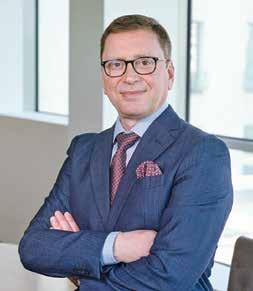
Today, thanks to EU support, the Green Agenda for the Western Balkans has a much greater presence in Serbia’s policy agenda. To what extent are Greek companies involved in the circular economy, wastewater treatment, waste management and construction in Serbia? Greek companies, the largest of which are the Aktor and Terna groups, are very active in the Serbian construction sector and have been responsible for implementing numerous projects of interest to the state and the public. When it comes to waste management, the Viohalco Group has been dedicated to the development and adoption of production processes that protect the environment in Serbia for many years, but also to providing high-quality services within the scope of a sustainable economic environment harmonised with nature.
As far as wastewater management is concerned, a Greek company is already close
to signing contracts for the first mobile wastewater treatment facilities, while very soon, provided all goes well, we will probably see a production unit in this sector in the country. At the same time, the Greek energy sector is itself going through a major transformation, given that the decision to close down coalfired thermal power plants was made under a very short deadline, which is why Greece turned to capacities that use renewable energy sources. The ascent of RES-based energy projects, which are mostly based on solar and wind energy, also testifies to the expertise of Greek companies in this sector, which could play a significant role in implementing the Green Agenda for Serbia . They could additionally contribute to it being applied in the fields of the circular economy, wastewater treatment, waste management and the protection of nature and biodiversity. Greek companies that are already present in the construction sector could also participate in implementing the plan.
Given your personal knowledge of the hospitality industry in both Serbia and Greece, could you tell us what we can expect from the upcoming 2023 tourist season?
The tourism industry in Serbia is developing constantly. According to results from 2022, the number of overnight stays doubled compared to 2021 and amounted to 12.3 million overnight stays, exceeding the forecasts from 2019 by more than 20 per cent. There have been continuous investments in new hotel units over recent years, by both domestic and foreign investors. In Belgrade, for example, we have gone from having 65 hotels in 2014 to reaching a total of 122 in just six years, and that includes the arrival of world-renowned brands. Of course, the trends and results of each year, as well as the operational policies of certain organisations and ministries for the opening of new markets, visas etc., have a positive effect, provided we exclude the two tragic years of the pandemic. Of course, we are monitoring the development of two topics with concern: the inflationary pressures appearing in many countries, but also the course of the crisis in Ukraine, which influences a large part of the tourist market. The results from January and February are nonetheless very positive for tourism industry flows during 2023, while many markets that closed due to the pandemic are expected to reopen.
GREECE 2023 8 Interview
Despite certain operational challenges linked to complicated procedures, Serbia is one of the few countries in Southeast Europe where foreign companies have found the right place for development and stability
More Than 25 Years Of Excellent Service
Cycle Credit forms part of ICAP Outsourcing Solutions, a company that has more than 2,800 employees and operates, apart from Greece, in Bulgaria, Serbia, Romania and Cyprus. This company plays a leading role in debt collection and notification in the loan restructuring industry
Explaining his company’s leadership position, Mr Alevizos says that it is based on the constant training of employees, advanced infrastructure and expertise, which supports the main effort: ensuring customer satisfaction. This is also the pathway that Cycle Credit will follow in the future.

What do we need to know about your company? What distinguishes you among the competition?
Cycle Credit is a member of ICAP Outsourcing Solutions Group and contributes with a leading role in debt collection and notification in the loan restructuring industry. Over and above the aforementioned, we are almost ready to establish Contact Centre Services in Belgrade, which will be supported by the very well-recognised Contact Centre in Athens that has been provided advanced call services for more than 15 years. Cycle Credit has more than 25 years of experience in the Balkans, which is something that creates a positive impact on the functioning of markets. Our competitive advantage makes a difference in three ways: the constant training of our employees, advanced infrastructure and our expertise, which supports the main effort: ensuring customer satisfaction.
When it comes to ICAP Outsourcing Solutions Group, I would like to add that it is a group of companies that provide services
regarding outsourcing and HR, customer services and the promotion of products and services (by telephone and alternative communication channels), consulting services for recruitment & selection, training and development of
human resources, B2C and B2B claims information and management services.
We provide a wide range of high quality and innovative services that add value to organisations and companies from all business sectors, such as banks, insurance companies, manufacturing, telecommunications, retail, tourism, IT, technology and health services.
Apart from the enviable experience and expertise of your employees, what else helped you to secure your leadership position?
Cycle Credit’s leadership position is based on the fact that it has served more than 25 million cases (individual debtors and companies) and had over 350 collaborations during a period of time fraught with economic changes and readjustments. All of the aforementioned has tested our flexibility in handling each situation effectively. We take a holistic approach to finally have the best results, for both stakeholders and the society. This all ensures that we are a reliable partner to choose.

What’s included in all the services you offer through your ICAP Contact Centre? Is it possible that you can make or receive more than 180,000 calls per day?
I would like to mention that we are really proud that our Contact Centre supports more than 180,000 communications (inbound, outbound, chat, email) per day. The Contact Centre focuses on customer care and outbound services. Customer care uses several operational models (full outsourcing, overflow, IVR category split), in order to handle each project effectively. Our well-qualified and experienced agents respond to challenges every day, offering high-quality support to our clients. So, I would say that our employees are our unique asset and, with our modern infrastructure and technological support, we provide services that create an enduring relationship with our clients.
GREECE 2023 9 Business
Ilias Alevizos, President & CEO, Cycle Credit company, ICAP outsourcing solutions group
We take a holistic approach to finally have the best results, for both stakeholders and the society
Iosif Vangelatos, General Manager, Inos Balkan
Greece Is Back
journey towards European Union integration in political and technical terms, but also in financial and investment terms.
I moved to Serbia with my family back in 2013, when the Stabilisation and Association Agreement (SAA) between the EU and Serbia came into force, and I am proud that our organisation has also contributed to the development of the Serbian economy as a foreign investor. However, I am even more proud to witness the changes taking place in the Serbian economy and Serbian
Inos Balkan is a 70-year-old company that sources secondary raw materials to service the national and regional metal industry. They consider this geographic area in terms of a home market for them, both for their products, as well as for the procurement of raw materials
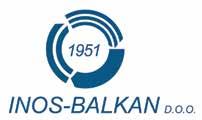
Inos Balkan General Manager Iosif Vangelatos moved to Serbia with his family a decade ago. He is proud that his company has contributed to the development of the Serbian economy as a foreign investor and believes that Serbia has a secure journey towards European Union membership.

Serbia’s total FDI from Greece is estimated at approximately 1.5 billion euros, while direct and indirect investments made over the last 20 years exceed a value of 2.5 billion euros. Inos Balkan has also contributed to that total... Are you proud?
Lots of words have been said and written about the strong relations between Greece and Serbia. These are timeless bonds based on religion, history and common struggles. Nevertheless, it is more than that. Greek companies immediately responded to Serbia’s need for foreign direct investments back in the early 2000s and supported the Serbian economy at that crucial time. Greek firms were among the first to invest in Serbia, proving their faith in the future of the Serbian economy in practise. Let’s not forget that the ten-year Greek fiscal crisis placed a severe burden on the expansion of Greek entrepreneurship. But Greece is back and ready to support Serbia’s
society; changes that will secure Serbia’s pathway to European Union integration and the prosperity of the Serbian people.
Back in the early 2000s, we were not able to boast of having a well-organised recycling sector, despite Inos Balkan – the company you took the helm of at that time – having spent decades dealing with the procurement of secondary raw materials. How did you recognise the potential?
The acquisition of Inos Balkan in the early 2000s was part of an integrated strategic plan of our group for expansion across the Balkan region. We consider this geographic area in terms of a home market for us, both for our products and for the procurement of raw materials. Our Steel segment - Sidenor Group - is the biggest recycler in the region and we are always trying to support our productive investments with efficient supply chain networks, while contributing to global efforts to create a low carbon economy and manage resources sustainably.
It was a challenge to enter the recycling sector back in the early 2000s. The legal
GREECE 2023 10
Business
As part of our ESG roadmap, respecting the natural environment is one of our core business principles
framework was not yet fully developed, while the state was trying to empower its auditing mechanisms. However, we had in our arsenal adequate expertise and available financial resources. Above all, we were confident that we could seize the opportunities created by Serbia harmonising its regulations with the European acquis.
Even though a lot has already been done, it remains essential to further simplify administrative procedures. Would that bring new investments, environmental protection and fair competition to our country’s recycling sector?
I have to agree with you that a lot of progress has been observed in terms of simplifying administrative procedures. Serbia has risen to 44th position on the Ease of Doing Business Index, according to the latest World Bank annual ratings, despite being ranked 93 rd just a decade ago. Simplifying administrative procedures has great weight on that index. However, a lot of essential issues could be further addressed. This is especially so when it comes to the environmental protection sector. The complex procedure for acquiring the necessary environmental permits for an investment is a severe delay factor. Small improvements, such as in communications between public services and the ex officio request of records and documents, as well as increased utilisation of digital tools, may further simplify administrative procedures while increasing transparency levels.
The policy of harmonising with the natural environment is one of your core business principles and forms part of your portfolio of corporate values, but not obligations. Is that precisely what sets you apart from the competition?
As part of our ESG roadmap, respecting the natural environment is one of our core business principles. We join forces with the rest of the world in the direction of creating a carbon neutral and circular business model. Thoroughly monitoring our activities enables us to measure our performance and deploy our policies with accuracy, in order to achieve our sustainability targets.
You have succeeded in tripling the amount of secondary raw materials you process in
recent years, while you are striving to further increase the volume of your operations. How have your plans been impacted by country global crises, including the war in Ukraine? The crisis of the COVID-19 pandemic, with the corresponding fiscal measures that governments all over the globe adopted to safeguard against the upcoming recession, as well as the war in Ukraine, created unique turmoil for the world economy. After almost three decades, our economies again had to face runaway inflation, while scenarios for a severe global economic recession were again on the table. Uncertainty was the key element that had to be handled by policymakers all over the word. We could not be the exception to this rule. We tried to secure our supply chains against any potential disruption and to mitigate all potential risks coming from price fluctu-
ations in metal commodities and energy costs. We set preserving our cash liquidity as a major priority, as well as supporting our employees during this turbulent time.
Inos Balkan is a member of the Hellenic Business Association of Serbia, which will celebrate its 20th anniversary at the end of this year. Do you think this association has fulfilled its mission of strengthening economic relations between our countries? The Hellenic Business Association was established during a difficult era for the Serbian economy. Some pioneers decided to blaze a trail for more investors to follow their lead. The Hellenic Business Association was, is, and will continue to be, a reference point for every Greek entrepreneur or executive who would like to establish business activities in Serbia. It is a well-established organisation that’s able to provide secure information and consultancy on many different aspects of business activities – from labour related legislation, to taxation issues and lobbying. Numerous activities carried out on an annual basis bring its members into contact with the core developments of the Serbian business environment, while promoting business opportunities in both countries.
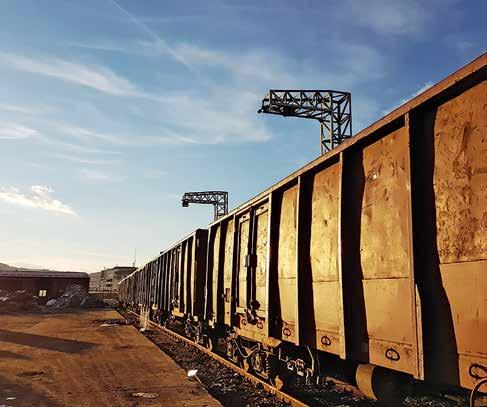
GREECE 2023 11
Serbia has risen to 44th position on the Ease of Doing Business Index, according to the latest World Bank annual ratings, despite being ranked 93rd just a decade ago
Milan Čotra, Executive Chef of Hyatt Regency Belgrade

OfficiallyAmong The Best
Thanks to a fantastic team led by a top chef and specialities that represent a combination of traditional Serbian and international cuisine, restaurant Metropolitan Grill was recently included in the 2023 Michelin Guide
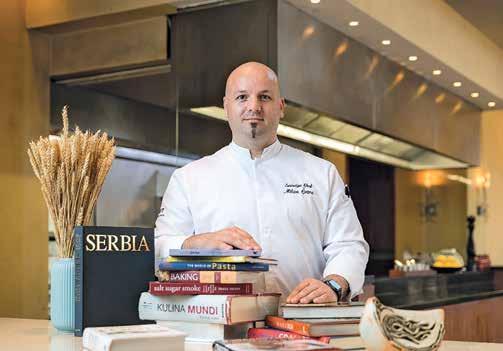
authenticity and global diversity that every guest has the opportunity to experience.
Restaurant Metropolitan Grill each week organises Sunday lunch - The Food Affair, the concept of which as of this year includes a culinary journey around the world. In addition, the restaurant also has its Chef’s Table, as an innovative experience of preparing specialities from a carefully devised menu, together with unforgettable socialising and learning about food.
What was the ace up your sleeve that led to your inclusion in the 2023 Michelin Guide?
What is it that amazed even those who have the most refined palates?
Our main advantage is love for our work, as well as mutual assistance and the incredible positive energy that encourages the team to improve and advance. Our specialities are a fusion of traditional Serbian and international cuisine, so our culinary team conveys the authenticity of culture with every morsel. It is a great honour for us to have been included in the 2023 Michelin Guide and to have thus received confirmation for our many years of effort and creativity.
Chef’s table represents an innovative concept of preparing specialities from our carefully devised menu in the restaurant’s kitchen with our team of experienced chefs
Every week at the Metropolitan Grill restaurant we organise Sunday lunch - The Food Affair, the concept of which has – as of this year – included a culinary journey around the world. We thus have opportunities each month to host chefs from different countries who prepare food live in front of the guests. Alongside fantastic specialities like oysters, sushi, steak and traditional dishes, guests can enjoy live music, while the youngest can participate in culinary activities and creative workshops.
As we’re already on the topic of your team, we can’t avoid asking you to tell us more about the unique concept that you implement called Chef’s table... What is it about?
Are you among those who find joy in constantly discovering other cultures, lifestyles, foods etc.? If that wasn’t the case, you surely wouldn’t be able to boast of having such rich and enviable experience, a wonderful team and satisfied guests.
I consider it the responsibility of every individual to familiarise themselves with different cultures and occasionally change environments in such a way that they selflessly share their experiences with others. It is my pleasure to share my rich experience with colleagues in my home country, and to then together create a unique combination of local
We are a team that works continuously to connect and improve interpersonal relations, so I can boast of the fact that we contribute every day to building the careers of excellent young chefs. Chef’s table represents an innovative concept of preparing specialities from our carefully devised menu in the restaurant’s kitchen with our team of experienced chefs. This is an activity that encompasses food preparation, unforgettable socialising and learning about food, thus creating a great experience. We are proud that we are able to transfer the atmosphere of our team to others and create an environment that’s ideal for team building activities, celebrations or a unique experience for all lovers of excellent food.
GREECE 2023 12 Business
Efthimios Partsalis, CEO, Intracom Telecom subsidiary in Serbia
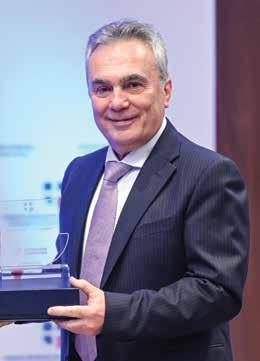
Pert Tu WithArtificialIntelligence
The EU has been working actively to promote the development and deployment of 5G networks across the region. Intracom Telecom has been part of this initiative from the outset, developing its wireless networks portfolio to support the high demand for broadband connectivity in 5G backbone multi gigabit networks
Being fully aligned with the need to support sustainability - not only in telecoms networks, but in every aspect of people’s lives - Intracom Telecom also focuses on providing a comprehensive portfolio of Smart Sustainable City & Enterprise solutions. That is our near future.
As more devices become connected to the internet, the demand for fast, reliable connectivity will only continue to grow. What is Intracom Telecom developing in terms of network equipment?
All products that work in MW and mmW spectrum are now built to support 5G transport networks. Moreover, Intracom Telecom has in its portfolio WiBAS™, a complementary product to 5G for fixed broadband access, which can enable operators to provide broadband connectivity to their customers, especially in rural and semi-rural areas, where it is not economically viable to build 5G or optical networks.
Artificial Intelligence seems to be an important element of the digitalisation process. Is Intracom Telecom ready to address this challenge?
Yes, this is true. We see AI as being the differentiating factor topping every solution we build. We have succeeded in having a comprehensive offer, including modules for Big Data clusters that we developed on our own, like cluster Monitoring & CI/ CD pipelines, as well as a multidisciplinary team of skilled experts, starting from
systems administrators, developers and data engineers, to ML engineers and data scientists. With such a strong team, we develop AI-powered applications on top of our products, while we are also working
hand-in-hand with our customers to build solutions for them, working closely with their business teams and IT experts.
How do you imagine the smart city of the future?
Smart cities have been a hot topic in the technology industry for several years, but there is still a long way to go before we can say that we have truly realised the full potential of smart cities. At its core, a smart city is a city that leverages data, technology and infrastructure to improve the quality of life of its citizens, while also reducing its environmental impact and increasing economic efficiency. The same applies to enterprises, which need to monitor their assets, premises and power consumption in order to formulate and enforce their operational optimisation and sustainability strategies. Intracom Telecom, with its leading IoT orchestration platform uiTOP™, addresses demands for smart organisations, covering all vertical applications from smart lighting to environmental protection and energy management. The true benefits of a smart use case can be seen in a combination of leveraging IoT data and artificial intelligence, which is what Intracom Telecom did for the project in our region’s largest city. In this case, our uiTOP™ platform was used in combination with our artificial intelligence Cognitiva™ platform to predict air pollution, bringing the city’s authorities and citizens more actionable insights on the state of air pollution in their city and ultimately helping to protect health.
GREECE 2023 13
Business
With such a strong team – comprising systems administrators, developers, data engineers, ML engineers and data scientists – we develop AIpowered applications
Commemorating the 140th anniversary of the birth of Nikos Kazantzakis

From Controversial Thinker To Cultural Treasure
You may have heard of Nikos Kazantzakis, but where has this most celebrated name crossed your path? Perhaps at the airport that’s named after him as you arrive in Heraklion. Or in the opening credits of the film Zorba the Greek. One of Greece’s most successful writers and philosophers, he received wide acclaim around the world
Aman after our own hearts, he was a great traveller who understood that travel would open up a person’s soul and feed his nature, and that understanding another man’s culture was the key to understanding one’s own.
GREECE 2023 14
Culture
Ironically, there has perhaps been no other writer who was so strongly judged, harassed and slandered, and yet hailed, as much as Nikos Kazantzakis. The popularity of his work ultimately far outweighs the social, religious and political criticism he received, and to the people of Crete his work will always be considered timeless and instructive.
WHO WAS NIKOS KAZANTZAKIS?
Born in Heraklion on 4 th March 1883, Kazantzakis attended Law School in Athens and Paris, where he received his doctorate. He would only later delve into the world of Greek literature, submitting plays to competitions and writing under pseudonyms for newspapers and magazines. The written word became his passion, and his love of philosophical writers like Dante, Homer and Nietzsche would fuel his passion and convert his philosophical thought into a plethora of plays, poems, essays, novels, and everything in between.
Kazantzakis travelled the world, and from 1927 began an anthology series of travel articles detailing his experiences. He published travelogues of his trips through Spain, Egypt-Sina, China-Japan, Russia and England. He mused consistently on different world views in his many philosophical writings and translated works like Dante’s The Divine Comedy with a view to bridging the gap between different cultures. He eventually rose to fame for his own contributions to literature and philosophy and was nominated for a Nobel Prize a total of 14th times!
To himself and many of his admirers and peers, his work was centred around his Cretan beliefs that love and freedom should be at the heart of all things. He was a free thinker, much like Sigmund Freud and Henri Bergson, whose works he greatly admired, but he wasn’t so quick to please everyone. The attitude of the Church of Greece towards Nikos Kazantzakis was that of a sour apple. They marked his writings as blasphemous and felt his grandiose ideas were religiously ignorant. In particular, The Last Temptation of Christ was deemed disrespectful to God and the clergy, and the Church demanded it be banned from circulation. He would be plagued by controversy and regularly hailed as a sympathiser to asceticism and atheism
until his dying day, 26th October, 1957.
Despite all this, the renowned writer and thinker is considered a cultural treasure.
Prior to his 1957 death, he brought to life a plethora of works that solidified the effect of his Cretan talent worldwide. The most
notable of his works are his philosophy book Askitiki: The Saviours of God, published in 1927, the epic poem The Odyssey: A Modern Sequel, representing a follow-up to the celebrated fiction Ulysses, and prose works Zorba the Greek and The Last Temptation

GREECE 2023 15
of Christ – with the latter work sparking the most controversy within the Roman Catholic Church and the Greek Orthodox Church.
THE ODYSSEY: A MODERN SEQUEL
This mammoth epic poem tops out at an impressive 33,333 verses. It was considered by Kazantzakis himself to be his greatest and most important work. It took 14 years, from 1924 to 1938, for him to deem the work fully complete. The Odyssey begins with Odysseus returning to Ithaca an unsatisfied hero, one who remained a wanderer and had yet to achieve true freedom.
THE LIFE AND TIMES OF ALEXIS ZORBAS AKA ZORBA THE GREEK
It was in 1915 that the author, along with his friend I. Skordilis, planned to bring timber down from Mount Athos. This failed experience, along with another similar one, in 1917, where he tried with worker George Zorbas to exploit a lignite mine in Mani, inspired the much later the novel Zorba the Greek, which was published in 1946. The story portrays Zorbas as the personification of man’s primitive instincts and wild curiosities. No four
walls could confine a man whose personality could burst forth at any moment. Inspired by his carefree nature and incorruptible lust for life, Kazantzakis put pen to paper and a masterpiece was born that would go on to be translated into 34 languages.
The character of the real Zorbas would later be described from Kazantzakis as “an excellent eater, drinker, and hard worker”. Kazantzakis received posthumous critical acclaim when Zorba the Greek was adapted for the 1964 triple-Oscar-winning film featuring the music of Mikis Theodorakis.
THE LAST TEMPTATION OF CHRIST
As with many creative people, the character of the ‘tormented artist’ was strong within Kazantzakis. He was regularly tormented by restlessness, anxiety and metaphysical and existential agony.
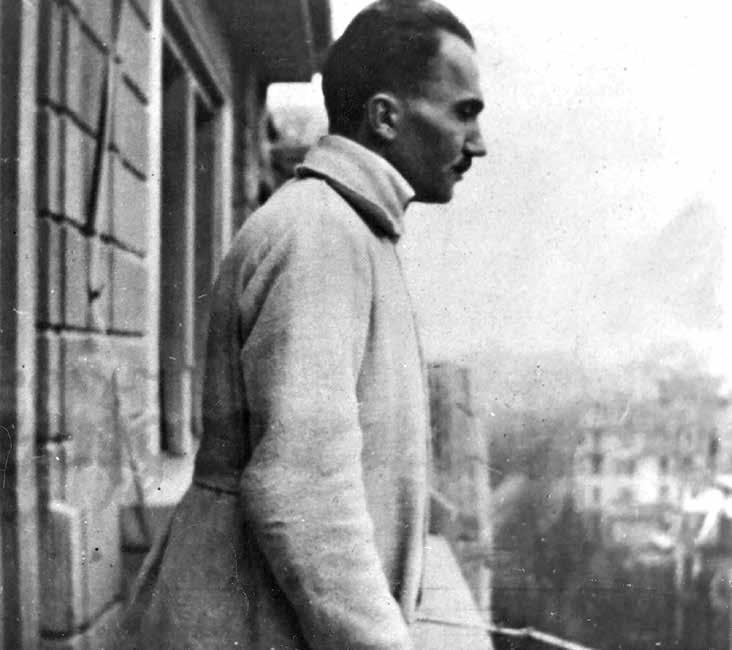
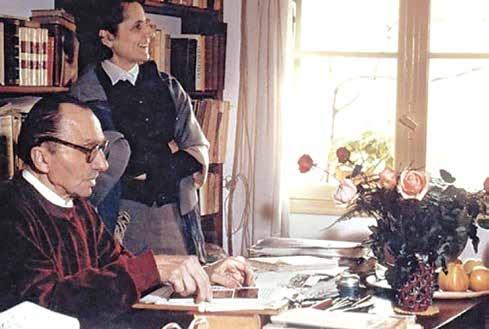
“When I write, my fingers get covered not in ink, but in blood. I think I am nothing more than this: an undaunted soul.”
This is never more evident than in his work The Last Temptation of Christ, which tells Kazantzakis’s personal version of the Biblical story of Christ.
The novel narrates the love and passion of a man: Jesus of Nazareth. The son of a carpenter, this man would love to fall in love with a woman and have a family, but the voice of God explodes in his soul, arming him with the force of more than a thousand armies,
imposing sacrifices and martyrdoms on him. The inner conflict of this man, between flesh and spirit, his rebellious instinct and his irresistible desire to be united with God, emerge here in a narrative mural that glorifies the supreme sacrifice of Christ. On the cross,
GREECE 2023 16 Culture
now dying, Jesus has a vision: what would his life have been like had he not followed God’s call. It is indeed the last temptation, the temptation that Christ rejects by dying for the whole human race. Perhaps one of the most controversial works of all time, Kazantzakis’s work made it onto many lists of banned books and caused the Roman Catholic and Greek Orthodox churches to reach agreement on something for the first time since 1054. Martin Scorsese adapted the book into a 1988 film of the same name, thus reigniting the controversy three decades on.
EXPLORE THE LEGACY OF NIKOS KAZANTZAKIS IN HERAKLION
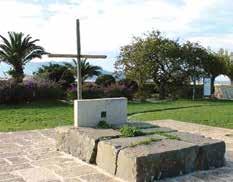
NIKOS KAZANTZAKIS MUSEUM
The Nikos Kazantzakis Museum pays tribute to this important intellectual, author, thinker, philosopher, politician and traveller. Comprising a cluster of buildings in the central square of the historical village of Varvari, today known as Myrtia, the museum’s exhibition is housed on a site formerly occupied by the home of the Anemoyannis family, who were related to Kazantzakis’s father, Kapetan Michalis.
The Museum was founded in 1983 by set and costume designer Yiorgos Anemoyannis, a pioneering figure in Greek theatre. His main aim was to preserve the author’s memory and promote his work and thought. Significant assistance was offered by Eleni Kazantzaki, the author’s second wife.

The museum’s opening ceremony was held on 27th June 1983.
NIKOS KAZANTZAKIS’S GRAVE
Head to the highest point in Heraklion, to Martinengo Bastion atop the Walls of Heraklion, and you’ll find the grave of Nikos Kazantzakis. From here, the view across the city, wide and grey from this vantage point, is juxtaposed by the deep blue of the Mediterranean and the fresh greenery of Mount Juktas to the south. A moment here takes you back to how it is described in the beautiful prose of the opening scenes of Zorba the Greek. Years later, the story of Crete is ever-changing yet forever remains the same. An epitaph is etched upon the grave of Nikos Kazantzakis that seems to
sum up his history here: “I hope for nothing. I fear nothing. I’m free”.
THE ‘K’ SUITE AT LEGACY GASTRO SUITES
The celebration of Nikos Kazantzakis is the heart and soul of the K Suite at the Legacy Gastro Suites in Heraklion. The K Suite is dedicated to Kazantzakis himself, and no detail has been disregarded. From the
chestnut, a wretched little brazier, the sound of the sea. Nothing else.”
spectacular bookcase that frames the bed (with Kazantzakis’s books and the authors who inspired him), to the writing desk next to the wide window overlooks the sea. From here you can cast a gaze over Crete as though through the eyes of Zorbas:
“I felt once more how simple and frugal a thing is happiness: a glass of wine, a roast
The twelve boutique luxury suites at Legacy Gastro honour a sense of grandness and luxury. You feel like royalty as you step into this world of fine dining and opulent furnishings. But the true reason to spend a relaxing break here is to celebrate Crete’s finest creations. The exquisite local gastronomy, and discovering Cretan culture through Nikos Kazantzakis, painter El Greco and poet Vitsentzos Kornaros. This is an experience of Crete like no other, where everything comes together to offer you the best possible way to understand the Cretan culture and nature. His legacy will burn bright as generations still to come fall in love with the works of Nikos Kazantzakis and the Cretan way of life. As you pound the pavement and explore the wonders of Crete, whether it be the scent of indulgent coffee mixed with the freshness of the sea on the breeze, the vibrant colours of paintwork or summer flowers framing every building, or simply the chance to relax on the beach. Remember to seek a little further and sink a little deeper into its history; to cherish the works of incredible personalities, like Nikos Kazantzakis, who have made it what it is today.
GREECE 2023 17
Fanina Popaz, Executive Director of the Hellenic Business Association of Serbia
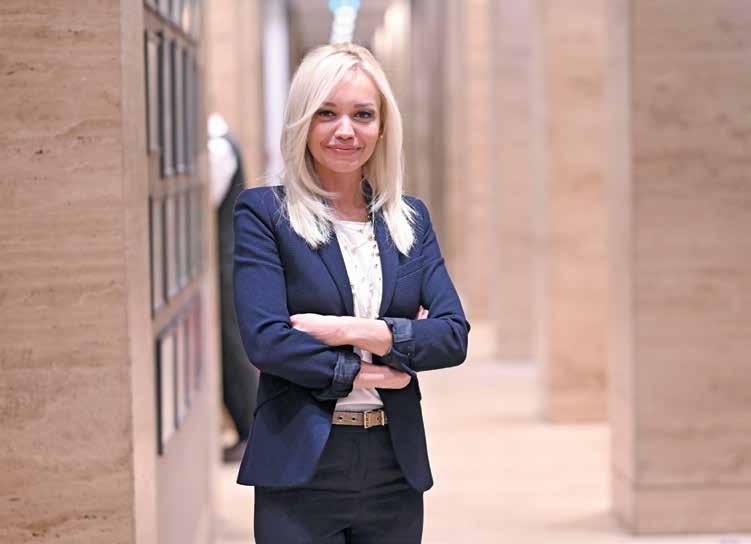
Friendship And Shared Interests
Since its establishment, the Hellenic Business Association of Serbia has been undertaking activities that are aligned with its basic objectives of better connecting the Greek and Serbian markets and improving economic cooperation between the two countries. On the occasion of the 20th anniversary of the inception of this association, we spoke with its executive director, Fanina Popaz, about the economic environment in Serbia, the objectives of the association and its most important activities directed towards helping the membership,
but also the broader investor community and Serbian society as a whole.
What are the most important current interests of the Greek business community in Serbia that your association promotes today?
The interests of the Greek business community relate, first and foremost, to doing business in an environment that’s safe for investment, to unhindered channels of communication with Serbian and Greek institutions, as well as to opportunities for networking and establish-
GREECE 2023 18 Interview
The Hellenic Business Association of Serbia represents very diversified Greek business community in Serbia, and reflects it’s successes in confronting numerous challenges and economic circumstances, in both Serbia and Greece
ing cooperation with domestic and foreign companies in the country. In this sense, the Association acts as a representative of the Greek business community in Serbia and provides its members with full support in the protecting of their business interests.
Are you satisfied with the quality of dialogue between the HBA and Serbian institutions?
Bilateral business associations represent not only the interests of foreign investors, but also those of the local private sector in the country, and in that sense maintaining an open dialogue with the Government is important to the further improvement of both the business climate and the investment environment. Our cooperation to date with representatives of Serbian institutions has proven successful, given that they’ve always shown a readiness to provide us with answers to questions related to the operations of our member companies, as well as supporting us and participating in the organisation of joint gatherings. We have developed cooperation with all bilateral business associations and chambers of commerce in the country, which enables Greek companies to exchange contacts and network with both local and foreign companies.
The Association also implements humanitarian initiatives. What activities did you organise in the previous period?
During the first two months of the year, two initiatives of a humanitarian and donation nature were implemented.
With the support of our members, we organised a humanitarian lottery on Christmas Eve for the second consecutive year. The money collected through this year’s lottery was donated to the “Always With Children” Association of Citizens for the Struggle against Childhood Cancer. We are very proud of this initiative, given that our members thereby, through this joint action, demonstrate their social responsibility and their awareness of the need to donate and help. The following month saw the Hellenic Business Association of Serbia award scholarships to study the Greek language to students of the University of Belgrade Faculty of Orthodox Theology. We are also implementing this initiative for the second consecutive year, in cooperation with the Hellenic Foundation for Culture and with
the blessing of His Holiness Serbian Patriarch Porfirije, with the aim of promoting the Greek language and culture, but also strengthening and improving cultural and spiritual ties between Greece and Serbia.
From the perspective of existing and potential Greek investors in Serbia, which sectors in our country are the most attractive for investment?
Greek economic interests in Serbia are developed in numerous areas of business, such as the hotel industry, construction, banking, the cement and sugar industries, the sector of petroleum trade, the production of construction materials and aluminium profiles, food and beverage retail, the service sector etc. Greek companies have always shown an interest in investing in the countries of the Western Balkans, including Serbia, as a
shared interests of Greek businesspeople in the country, who decided over the course of 2003 to construct a platform for connecting, supporting and promoting the presence of Greek investments in the country. The Greek business community in Serbia is interconnected and really strives to provide selfless support to all its representatives, while some of the Greek businesspeople who participated in the founding of the Association 20 years ago remain active members today. Over previous years, the Hellenic Business Association of Serbia has affirmed itself as a key player in connecting the Greek and Serbian economies and today addresses official institutions in both countries on behalf of the interests of its members. Thanks to the strong support of its member companies, the HBA promotes not only economic links, but also social and cultural ties between Serbia and Greece. Apart from that, the HBA represents very diversified Greek business community in Serbia, and reflects it’s successes in confronting numerous challenges and economic circumstances, in both Serbia and Greece. The Hellenic Business Association of Serbia is developing constantly, as it adapts its activities and priorities to match the needs of its members and the market under the given economic circumstances.
What will your work prioritise moving forward in 2023?
country with which they share - apart from common economic interests – very good bilateral relations and traditionally friendly ties. Under economic circumstances in which the economic and investment plan for the Western Balkans is being implemented actively, and in which the Green Agenda plays a significant role, Greek companies that possess expertise in the field of renewable energy could play a significant role in the further implementation of RES.
Observing the HBA’s work over the past two decades, what would you highlight as being the Association’s most important strengths?
The Hellenic Business Association of Serbia was founded on pillars of friendship and the
Throughout 2023, we will continue supporting the operations of our members, in communication with institutions, expanding our network of contacts with local and foreign companies in the country, but also by promoting their products and services through internal channels of communication. Our activities will encompass the organising of training courses and workshops for middle and top management, Speed Business Meetings with colleagues from other bilateral chambers, visits to the production plants of our member companies, as well as traditional annual events like the Vasilopita Cutting event, Summer Cocktail Party and Humanitarian Christmas Dinner. This year’s central event will certainly be the celebration of the 20th anniversary of the work of the Association, which we believe will present the Greek economy’s business, size and diversity in Serbia in an appropriate way.
GREECE 2023 19
The Hellenic Business Association of Serbia was founded on pillars of friendship and the shared interests of Greek businesspeople in the country, who decided over the course of 2003 to construct a platform for connecting, supporting and promoting Greek investments in the country
AnniversaryYear
The Hellenic Business Association of Serbia – a private, non-governmental, non-profit association of the Greek business community in Serbia – will be celebrating the first 20 years of operations in December of this year. HBA Serbia’s member companies represent Greek economic interests and are present in almost all sectors of business
Since its establishment back in December 2003, the Hellenic Business Association of Serbia, HBA, has remained committed to its basic goals, which include representing the interests of the Greek business community in Serbia, strengthening and promoting
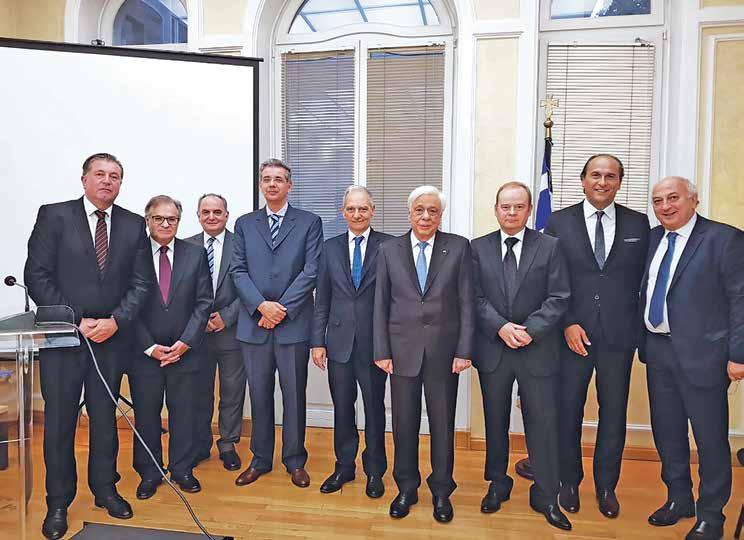
economic ties between Greece and Serbia, and promoting business connections between member companies and other stakeholders in Serbian entrepreneurship.
HBA member companies represent Greek economic interests in the broadest possible sense and are present in almost
all sectors of business – the hotel and construction industries, the cement and sugar industries, the petroleum trade sector, the production of construction materials and aluminium profiles, food and beverage retail, the banking and service sectors etc.
GREECE 2023 20
Activities
The Hellenic Business Association (HBA)
STRENGTHENING BUSINESS TIES AND SOCIAL LINKS BETWEEN GREEK BUSINESSPEOPLE IN SERBIA


The HBA organises various events in Serbia with the aim of connecting members of the Greek business community in the country. The HBA’s central event is the

Vasilopita Cutting ceremony, which traditionally marks the start of a successful business year in the Greek business world. Other traditional HBA events include the Christmas dinner, at which the Association organises a humanitarian lottery, with the money collected donated to one of the
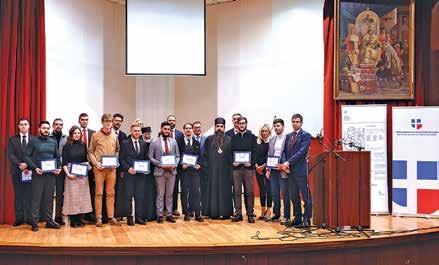
humanitarian organisations in Serbia. Another regular annual event that has been organised for the past seven years is the Greek Weekend, a three-day excursion for members of the Greek community and their families to get acquainted and establish cooperation. Moreover, members have

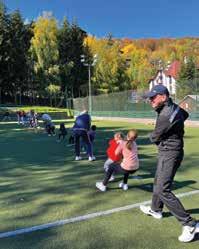
GREECE 2023 21
an opportunity to meet with representatives of the HBA Board of Directors in an informal atmosphere every first Sunday of each month, thus strengthening social and business ties within the community. Apart from this, the HBA also organises an annual summer gathering for members, as well as a special event for representatives of leading Greek companies at the Greek ambassadorial residence, organised in cooperation with the Greek ambassador.
EDUCATING MEMBERS, FORGING CONNECTIONS AND IMPROVING COOPERATION
The HBA cooperates with similar bilateral associations and chambers of commerce through the organising of joint events, with the aim of promoting networking between
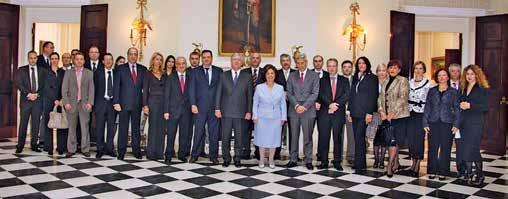

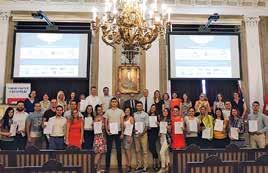

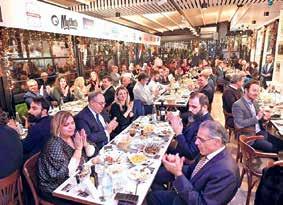
Greek companies and local and international companies. Good examples of this cooperation are Speed Business Meetings, International Networking Cocktail Parties and International Coffee Breaks held within the scope of the Kopaonik Business Forum. The Association also regularly organises seminars and workshops for middle and top management aimed at educating members. These sector-specific events have the goal of educating and exchanging business information regarding current topics related to the legal, accounting, IT, HR, marketing and other sectors. The HBA also supports initiatives that contribute to interconnecting Greek companies in the region. A member of the Union of Greek Business Associations in Southeast Europe, HBA Serbia recently signed a Memorandum of Cooperation with
Hellenic Business Associations in Albania and North Macedonia, under the auspices of the Open Balkan initiative.
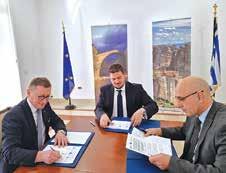
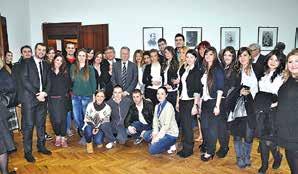
SUPPORTING EDUCATION AND CULTURAL EXCHANGES
The HBA promotes the CSR aspect of Greek companies’ operations, cultural and historical ties between Serbia and Greece, as well as the Greek language and culture. Testifying to this aspect of its work is the fact that the HBA participated in the organisation of the “Greek Weekend” event in Belgrade during the period from 2016 to 2019, which had the goal of promoting Greek culture, music, cuisine and tourist offers, as well as improving the already traditionally good relations between Serbia and Greece. Demonstrating that the support of HBA member companies to ed-
GREECE 2023 22
Activities
ucation in Serbia can be more than tangible came in 2013, when these companies carried out construction works and donated essential equipment for the work of the multimedia lecture hall of the Department of Neohellenic Studies at the University of Belgrade Faculty of Philology. For five consecutive years, the HBA organised a three-month student work placement internship under the name “Greek initiative to work experience”, in cooperation with the University of Belgrade and under the patronage of the Embassy of Greece in Belgrade, with the aim of promoting member companies and the professional development of students, furthering their connection with the labour market and networking within the Greek business community in Serbia. In cooperation with the Hellenic Foundation for Culture and under the patronage of the
Serbian Orthodox Church, the HBA awards scholarships for Greek language studies to students of the University of Belgrade Faculty of Orthodox Theology with the aim of strengthening cultural and spiritual ties between Greece and Serbia.
PRESENTING THE COMMON STANCES OF GREEK BUSINESS LEADERS TO THE AUTHORITIES AND INSTITUTIONS

The HBA has had opportunities to meet with numerous representatives of the Greek government and institutions during their official visits to Belgrade, with these meetings enabling the presenting of Serbia’s economic environment and the current business activities of Greek companies operating in the country. Over previous years, with the support of the Greek Embassy in Belgrade, the HBA has met
The Hellenic Business Association of Serbia organises numerous activities aimed at strengthening economic and social ties between Greece businesspeople in Serbia and their networking with other stakeholders in the Serbian economy

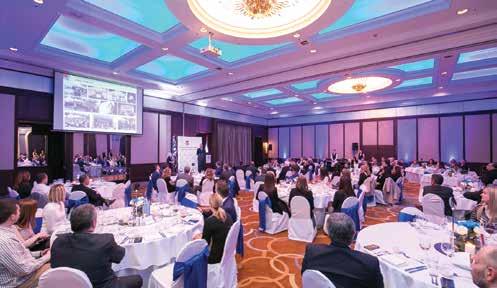
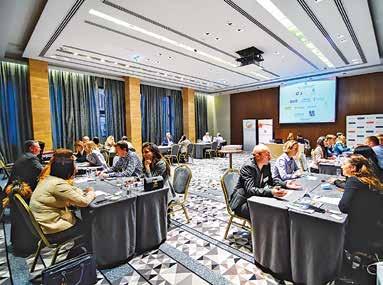
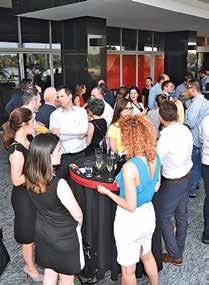
with Greek Prime Minister Kyriakos Mitsotakis, former Prime Minister Alexis Tsipras, Foreign Minister Nikolaos Dendias, former President of Greece Prokopis Pavlopoulos and many others. The HBA also cooperates actively with Serbian ministries and institutions, via the implementation of initiatives linked to improving the business environment, but also through the organisation of joint events.
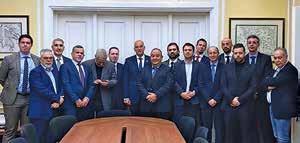
GREECE 2023 23


EDUCATION
EXPLORING THE FUTURE OF ACADEMIA
04 Branko Ružić, Serbian Minister of Education
WE’RE AWAITED BY MAJOR INVESTMENTS IN HIGHER EDUCATION
08 Professor Vladan Đokić Ph.D, Rector of the University of Belgrade STRIVING FOR EXCELLENCE
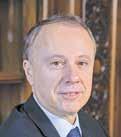

14
Authored by Dr Jimena Zalba, ISB Primary School Principal LEARNERS AS LEADERS
16 Gareth Evans, Head of the BIS Primary School
CHILDREN LEARN THROUGH EXPLORATION
12
Vladimir Popović Ph.D., Dean of the University of Belgrade Faculty of Mechanical Engineering THIS IS THE AGE OF ENGINEERING



17 Jarrod Gaines, Head of the BIS Secondary School
THE STUDENT VOICE IS VERY IMPORTANT TO BIS

Education 2023 2 Contents
18 Chartwell International School WHERE STUDENTS THRIVE

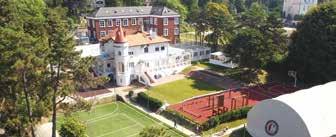
20
Olivera Gvozdenov, Director, Ernst Klett Präsenzlernen Osteuropa
GmbH – Belgrade Branch
OUR FIRST 5 YEARS!
24 Goran Janković, CEO at Inmold SECURING A BETTER FUTURE FOR YOUNGSTERS

26 Magdalena Jugović, co-founder of KUB
LEARN THE LANGUAGE AND GET TO KNOW THE COUNTRY
22 Mina Lepšanović, English & French Neurolanguage Coach® LIBERATING LANGUAGE LEARNING

27
CIKLOTRON 1.0 - WHEN KNOWLEDGE MEETS ABILITY

23 Rajka Šinik Vulić, Director, RBS MBA COMPETITIVE SKILLS FOR A CHANGING WORLD


28 Education in Finland EDUCATION FOR THE FUTURE

Education 2023 3
We'reAwaitedByMajor Investments In Higher Education

Serbia’s educational process is under constant modernisation, which is testified to by the series of reforms that are being implemented by the Ministry of Education with the intention of providing school pupils and university students with high-quality educational content that’s aligned with the needs of the labour market. At the same time, this education is inclusive, as evidenced by the increasing participation of children from vulnerable groups in the educational process, says Serbian Education Minister Branko Ružić.
There are 850,000 people in Serbia who haven’t completed primary school, while
every fifth citizen lacks a high school diploma. In a situation that sees Serbia increasingly lacking a trained workforce, how can these people be included in the educational process, and subsequently in the labour market?
There is an existing system of schools, institutions, including more than 450 of them nationwide across Serbia, where adults can also be educated and can, through lifelong learning, acquire the competencies and qualifications required for their personal and professional development, work and employment.
People aged over 17 can complete primary and secondary school in accordance with special programmes for adults, with a range of pro-
grammes available for additional qualification and retraining, and no costs are applicable for those acquiring primary education and their first profession. Considering how important it is for any adult completing primary school to also acquire some qualification and skill, a new programme has been introduced that enables people aged over 15 to complete primary school over the course of three years and to also, in parallel with their completion of the third cycle (7th and 8th grade), attend a training programme for an occupational profile required by the labour market.
A novelty was introduced as of 2021 with the establishing of a system that recognises previous learning. Through this procedure, knowledge and skills that have been acquired through various training courses, life experience and work practise are recognised, evaluated and acknowledged, with the issuance of either a confirmation notice showing the acquired competences or a certificate confirming the qualification acquired. During the 2019 to 2021 period, almost 36,000 mature students traversed the adult education system, completing primary or secondary school and obtaining a qualification. Given that the adult education system is advancing and new opportunities are being created for lifelong learning, I believe the statistics from the latest census will also highlight these positive trends.
Education 2023 4
Branko Ružić, Serbian Minister of Education
The educational process fully adheres to the requirements set before it by the process of transforming Serbian society into a modern society with a knowledge-based economy
Interview
INVESTMENT TRANSPARENCY SUCCESS
We are awaited by significant investments in higher education infrastructure the likes of which haven’t been seen in the last 30 years
To what extent do educational programmes in secondary and higher education converge with other public policies, such as the Smart Specialisation Strategy Serbia?
In the process of transforming Serbia into a modern society with a knowledge-based economy, it is essential to incentivise the development of innovations within the scope of innovative private companies and other organisations, but it is also equally important to enable the acquiring of the required entrepreneurial knowledge and skills within our education system and to enable them to be valued on the market through innovative products and services that are competitive on the world market and produced in Serbia.
Serbian education is oriented towards innovation and entrepreneurship, preparing future labour market participants to engage in modern business flows and continue activities launched through science and technology parks or innovative startups, as well as equipping them to successfully utilise state and international funds intended to develop the knowledge-based economy. As an example, for 2020 and 2021, we allocated 20 million dinars for the financing of 41 projects aimed at improving and developing the curriculum at higher education institutions with a focus on developing entrepreneurial skills and improving cooperation with the economy.
The Unified Education Information System (JISP) was established recently. How will the Ministry use the available data to make further improvements to the education process and monitor the outcomes of educating pupils?
When it comes to education, the Unified Education Information System represents the foundations of the modernisation of management. It enables decision-making on the basis of relevant information, the rationalisation of funding and the reducing of the administrative burden for all personnel
Introducing the Unified Education Information System will make it simple to search data related to the education system
employed in the education and training system. This system also enables transparency. One example is the Open Data Portal, which is actually a “showcase” for the Unified Education Information System. Thanks to this portal, every citizen, researcher, journalist, or anyone else, will be able to search data simply and glean statistics related to the education system. On the other side, parents will be able to access information about schools individually – about the languages studied and educational profiles offered, which will mean a lot to them when it comes to making those important life decisions
In the last ten years, for the first time, we’ve seen the inclusion of children aged up to three in preschool and primary education, by approximately 34 per cent
functional knowledge, which shows what the pupil will be capable of doing, undertaking, performing and accomplishing thanks to the knowledge, attitudes and skills they’ve built up and developed during their studies on a specific subject.
It is too early to talk about results and effects at this juncture, but analysis will certainly be conducted and the programme will be further harmonised with new requirements and standards, because education isn’t an isolated island and, as such, is dependent on broader social changes and requirements.
To what extent are children aged up to three included in preschool education programmes? How much has Serbia progressed in this area?
like enrolment in primary and secondary schools. It is important to emphasise that this system does not track pupils individually, i.e., nobody accessing this system will be able to see data related to any individual pupil/ student. This system offers summarised data and statistics at the system level, as well as basic information about schools and what they offer.
The comprehensive reform of the curricula in primary school grades began in 2017 and concluded at the end of the 2021/2022 academic year. What are the key results of that reform?
The comprehensive reform of curricula in primary school grades began in 2017 with the introduction of new compulsory subjects. It firstly introduced a new teaching concept for programmes oriented towards the learning process and outcomes, i.e., towards pupils’
Measures and activities carried out in previous years resulted in us having, for the first time, in the last ten years, the inclusion of children aged up to three in preschool and primary education, by approximately 34 per cent. Our strategic objective is for this percentage to be even higher. That’s why we currently have major infrastructure investments in the construction and extension of nursery schools across the whole of Serbia, with which we are – with the support of the World Bank – securing an additional 11,000 places for youngsters.
How inclusive is education in Serbia if we measure that, for example, on the basis of results in the area of support for the early education of Roma children and access to primary and secondary education?
The Serbian education system is inclusive in all segments. There is a constant increase in the number of pupils exercising their right to an individual education plan that is unique for each of the 17,000 pupils currently enrolled in primary schools. There is also growing inclusion of pupils with developmental and physical disabilities in secondary schools, where they acquire skills that qualify them
Education 2023 5
Serbian education is oriented towards innovation and entrepreneurship, and will equip future labour market participants to readily await the demands placed before them by the knowledge-based economy
Branko Ružić, Serbian Minister of Education
for the labour market. There is also an increased number of personal assistants, with this service being utilised by over 1,800 children with developmental and physical disabilities, while pupils are also supported by 260 teaching assistants in schools. Free and adapted textbooks are provided each academic year for primary school pupils belonging to vulnerable groups.
Significant progress has also been achieved in terms of supporting the schooling of Roma children through the securing of scholarships, affirmative action measures for enrolment in secondary school and advanced support for pupils transitioning from primary to secondary education, as well as mentoring support. Approximately 85 per cent of Roma children today enrol in primary school, while 80 per cent of them attend the preparatory preschool programme, which marks a 15 per cent increase. The rate at which Roma pupils transition to secondary school stands at 52.6%, while 61 per cent of them completed secondary education, which is an increase of 20 per cent.
Preventing children from dropping out of school remains one of the Ministry of Education’s priorities, as well as recognising children who are potentially at risk of dropping out of the education system, with the aim of providing timely and adequate support to children and their families.
Considering the economic growth slowdown and reduced budget revenues, will it be possible to implement the investments envisaged in higher education at the same pace as before?
It is important to maintain synergy between the state and university in order to together improve the system, preserve the quality of education and make it available to every citizen. Due to this strategic commitment, we have ahead of us significant investments in higher education infrastructure. Some university colleges – like the Faculty of Music, Faculty of Geography and Faculty of Security Studies –will have their own buildings for the first time. We will also invest in expanding the capacity of student dormitories and improving their conditions. The plan is to expand the capacities of student centres in Belgrade and Niš by an additional 1,400 places. This will be an investment in university infrastructure the
likes of which haven’t been seen in the last 30 years. The funding for these investments has already been secured. It is our task to prepare these projects for implementation, secure
higher education. The education system’s diversity is most evident at the level of secondary education, where a large number of different courses are already available at
Preventing children from dropping out of school remains one of the Ministry of Education’s priorities, as well as recognising children potentially at risk of dropping out of the education system
project design and technical documentation, resolve property rights relations, acquire all permits and ensure implementation unfolds without problems.
The International Baccalaureate Diploma Programme was introduced two years ago and is being implemented by three gymnasium high schools in Serbia. Given the existing interest among pupils, do you intend to expand the number of schools where it’s possible to earn a diploma in this way?
Another characteristic of the Serbian education system is its diversity and variety, i.e., the options and opportunities available to pupils/students when it comes to education for future professions or further/
the high school education level. Alongside traditional general, social and mathematical courses, our gymnasium high schools also offer bilingual teaching in Serbian and another five foreign languages, while there are also specialised gymnasium high schools and departments for gifted youngsters who are interested in eight fields – from mathematics, biology, chemistry and linguistics to IT. The International Baccalaureate Diploma Programme was introduced to Serbia two years ago and is implemented at three gymnasium high schools. It is specific, conducted in English, and enables our children to complete a programme that provides a diploma recognised by the world’s most prestigious universities. Our pupils, at all three of these schools, took the diploma exam last year, together with their peers from other countries. They all passed and achieved results that exceed the world average, while all of them – with the exception of one student – continued their schooling in Serbia. The Ministry monitors interest among pupils who apply for these departments and take the entrance exam, and the number of departments is currently sufficient.

Education 2023 6 Interview

Striving For Excellence
The demand for experts who are highly qualified and socially engaged is increasing in accordance with the numerous global challenges confronting society as a whole. That’s why the University of Belgrade is expected to be an active, creative and impartial visionary
Given that the University of Belgrade is preparing to celebrate its 215th anniversary, our aim in this interview with Professor Vladan Đokić Ph.D., Rector of the University of Belgrade, was to shed light on successes, changes and plans for the University’s further development.

The University of Belgrade was once again represented on the prestigious Shanghai Ranking list, The Academic Ranking of World Universities, last year. How difficult is it to maintain such a high position today?
Universities have to strive constantly to raise their reputation and status. World ranking positions are certainly one of the most important
indicators of that status, but not the only one. There are various charts around the world that rank universities. The Shanghai Ranking somehow imposed itself as the most visible, which is why many also consider it the most important. On that list, the University of Belgrade is currently ranked in the top 400-500 places, which is a better result than last year. I would like to emphasise that the indicators that form the basis of this chart are extremely unfavourable for the University of Belgrade, and that possibilities for us to influence it are very limited. That ranking is formed on the basis of six categories, two of which (number of Nobel laureates and winners of the Fields Medal among the University’s alumni or faculty members) are completely beyond our
reach. Under such circumstances, and also taking into account the dynamic development of the performances of higher education institutions in the most economically developed countries, the position of the University of Belgrade is relatively stable, despite the less favourable conditions for conducting scientific research activities. With the aim of maintaining and improving the position of the University of Belgrade in the Shanghai Ranking, it is essential for there to be greater and more systematic investment, but there is also a need to improve specific fields like the development and strengthening of the alumni network, encouraging international collaborations, establishing postdoctoral positions, establishing joint master’s programmes and
Education 2023 8
Interview
Professor Vladan Đokić Ph.D., Rector of the University of Belgrade
JUBILEE PARTNERSHIPS PRINCIPLES
We are commemorating a major anniversary… We are preparing a monograph, a documentary film, exhibitions, working and celebratory gatherings with which we’ll mark the most important events in the University’s history
increasing the number of scientific projects. In order to influence an increase in the number of papers published in leading international journals and increased citations of researchers, it is necessary to provide those who contribute the most with certain benefits: financial, academic and media-based.
In the University’s 215-year history, what would highlight as the greatest successes when it comes to the position of the University of Belgrade on the map of world universities?
There are many of them; almost a day doesn’t go by without us publishing news about some new one, but they mustn’t cause us to relax. The future development of the University of Belgrade faces numerous challenges. Higher education plays a unique role in creating a sustainable framework for modern society. The demand for experts who are highly qualified and socially engaged is increasing in accordance with the numerous global challenges confronting society as a whole. That’s why the University of Belgrade is expected to look to the future and to be an active, creative and impartial visionary, to advance its role as a pioneer of knowledge-based initiatives; to continue advocating for the continuous incentivising of academic independence, to provide an environment of equal opportunities and fair treatment for everyone, regardless of vocation, age, ethnicity and gender.
Which moments in history would you single out as having shaped the University’s current structure, standards and scope?
This is a major anniversary, and we have something to celebrate. To commemorate the 215th anniversary of the founding of the University of Belgrade, we are preparing a series of activities aimed at creating a permanent record of the role of its members and individuals in the academic community and society. In respecting the role, but also the importance of the institution we repre-
Over the previous year, the University developed and strengthened numerous strategic partnerships with renowned universities and institutions, both in European and Asian countries
sent, we decided to mark the anniversary by compiling a lasting record of its history of success, changes and constant growth. We are preparing a monograph, a documentary film, exhibitions, working and celebratory gatherings. Through these projects, we will compile a selection of those moments that created and shaped the University, and you’ll see everything this coming September.
We are bearing witness to the fact that, following a great wave of exceptional specialisation, interest in multidisciplinary approaches and multidisciplinary study programmes is today on the rise. How does our University, together with its members, adapt to these trends?
The University of Belgrade is working on a Platform linked to the legal, academic and material aspects of financing higher education institutions, which should serve as a preliminary document for discussions with representatives of the Government of Serbia on a model that would secure stable and adequate financing
The University of Belgrade will in future continue advocating for the continuous incentivising of academic independence and the creating of an environment of equal opportunities and fair treatment for everyone
conducting of scientific research work. In the context of defining public interest and actions carried out beyond the framework of the University, it is important to highlight the constituting of the Environmental Protection Committee of the University of Belgrade, which has the role of indicating the importance of environmental protection and improvement from a professional perspective.
Alongside the exceptionally high standard of the educational process, which is testified to by the number of current and graduate students at various levels of study, our University is also recognisable for its outstanding results in scientific research work, intensive cooperation with business and the leading domestic and international institutions. Likewise, the special importance of the development of faculties and institutes is reflected in the creating of new opportunities for students aimed at building the capacities of young researchers and staff, i.e., enabling students at all levels to get acquainted and receive training in the
Digitalisation has long since become a process that encompasses all parts of society. How do these processes impact the functioning of the University in an organisational and educational sense? Digitalisation proved crucial during the period of the pandemic. After more than two years, classes were relaunched in practise rooms and amphitheatres at full capacity. Prior to the outbreak of the pandemic, the majority of teachers and students had no experience of remote learning, nor with different pedagogical approaches to this method of teaching. Although the University of Belgrade positioned itself very well in the new conditions, thanks to its previous experience and efforts in the implementation of the digitalisation process, I would emphasise the fact that the results of exams and the passing rate of the last school year, which was conducted completely in accordance with the combined model of teaching, didn’t differ much compared to previous years. My opinion is that the lack of in-person teaching will not have an impact on students’ knowledge, considering that their potential to acquire knowledge is huge and they are adaptable to specific contemporary circumstances. What concerns me is the social aspect of their two-year absence from the classroom, the consequences of which we will only be able to see after a certain amount of time has passed.
How well equipped are our faculties today and can they provide students with knowledge in some of the areas that are developing rapidly, such as the faculties gathered at the future BIO4 campus?
Education 2023 9
The key lies in stable and adequate financing. The University of Belgrade is working on a Platform linked to the legal, academic and material aspects of financing higher education institutions, which should serve as a preliminary document for discussions with representatives of the Government of Serbia, in order to devise a comprehensive solution for financing higher education. I hope that the state will have understanding and that in the next two years, as partners, we will find an adequate financing model that will be applicable consistently.
This year marks the culmination of the first experimental cycle of the work of Circle U, the European University Alliance. How are the University of Belgrade’s experiences of this initiative?
On the partnership, dialogue and networking front, the University has developed and strengthened numerous strategic partnerships with reputable universities and institutions over the previous year. Belgrade hosted the Rector’s Forum of Southeast Europe and the Western Balkans, which brought together rectors from 23 of the region’s universities. A partnership agreement was signed at Prague’s Charles University between the League of European Research Universities (LERU) and the seven Central European universities, CE7, of which the University of Belgrade is a member. This agreement aims to enable support for common interests at the national and European level. Within the European framework, an application is being prepared for a new call to the European Commission under the scope of the Circle U alliance programme, which was formed in the context of the Initiative of European Universities and the Development of European Interuniversity Campuses that’s being implemented by the European Commission. This alliance connects nine European universities that work together to encourage new models of university cooperation and partnership, and to address priority topics and challenges like climate change, democracy and public health. This cooperation is extremely important and useful to us, but a series of additional cooperation agreements have been signed over the previous year with several Asian universities, which form the
a series of tangible proposals, solutions and decisions, we work continuously on retaining the best at the University of Belgrade or, which isn’t so rare, repatriating those who’ve left. The process is long, just as the problem emerged over multiple decades
basis to provide opportunities for new dimensions of intercultural cooperation. This all demonstrates the interest among numerous partners in cooperating with our University, as a dignified institution.
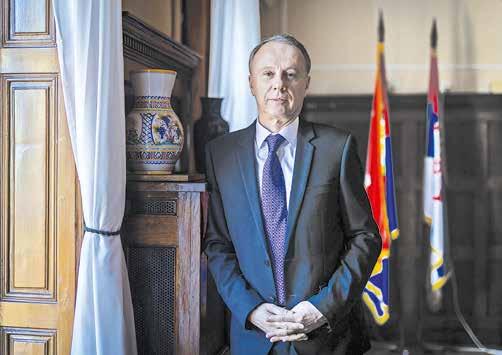
The latest census also showed us that the Serbian population is getting older and the major brain drain is persisting. To what extent do you, at the University, feel the ramifications of these two trends when it comes to new generations of students and staff renewal?
The University is perhaps the national institution where the brain drain is felt the most. Through a series of tangible proposals, solutions and decisions, we work continuously on retaining the best at the University of Belgrade or, which isn’t so rare,
repatriating those who’ve left. The process is long, just as the problem emerged over multiple decades. And that’s why no one, including the University, is able to offer an instant solution. Instead, I will offer my own example. After completing my studies at the University of Belgrade, Faculty of Architecture (1988), I earned my master’s at the University of Southern California, School of Architecture, in Los Angeles (1991). And despite receiving multiple offers for further study and employment beyond the borders of Serbia, I decided to return to Belgrade. And I know that I wasn’t wrong to do so.
A potential increase in the number of highly cited researchers could be made possible by creating positions intended for returnees from abroad, by considering opportunities to engage guest professors, as well as by focusing on areas in which there are chances to achieve the best results. In accordance with that, it could be possible to increase the number of papers published in journals that are indexed in relevant databases by employing more researchers and associates, and by amending the regulations governing the minimum requirements to obtain the title of teacher, in order to optimally combine the differential and cumulative requirements for the number of published papers during the elective period. These could be the first tangible steps.
Education 2023 10 Interview
Through
Professor Vladan Đokić Ph.D., Rector of the University of Belgrade
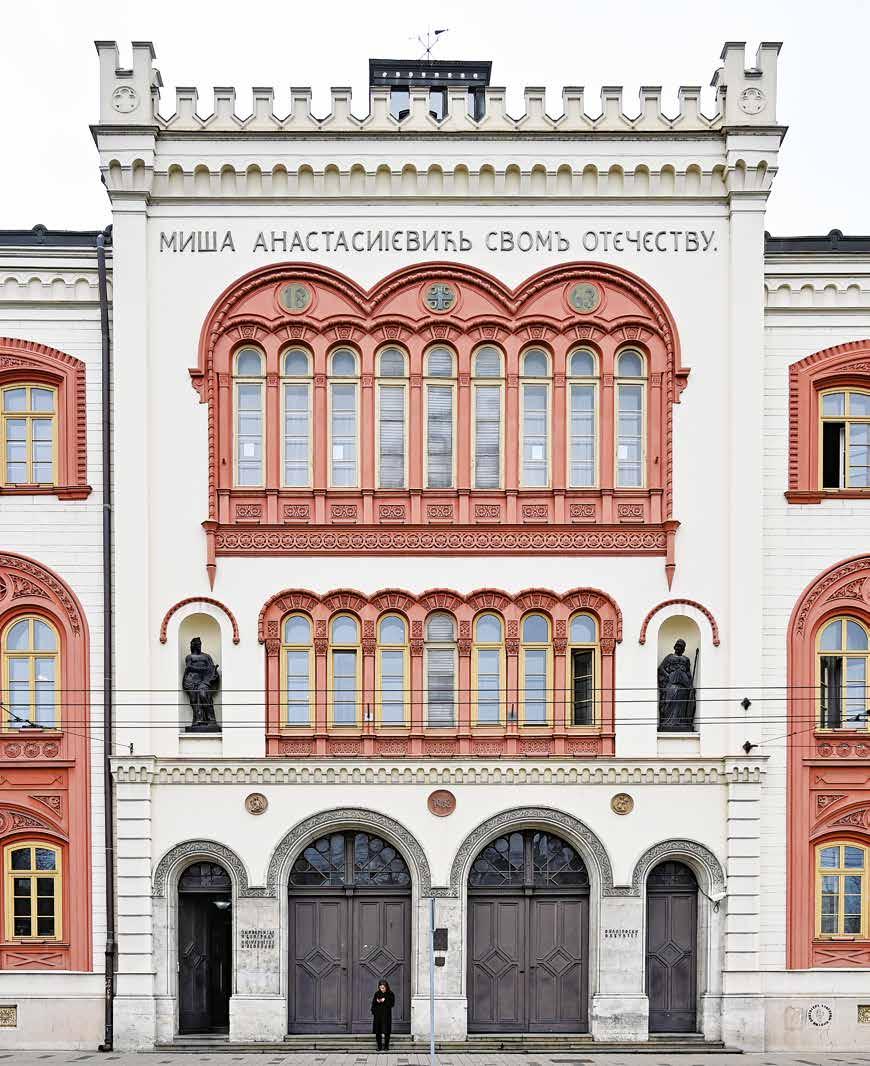
This Is The AgeOfEngineering
One of the country’s most important higher education institutions celebrates its 75th anniversary this year. And it awaits its October birthday with two major national accolades: the Saint Sava Award and the Sretenje Order, which oblige this faculty to continue advancing

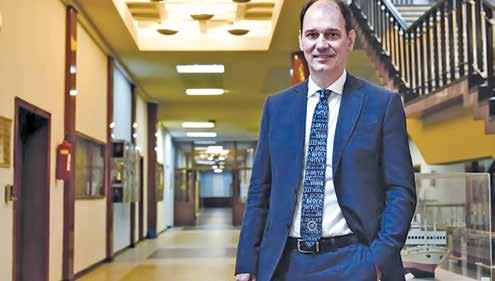
Regardless of its major achievements of the past, the University of Belgrade Faculty of Mechanical Engineering works constantly to improve its existing study programmes, but also to develop new ones. It thus comes as no surprise that it ranks at the very top of all faculties in Serbia, in terms of the percentage of graduates who gain employment and the quality of those jobs.
Although mechanics and machine science have been studied at the University of Belgrade for 150 years, the Faculty of Mechanical Engineering celebrates only its 75th anniversary this October. What kind of results and plans do you have as you await your college’s birthday?
I would firstly like to thank you for your interest in the activities and development of the University of Belgrade Faculty of Mechanical Engineering. We are proud of our tradition and past results, but that’s precisely why, in this year of great jubilees, we must be up to the task in all segments of our work. This is also the first year in the work of the new management team, so it’s normal for new energy to have appeared. The previous year was marked by exceptional interest in enrolling in all of our faculty’s study programmes among students, the continuation of our student teams’ excellent results, particu-
larly the Beoavia team, the continuation of the building of the new identity of the faculty and increased activity on international projects. However, we should always bear in mind that, in a house with a great tradition, nothing either starts or ends with us and that we’re all just
which include a good policy of the state. That increased interest has contributed to raising the quality of newly enrolled students, so the average secondary school grade of our freshmen this year is 4.41, while about 60% of our new students are graduates of gymnasium high schools. We work constantly to improve existing study programmes, but also to develop new ones.
one stage in the development and building of the reputation of our house: the University of Belgrade Faculty of Mechanical Engineering.
Numerous investments in Serbia have led to increased demand for places at your faculty, but these investments aren’t the only reason. Haven’t you also personally contributed a lot to that? Have you changed and adapted to new technologies? Which study programmes are currently in highest demand at the undergraduate level, and which are the most popular at the postgraduate level? Work on this has been continuing for years, but we’ve also been favoured by the circumstances,
We do adapt to the market, but we adapt even more to the development of new technologies. We have just two study programmes at the undergraduate level: Mechanical Engineering (total of 620 places) and Information Technology in Mechanical Engineering (60 places). We have greater interest in this second study programme, calculated on the basis of the number of registered candidates per budgeted place, but the number of places is also small (20). When it comes to the popularity of our study modules (master’s studies), the largest number of students traditionally enroll to study thermal engineering, production engineering, which also includes artificial intelligence, robotics, intelligent technological systems, process engineering, industrial engineering, automated control etc.
Students used to have to beg professors to help them find a job, while today both foreign
Education 2023 12
Vladimir Popović Ph.D., Dean of the University of Belgrade Faculty of Mechanical Engineering
We have outstanding cooperation with all international and local companies operating in our country
and domestic companies approach you with offers of employment for students. That didn’t happen… Was a lot of work done to create that situation?
The main contribution to this was the increase in the offer of high-quality jobs for engineers, as well as continuous increases in earnings, particularly over the last five years. A large number of high-tech companies have established their own development centres in our country, which is crucial to future development. It’s very rare that we receive requests to help one of our students find employment. We have outstanding cooperation with all international and local companies operating in our country, including those which at first glance seem to have little to do with traditional mechanical engineering. This is something we work on constantly, as nothing comes by itself. We rank at the very top of all faculties in the Republic of Serbia, when one includes in the criteria the percentage of graduates who gain employment and the quality of those jobs.
Dual education was introduced to the higher education system recently. Could you tell us about its specificities, its positive sides, and how this education model has proven itself to date?
Every new model has its own advantages and disadvantages, and the dual education model is no exception, which is why it is necessary for a certain amount of application time to pass before one can make final conclusions. Although we do support the inclusion of dual education in the higher education system, we have yet to accredit the study programme in accordance with that system, but we are working intensively with several major companies (ZF, Bosch, Brose) on its development for master’s studies. A specificity is that high-quality teaching must be provided at the university, but in parallel also at companies, as well as interest in a single study programme among a higher number of companies. Students are thereby provided with a wider choice of future jobs.
You recently added the Saint Sava Award and the Sretenje Order to your already rich collection of accolades. You have received a great honour, but one that also brings with it great responsibility to continue on the same path and be even better?


That’s right, receiving two such high awards from one’s country is a great honour, but also a great obligation. I consider that we deserved it due to our work over previous decades, but we are also tasked with progressing further. That’s because this is the only way we can be, as our motto says, “A step ahead of everyone”. Regardless of the great achievements of
the past and a proud tradition, regardless of the countless excellent generations and renowned professors who’ve spread its name around the world, the Faculty of Mechanical Engineering still can, and must, progress. I also believe that today it has new energy, knowledge and enthusiasm to improve many segments of work, in order for our faculty to remain a cornerstone of education and science in the future.
Many secondary school pupils are currently in the process of choosing what to study. Do you have any advice for all of them, especially those considering enrolling in the Faculty of Mechanical Engineering?
The time in which we live is the time of engineering, and that is a fact that’s in our favour. Our generation of professors and this administration are taked with utilisng all these opportunities in the right way. I can say to our future students that enrolling in the Faculty of Mechanical Engineering is the right choice. They will thus enroll in a faculty that will teach them how to think, but that will also provide them with a secure job and good earnings, but also a job in their home country. An extremely small percentage of our graduates have left Serbia over the last few years, which is important for the faculty, but even more important for our country. I believe this is real collateral for the future.
Education 2023 13
Authored by Dr Jimena Zalba, ISB Primary School Principal
Learners As Leaders
learn, how they learn, and why they learn something, students are able to develop skills connected to leadership.
At the International School of Belgrade (ISB), we believe that every student has the capacity to lead. Rooted in this belief, we create conditions and intentionally design learning experiences that nurture, support and promote student leadership.
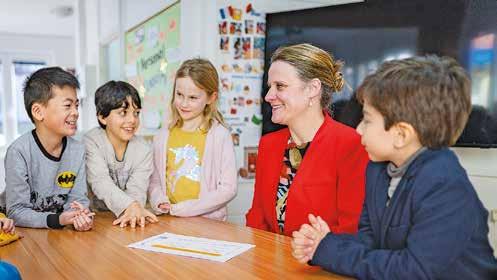
Student leadership refers to the ability of students to lead and influence others, as well as managing their own personal development and growth. This can include taking on roles and responsibilities in their schools, engaging in community service and developing such qualities as communication, collaboration and critical thinking skills. Impactful student leaders are able to inspire and motivate their peers, and create positive change in their schools and communities. At ISB, we are deeply committed to equipping our students with the skills to be compassionate and competent leaders, and to providing them with multiple relevant and age appropriate opportunities to exercise leadership.
ISB offers three of the International Baccalaureate (IB) programmes and central

to these curriculum frameworks are student agency, approaches to learning and a focus on action. These three key components of the IB programmes guide our school in designing experiences for our learners to develop their leadership capacity.
Student agency refers to the ability of students to play an active role in their own learning and development. This involves giving students a voice in the learning process and providing opportunities for them to make choices, set goals, and take responsibility for their own learning outcomes. Student agency helps students become more self-directed and motivated learners, and also promotes a sense of ownership and engagement in their education. By having a say in what they
The ‘Approaches to Learning’, representing a central component of the IB Programmes, provides a structure for ISB’s students to actively develop and practise thinking, research, communication, social skills and self-management skills. These skills are all central to leadership. Through these Approaches to Learning, our students identify and foster healthy relationships, an understanding of shared responsibility, and the ability to collaborate effectively. Connected to these 21st century skills, students regularly engage in learning that is intentionally designed to help them grow in their ability to make informed, reasoned, ethical judgements. Furthermore, our students have opportunities to exercise the flexibility, perseverance and confidence they need to bring about positive change in the wider community and beyond. Hence, the IB Approaches to Learning represent 21st century skills that enable, support and promote our learners’ leadership competency.
At ISB, we also promote student leadership by providing our learners with multiple opportunities to take action. By taking action, ISB learners become responsible and successful changemakers who engage actively with complex real-world issues that they encounter in their school, their community or the world at large. Student-led action projects involve learners considering multiple perspectives, taking informed risks, reflecting on their own learning and experiences, and acting in ways that contribute to their communities. These learning experiences allow our students to explore ideas, pose questions and develop solutions that may have an impact beyond themselves. Our world needs young people to exercise leadership that will make our world a better and more peaceful place.
Education 2023 14 Business
The International School of Belgrade is deeply committed to engaging, inspiring and equipping every student with the skills, knowledge and attitudes required to be leaders who make a difference today and will impact their own future, and that of the world, positively
Impactful student leaders are able to inspire and motivate their peers, and create positive change in their schools and communities
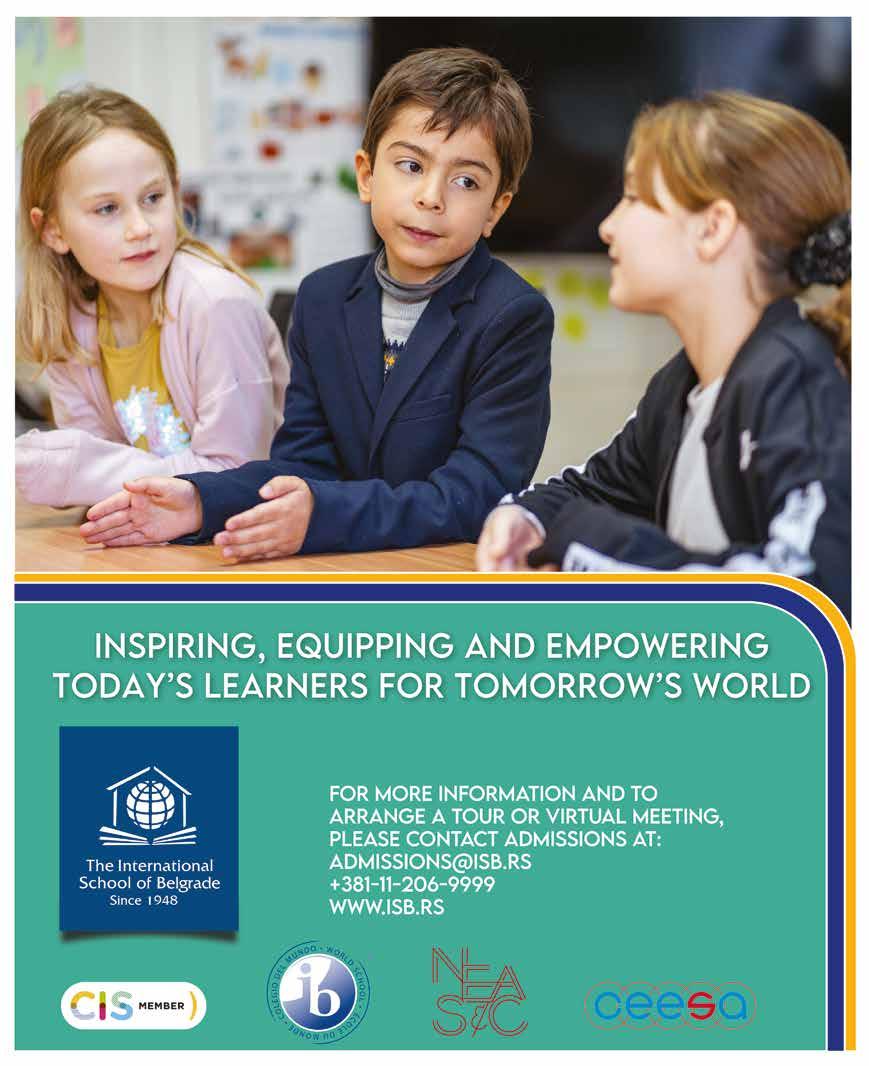
Children Learn ThroughExploration
The British International School teaches pupils from the ages of three to 18, with a teaching approach based on three concepts: children develop best when they are happy, when they feel safe, and when they are confident

enrolment, as we have an excellent English as an Additional Language team. We do ask for support and motivation from the child and their family in order to promote their language development.
You base your teaching approach on three concepts: children develop best when they are happy, when they feel safe and when they are confident. Do your children really learn through exploration, play and practical activities? Yes, children learn best when they are
international context. For example, when studying the Romans, children will learn about this era of Serbian history and much is the same for other subjects. Our three core subjects are English, maths and science, and these are supplemented by the foundation subjects of history, geography, art, design technology and personal and social education. Modern foreign languages, of which children have a choice, physical education and music are taught by specialist teachers. All other subjects are taught by the child’s class teacher.
If parents are looking for the very best education for their child, then they should seriously consider British education - says Gareth Evans, before revealing all the advantages of an education at Belgrade’s British International School.

When do pupils start nursery school; when do they enter primary school and when do they move on to the secondary school? Is it essential for the child to speak English fluently?
Children can start school in the term when they turn three and are independent in their basic needs. The first two years of school are known as the Foundation Stage. Children enter the first year of primary education in the year they turn six. The final year of primary education is the year they turn 11. It is not essential for the child to speak English fluently upon
We follow the National Curriculum for England and adapt it to our Serbian and international context
happy and motivated to come to school, and this is proven by much research. At the British International School, we place a great emphasis on children’s happiness and wellbeing, and ensuring that they feel part of the family. We believe and understand that children learn in a variety of ways – visually, kinaesthetically and auditory – and we use these approaches in our teaching methodology.
You work in small groups, but do the subjects learnt by your primary school pupils differ from those taught in Serbian primary schools?
We follow the National Curriculum for England and adapt it to our Serbian and
The enrolment of first-year pupils will start soon in Serbia. What would you say to parents who don’t want their child to attend a state primary school? Why should they consider enrolling in the British International School?
If parents are looking for the best education for their child, then they should seriously consider British education. Providing children with not only knowledge, the British International School equips children with understanding and skills that they can use in later life. Class sizes are smaller, usually around sixteen, enabling the teacher and teaching assistant to develop closer relationships with the children and to know their learning style much more deeply. This is augmented with a programme of extracurricular clubs and trips and visits, which complement the taught curriculum. Our teachers are native speakers of English who are supported by an outstanding team of local staff, all of whom are fluent in English.
Education 2023 16 Business
Gareth Evans, Head of the BIS Primary School
The Student Voice Is Very Important To BIS
A total of 25 generations of young people have so far graduated from the British International School. Many of them have gone on to enrol in and graduate from universities around the world, achieving excellent academic results. The school is very proud of this fact
The focus at BIS is on providing an engaging and inspirational learning environment and a curriculum that leads to fully-rounded learners. We aim to develop knowledgeable, confident and creative young people who are then able to access the finest learning institutions worldwide. Every year we see dozens of graduates leave BIS and pass the rigorous application process to begin their studies at institutions all over Europe and beyond. It is an immense source of pride that our students are able to make a positive contribution to the wider future society in this way.
Could you explain, as succinctly as possible, the differences between the Serbian curriculum and the British one?
The British Curriculum we teach at BIS
The British Curriculum we teach at BIS is the Cambridge International system. The programmes we teach meet the internationally recognised standard, ISO 9001:2015. - says BIS Secondary School Head Jarrod Gaines, pointing out that Cambridge International is recognised by Ofqual (Office of Qualifications and Examinations Regulation).

Many of your pupils over the 25 years of the school’s operations have go on to enrol in and graduate from universities around the world. You must be very proud...
Our schemes of work from year 7 through to year 13 prepare school students for life, helping them develop an informed curiosity and an enduring passion for learning
is the Cambridge International system. The programmes we teach meet the internationally recognised standard, ISO 9001:2015. Cambridge International is
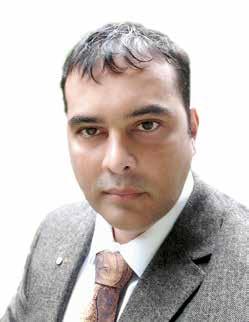
recognised by Ofqual (Office of Qualifications and Examinations Regulation) and its KS4 and KS5 programmes have been further assessed by UK NARIC, which recognises that the provision of education is ‘robust qualifications that are comparable to the standard of UK GCSE and A Level’. Our schemes of work from year 7 through to year 13 prepare school students for life, helping them develop an informed curiosity and an enduring passion for learning.
Leadership is among the main principles of the BIS philosophy. Do you seek to educate future leaders, visionaries; people who will be able to provide a positive contribution to the society of the future?
It is our mission to ensure that all our students excel in all areas, both personally and academically. This means supporting our young people in becoming future leaders in any field they choose to work in. The student voice is very important to us at BIS and it is through these mechanisms that we encourage leadership and nurture our students towards being bold and brave in their approach to life. Students across all year groups are given opportunities to apply their leadership skills via such things as the Duke of Edinburgh Awards, Wellbeing Ambassadors, students council and Model United Nations.
Education 2023 17 Business
Jarrod Gaines, Head of the BIS Secondary School
Where Students Thrive
research and exploring their own interests and talents. Year after year, the school observes how its children flourish, becoming more independent and devoted to their studies, slowly preparing themselves for the first great milestones: taking IGCSE and AS/A level exams. Chartwell offers exam preparation for a full range of subjects, thus enabling its students to successfully complete their secondary education, opening the door to enrolment in the world’s most renowned universities.
Chartwell offers exam preparation for a full range of subjects, thus enabling its students to successfully complete their secondary education, opening the door to enrolment in the world’s most renowned universities.
Chartwell International School prides itself on being one of the longest-standing private schools in Serbia, which has been striving towards distinction and excellence continuously for more than two decades. Situated at the heart of Belgrade, Chartwell comprises six separate campuses divided according to student age and level, each surrounded by greenery and the tranquility of one of Belgrade’s most pleasant uptown areas. Tailored to suit the needs and demands of a particular age group, each of Chartwell’s premises boasts vast indoor and outdoor spaces, with carefully furnished and decorated classrooms, accompanied by spacious playgrounds and sports fields. The school’s main goal is to provide its students with a safe and uplifting learning environment, paving the way for their growth and success.

As a veritable second home to almost 900 children of more than 40 nationalities, Chartwell truly is a unique community. All-en-
compassing, diverse and multicultural, on the one hand, it is simultaneously a school that nurtures equality and tolerance, while promoting mutual support and respect.
Chartwell inspires students to become their best, both academically and socially, while the school’s mission is to make every effort to maintain the highest level of teaching and service provision, worthy of the accreditation awarded to Chartwell by the University of Cambridge, the Serbian Ministry of Education, as well as COBIS, of which the Chartwell International School is a proud member.
The curriculum at the core of Chartwell is based on the British National curriculum, adapted to the global context and taught through an international perspective. It is founded on a cross-curricular approach in which students take an active role in their own learning, conducting
As much as they are pillars of their own academic achievements, Chartwell’s students are supported and their learning scaffolded each step of the way by the school’s most dedicated and experienced teachers. Their goal is never merely to teach a lesson or pass on knowledge, but rather to demonstrate empathy, an ability to adapt their methods and incorporate the most innovative, hands-on strategies that truly make a difference in the classroom. Having small-sized classes further adds to their almost individual approach to teaching, discovering students’ aptitudes and developing their potential.
With an awareness that teaching extends far beyond the classroom and academic programme, Chartwell never shies away from organising extracurricular activities for its students and teachers, from daily outings and theatre or museum visits, to celebrating World Book or UN Day, all with the aim of fortifying the school spirit, friendship and Chartwell’s great family-like atmosphere. The Poetry Night, End of Year Performance or Charity Bazaar are always eagerly anticipated annual events that bring joy to the whole community. Therefore, whether by showing their wit or talent, working hard or having fun, students thrive at Chartwell International School, a place where they forge life-long friendships and a stepping stone to their future career and life success.
Education 2023 18 Chartwell International School Business
As a veritable second home to almost 900 children of more than 40 nationalities, Chartwell truly is a unique community. All-encompassing, diverse and multicultural, on the one hand, it is simultaneously a school that nurtures equality and tolerance, while promoting mutual support and respect
Chartwell’s main goal is to provide students with a safe and uplifting learning environment, paving the way to their growth and success
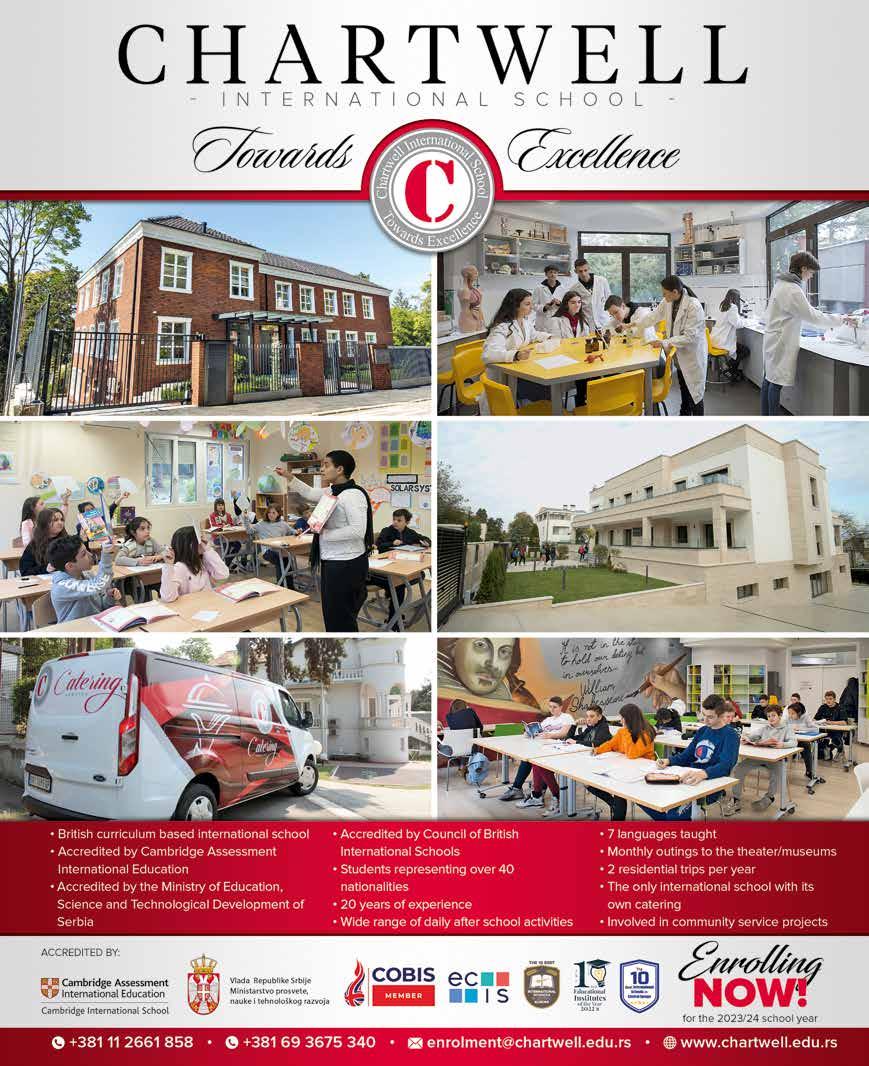
Our First5 years!
Klett EDU training centre was established in Belgrade in 2018, as a branch of Stuttgart’s Ernst Klett Präsenzlernen. Extensive analysis of the skilled labour market was conducted prior to the founding of the centre, with mechatronics singled out as a field requiring education programmes

The biggest compliments for us are our participants’ success stories and their careers progress. Depending on the programmes completed, they are able solve more complex problems, overtake higher responsibilities, support engineers and manage entire production processes - says director Gvozdenov.
Did the fact that there’s a shortage of skilled labour contribute to the Klett EDU Training Centre being established?
There is a lack of qualified workers not only in our country and region, but also throughout Europe.
We help our clients to build teams of profes-
sionals who will better understand the field of mechatronics and work in as operators, tool-setters and maintenance technicians. Klett EDU Training Centre offers an array of programmes to participants of various ages (the youngest participant was 18, while the oldest was 55), with diverse educational and professional experience, who want to improve their skills and knowledge in the field of industrial mechatronics. We collaborate with manufacturing companies, but we are increasingly being contacted by individual participants seeking to obtain an official V-level qualification or to establish contact with potential employers that are our clients.
Is industrial mechatronics still the leading subject in your portfolio? How many participants have so far completed training in the scope of that programme?
Mechatronics is the leader in our portfolio, while the programmes vary in terms of complexity and duration. Three programmes are accredited by the relevant institutions in Serbia. Klett EDU is the initiator of the standard of the V level qualification for Industrial Mechatronic Specialist programme and we will soon enrol the fourth generation of trainees in this programme. Participants are trained to work on system maintenance, author technical documentation, preventatively maintain industrial mechatronic equipment,
Education 2023 20 Business
Olivera Gvozdenov, Director, Ernst Klett Präsenzlernen Osteuropa GmbH – Belgrade Branch
assemble and disassemble machine elements, connect and check pneumatic systems, electrical circuits and components, modify electrical control systems and put into operation new industrial mechatronic equipment.
Lecturers focus on the development of each student individually. We can boast of the fact that more than 400 participants have completed our training programmes successfully to date, despite the two years of Covid and the global economic crisis.
Your training essentially boils down to the applicability of knowledge and skills. Does this mean that your mechatronics technicians, but also other trainees, are ready to start working in companies immediately upon the completion of training?
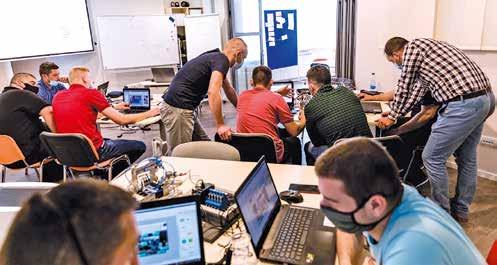
The biggest compliments are the success stories of our participants and their further careers advancement. Depending on the programmes completed, they are able solve more complex problems, overtake higher responsibilities, support engineers and manage entire production processes.
To us, Klett EDU trainees’ development path is very important, which is why we stay in contact with them but also with their directors and managers from production and human resources sectors. From the perspective of the companies, all these success stories represent confirmation of the employer’s values and strong brand, which employees appreciate greatly and happily share with others as an exceptional experience and personal benefit.
Your approach implies working on cutting edge equipment at Klett EDU Training Centre, with the help of top lecturers. Who are the lecturers and how did you form the team?
We are committed to innovation and strive to ensure the work on didactic equipment is as close as possible to contemporary factory facilities, including machine assemblies, electric motors, relays, frequency regulators and sensors. The key to the success of Klett EDU programmes is the team that implements them. It is our pleasure to be able to boast of having a large number of lecturers. There are currently 32 professionals working in the mechatronics team, and they come from the faculties of mechanical engineering and electrical engineering, as well as the School of Electrical and Computer Engineering, while we also have lecturers from manufacturing companies. These are engineers who – through
contact with our team and the education of their colleagues – wanted to become part of the team of lecturers. That’s a great compliment for us!
Our lecturers play a key role in preparing trainees for a career in dynamic industrial mechatronics. Learning through practical work experience, which is what we apply exclusively, is vital to the development of a skill, because it simulates actual situations from a working environment. On the top of it all comes the mentorship, because our entire Klett EDU team
loyalty and referrals from all of them. It has become a rule that, after the first group of participants, our clients continue cooperating with us and enrol the next group of employees. Likewise, after completing the basic level, companies opt to send the most successful participants to a higher level of the programme.
Individuals are the group of self-financed participants who receive good business offers in the manufacturing industry after being certified with V-level qualification.
provides advices and support to participants, helping them to manage challenges and identify solutions to complex problems.
For which companies do you train existing and future employees? Does it happen that some trainees return after completing one programme to enrol in the next?
Our clients believe that investing in employee knowledge is an investment that increases productivity. We are very happy that companies choosing to educate their employees through Klett EDU programmes include: Toyo Tires, Coca Cola, PepsiCo Marbo, Grundfos, Gruner, Brose, Imlek, Atlantic Grupa, PharmaNova, ZF, Neoplanta, Elrad, Nectar and Tarkett, among others. All these companies see immediate results and we receive positive feedback,
We are delighted to be able to confirm that interest in Klett EDU programmes among individual participants is also increasing significantly.
What are your plans moving forward?
We have lots of plans for the future, like expanding the offer of programmes in response to client demand, expanding operations for and on other markets, cooperating with partners with the idea of training as many potential employees as possible for operational level positions in Serbia and for interested companies from other markets.
The vision that we established as the first training centre start-up in our company, is to create value in Serbia through education of both existing and new employees in the field of mechatronics.
Our enthusiasm wouldn’t be at such a high level, without the support of our directors from the parent company in Stuttgart. Our first five years represent an exciting journey on which we’ve been confronted by many challenges, and I can proudly say that we’ve exceeded our own expectations. Klett EDU team has achieved excellent results and we look forward to the new important things to come.
Education 2023 21
Learning through practical work experience is vital to the development of a skill, because it simulates actual situations from a working environment
Liberating Language Learning
Under the auspices of her language centre, young entrepreneur Mina Lepšanović helps clients who live in French-speaking countries or work with francophone clients around the world to find motivation and to outline their personal language goals and achieve them as quickly as possible

Within the scope of the unique programme ’French UP with Confidence’, people are able to overcome their fear of speaking and improve their knowledge of the French language. And judging by the results our interlocutor has achieved, this is easier to achieve than one would think.
You are the founder and owner of language centre Mina French Coaching where you work as a Neurolanguage Coach®. Could you explain to us what this work entails, as we’ve never previously heard of it?
I am a teacher of the French language and a Neurolanguage Coach® certified by the Efficient Language Coaching (ELC), which is accredited by the International Coaching Federation (ICF). Neurolanguage coaching® is a method of language learning that combines neuroscience findings about ways the brain likes to learn with coaching techniques, in order to optimise the speed and efficency of the learning process itself.

What’s the biggest problem faced by your clients?
In my work with more than 800 clients from around 30 countries around the world, I realised that the biggest problem they face, regardless of where they come from or what language they are learning, is the fear of mistakes. I also encountered this myself as a student, because I believed that, as a future professor, it was impermissable for me to make mistakes, while a foreign language is actually learnt by speaking, making mistakes and learning through those mistakes.
I consequently set out to learn about the brain and the way our mindset influences
the way we learn language. It was on the basis of the conclusions I reached that I created the French UP with Confidence programme, within the framework of which I help people overcome their fear of speaking and improve their knowledge of the French language.
That’s your winning formula that yields excellent results?
That’s right! On the basis of knowledge about the brain gleaned from neuroscience and coaching techniques, I help people free themselves of their fear and mental blocks, i.e., to gain insight into their negative convictions regarding language learning, which they probably acquired in school and which now hold them back from progress. I then use modern technologies, as I believe that learning a language should be fun in order for us to be motivated to work. This prompted me to forge a partnership with the French platform Frello, and my clients - within the scope of the programme - have access to the Frello app, on which they can improve all their language skills independently and in an interesting way. We also use WhatsApp groups, through which they have an opportunity to converse in French every day, with me and my assistants, who are native French speakers resident in different French-speaking countries around the world, such as the Ivory Coast in Africa.
You currently speak four languages, but we don’t believe you’ll stop there, given that you advocate lifelong learning. What’s the next item on your “To Do” list?
I speak Serbian, English, French and Spanish, and I plan to learn Italian, which I studied in high school, and Russian. And science has proven it’s never too late to learn a language, as the brain’s neuroplasticity and ability to renew itself throughout life has been determined. My next objective is to expand my online community and create digital courses and products to help people all over the world master the French language in an efficient, easy and fun way, and thereby gain new business opportunities and the feeling that they are part of the French-speaking community in which they live.
Education 2023 22 Business
Mina Lepšanović, English & French Neurolanguage Coach®
On the basis of knowledge about the brain gleaned from neuroscience and coaching techniques, I help people free themselves of their fear and mental blocks
CompetitiveSkills ForAChangingWorld
Based in Belgrade, RBS is an international business school representing a branch of Italy’s RBS and Universidad International from Valencia. Through 16 modules, RBS offers students the opportunity to continue their education without taking a break in their careers

An essential characteristic of the RBS concept is the aspiration to bridge the gap between traditional academic education and the needs of the modern business world, while one of the most valuable benefits of its Executive MBA programme is networking and the potential for career development. Here RBS MBA Director Rajka Šinik Vulić tells us more about the programme.

Your school is known for its exceptionally high-quality and innovative Executive MBA programme. Could you tell us more about the programme, its modules and lecturers etc.? RBS Belgrade was built on the idea of bringing professional education to Serbia and the region. Bearing in mind that the world is facing a high-tech revolution, as well as huge geopolitical and natural challenges, it is more important than ever before for every manager to keep pace with changes and new trends, and to connect with relevant people. Through 16 modules, we offer our students the opportunity to continue their education without taking a break in their careers. An essential characteristic of our RBS concept is our aspiration to bridge the gap between traditional academic education and the needs of the modern business world, which is why we have brought in prestigious academic lecturers with internationally proven corporate experience.
Why do you believe that RBS is the right place for education, networking and exchanging ideas?
The executive MBA is a complex education programme aimed at educating managers who already have knowledge and work experience, but who want to improve their leadership and business skills. Specially
designed programmes and expert lecturers with significant business careers ensure the quality of the Executive MBA programme. Through class work, students develop strategic ways of thinking and the ability to see the “big picture” when it comes to the managing of companies. MBA students have a fasttrack to career development. They increase their earning potential and are more likely to get higher positions or launch their own businesses. One of the most valuable
benefits of the Executive MBA programme is networking, and the associated potential for career development.
Are your students people who will contribute directly to the development of the economy and society as a whole?
For decades, the MBA programme yielded better-trained managers who could respond quickly to company needs. Managers who completed their MBAs could find their place in various industries, while their responsibility was to make the right decisions, reduce costs or contribute to better company organisation. In the modern era, the decisions of executive-level managers are changing. The values upon which companies are built are changing, as are the expectations of employees in terms of salaries and benefits. MBA studies focus on developing leadership skills that are competitive on the market, but the MBA is much more than that. It is a route to business opportunities, higher incomes and networking. Managers who decide on an MBA are aware that companies expect knowledge, experience and strategic thinking. MBA programmes practise working in groups, so the students gain knowledge from lecturers, but also from their colleagues who hail from different industries.
Your students receive two diplomas after completing their education. Why two and what do they all enable?
RBS is a member of Planeta Formacion i Universidades, an international network created by De Agostini and the Planeta group. Based in Belgrade, RBS is an international business school, a branch of Italy’s RBS and Universidad International from Valencia. Our programme has Bologna accreditation and awards students 60 ECTS and a double degree.
Education 2023 23
Business
Rajka Šinik Vulić, Director, RBS MBA
MBA students gain knowledge from lecturers, but also from their colleagues who hail from different industries
Securing A Better Future For Youngsters
One of Serbia’s most successful companies, Požega-based Inmold, can boast of having its own dual education model, but also of having dedicated, professional and motivated workers who have decided to build their future in their home region, as well as top products that the company exports to markets worldwide. It is thanks to all of this that Inmold is already able to make ambitious plans for the years ahead


experience. It was only after five or six years that President Vučić, who was then serving as prime minister, began talking about dual education.
Our desire is to strengthen our work with students and increase the number of scholarship recipients from 10 to 20 or 25, as that will ensure that we have trained, highly-educated personnel in the future. That will no longer be only mechanical engineers, but rather we’ll also grant scholarships to engineering technologists, students of the Faculty of Electrical Engineering and Mechatronics - announces Inmold CEO Goran Janković in this CorD interview.
You are the unofficial instigator of dual education in the Zlatibor region, and perhaps Serbia as a whole. How did it come about that you created your own model for educating young people?
I realised already back at my former company, ATM from Sevojno, of which I was a co-owner, that we could only meet our need for an expert workforce by educating and training the
required personnel. The technical sector was devastated during the ‘90s, and the mechanical sciences were practically trampled to death, so I brought in four guys, my nephew and his friends, and worked with them while they were still attending secondary school, turning them into exactly what we needed. That didn’t come overnight and required plenty of patience and work. They happily came to practise, as I tried to make it interesting for them, for it not to be too demanding and thus discourage them. They were paid fairly for their work.
It was later easier at Inmold. We launched the training of secondary school students in 2010 and 2011, when there were absolutely no indications that the state would ever introduce dual education. There were no existing rules of any kind, so we looked at how to cover ourselves legally for that on our own. We reached agreement with the school and parents, through which they consented to their children coming to us for practical work
And then the state learnt from you, from Inmold?
Precisely... When the state decided to introduce dual education, we were already considerably engaged in that, so we were visited by representatives of the Chamber of Commerce and the Ministry of Education. Much of what they saw at our company was subsequently included in the legal regulations. It is also much simpler for us today. The majority of the children who come to us for practical work experience are from the state’s official dual education system, but some of the children come on the basis of the old system that we devised and created long ago, because not all of the occupation profiles that we require are covered by the formal dual education system. We endeavour to familiarise youngsters with what we do and to show them what they could do at our company. We visit primary schools and propose to children from the sixth and seventh
Education 2023 24 Interview
Goran Janković, CEO at Inmold
grades that they opt to study mechanical engineering, because they’ll thus always be able to get a good job with us, while there are also numerous foreign companies that are coming and also seeking workers.
Was it that specific need for a greater number of workers in the area of mechanical engineering that imposed on you the need to open a training centre at the Technical School in Požega, which was recently announced by Prime Minister Brnabić? There is a growing need for well-trained workers, which is also why a training centre equipped with modern CNC machines will be established at the Technical School. Through retraining or additional training, people will be able to acquire knowhow and skills that will enable them to secure a good job. The state will invest in renovating part of the Technical School and procuring machines, as they believe that the future regional centre will allow us to entice new investors and will ensure our people work in much better-paid jobs.
While we await foreign investors, Inmold is already engaged massively in making and exporting robots to Germany, Norway, South Africa, the Russian Federation etc. Those aren’t the only countries we export to, as we also do work for Canada, the whole of North Africa except Libya, Nigeria, Kenya and Zambia, and almost the entire Middle East, with the exceptions of the countries that are at war... We produce thin wall injection-moulded packaging, and it is essential for them to have special tools, in which we are specialists. Given that these are extremely fast cycles, in which the human hand cannot serve the machine, it is essential to have the robots that we make and export around the world. These are types of robots that automate production lines and replace many people.
That is all made by our people, 99 per cent of whom started their careers at our company. The first working day in their lives was at Inmold, some during their schooling, some after leaving school, some after completing university, but one thing they all have in common is that we trained them. These are all people from the surrounding area, from Požega, Lučani, Arilje, Kosjerić, Užice etc.
Inmold isn’t the only company to have secure a better future for youngsters. There are more of them in Požega, but we are certainly
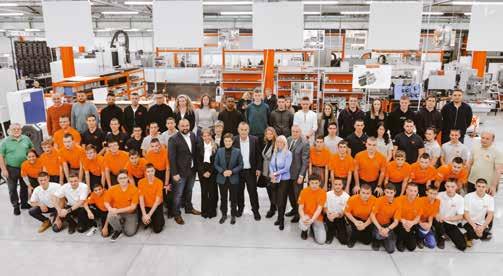
proud of the facts that our employees have an average age of 34, that more than 50 of our employees have already bought an apartment, that our young people are getting married and building their futures in their home region. They will raise their children here, where their parents are, where they have roots.
Is the work Inmold is doing the best indicator of what Serbia is capable of doing? That needs to be assessed and stated by someone else, and I will continue trying to ensure that we work to the best of our ability. Demonstrating that we do good things is our participation in major trade fairs around the world, at which we are regular exhibitors. Last October we were in Dusseldorf, where we are very highly rated in terms of both the number of visitors we receive and the number of colleagues who come to visit us and with whom we are in regular contact. This year we will be exhibiting in Friedrichshafen together with a very famous Austrian company. Our robots and tools will be mounted on their machines, which will operate and produce throughout the duration of the fair. Our competitors in Europe, of which there aren’t many, today respect us because they
see that we are advancing, that we respect deadlines and that we insist on top quality. That’s the best indicator that we work well and have entered the first division.
This is an important year for Požega, given that construction of the highway is being completed. Will this make everything faster and easier?
That road has already reached Pakovraće, and from there it’s still a 20-minute drive on the regional road to our factory. Our overseas partners are today already able to reach us from Belgrade airport in an hour and a half, or a little longer, and that journey will be much more pleasant and easier when the highway passes just three kilometres from our company.
It is thanks to this that we can make ambitious plans. We have plants in Požega and Priboj, and around 520 employees, and I believe we’ll have more than 600 by the end of this year. When it comes to market expansion, our focus will be on Canada and entering South America, firstly Brazil and Argentina.
We registered ourselves last year as a research and development company, so our goal is to develop, improve and expand on that aspect with our existing people and new ones. Moreover, we will be the first company to have its own space at the University of Belgrade Faculty of Mechanical Engineering. We will arrange it, renovate it and equip six workplaces with the latest technology. We already have two scholarship holders who will encourage their friends to start doing a little work for us and to be paid for that. The idea is to entice them to work for us afterwards. That’s both good for them and for us.
Education 2023 25
There is a growing need for well-trained workers, which is also why a training centre equipped with modern CNC machines will be established at the Technical School in Požega
Jugović, co-founder of KUB
Learn The Language AndGetToKnowTheCountry
After a full three decades since the first English language courses for young people in Great Britain, KUB today organizes courses of all major languages for ages 7 to 77 and older, in Europe, USA, Africa, Asia and Latin America, and enrols students in secondary schools and for study abroad
enormous, not only in terms of location, but also in the choice of educational programme.
Right from the start, we wanted to give young people the opportunity to study abroad, get to know new cultures, and make friends from all over the world, because we believe it is important to respect differences and find what is common to all of us, no matter what meridian we live on - says Magdalena Jugović.
KUB has worked in educational travel for more than three decades. What kind of programmes and services do you offer?

We started with English language courses in the UK for young people during the summer holidays, accompanied by a teacher. Our clients’ interest soon expanded our range of activities. Besides English, we now offer French, German, Spanish and Italian for young people.
We offer courses in all major languages for ages 7 to 77 and older, in some of the most beautiful spots in Europe, USA, Africa, Asia and Latin America. Language courses have become a common way of using holidays for adults in the world – when you learn the language you get to know the country you are staying in – combination of the beautiful and the useful. And there are also specialized business language courses,
courses for managers, preparations for taking official exams in English, German, French, Italian, Spanish..., and courses for language teachers.
You help with enrolment in secondary schools and study abroad. How much interest is there in this kind of education?
The most interesting cultural exchange is still with the USA, where a whole school year is spent in public schools. The programme is subsidized by the US government and participants are placed with volunteer families in smaller towns in America. Since it is possible to spend only one year on this programme, the popularity of a similar programme in Canada is growing, where young people can spend several years in high school and where most continue their studies with good scholarships. We also offer numerous private high schools in Great Britain, France, Germany, Austria, Switzerland, Spain, Italy, Greece, USA... The possibilities are
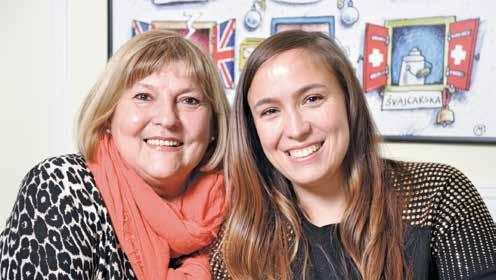
With university placements, the greatest demand is for studies in Great Britain, but also studies in English in Austria, Spain. Recently, there has been interest in studies in the United Arab Emirates, so we have included Dubai in our offer.
You have decades of successful business behind you and thousands upon thousands of satisfied participants. Are they the best recommendation for your agency?
We realized very early on that advertising rarely brings students to our programmes, even though we were the first to offer these services on our market. Interest was strong from the beginning, especially since so many people could afford to send a child on such a trip while learning the language. Impressions from the language trips of satisfied participants were always our best recommendation. More than 90% of our students come from the recommendation of friends or relatives whose children have travelled with us.
It is especially satisfying that more and more children who travelled with us send their own children to us, because they want to give them this unforgettable experience. In the meantime, some have become teachers of foreign languages and now bring their pupils. This is a continuity we’re really proud of.
Education 2023 26 Business
Magdalena
More than 90% of our students come from the recommendation of friends or relatives whose children have travelled with us
1.0
-WhenKnowledgeMeetsAbility
A team of experts from Serbia has developed a method that enables fast training in a wide range of IT industry areas, thus providing a response to the demands of the contemporary global labour market that doesn’t require leaving the home
The pulsating labour market provides education systems across the planet with ever more difficult tasks to undertake year on year. The rapid development of new technologies, particularly in the IT sector, demands a much greater capacity for the qualification of future personnel that existing educational methodologies are simply unable to keep pace with without the labour market suffering.
A team of authors from Serbia, comprising experts from the fields of education, communications, human resources and IT, has since 2018 been developing a new method for transferring knowledge that can be immediately applied in practice upon completion. This hybrid methodology, based on the utilisation of all the advantages of multimedia and online communication, was revised following the COVID-19 epidemic, due to the vast experiences gained during the conducting of online teaching and working from home that highlighted a range of problems that hadn’t been not recognised prior to the epidemic. It showed that Ciklotron, as this methodology is called, was ready to respond to the demands of the modern labour market even before the tribulations brought by the response to the pandemic.
Over the course of the training courses, which are implemented in programmes lasting 3, 6 and 9 months each, Ciklotron initially prepares IT personnel in the domains of Quality Assurance, Full Stack 2.0, DevOps and Blockchain. With the selecting of these programmes, participants gain the ability to broadly recognise their place in the IT industry, but also to maximise their chances of gaining employment as quickly as possible by care-
fully choosing the training they will receive.
With the applying of the latest technologies in the development of this method, another major problem that’s resolved to a great extent is the lack of high-quality teaching staff. In Ciklotron, classrooms are designed
such a way that they reduce the number of hours required by lecturers by up to 40%, whether that’s in the process of imparting knowledge or in the testing process. However, in order to avoid the sense of alienation of virtual classrooms, the programme envisages gatherings of lecturers and participants in a frequency that will enable them to develop personal contacts, which are, according to the methodology’s creators, essential to the high-quality professional and personal development of participants.
A significant characteristic of this methodology is also the scalability of the number of participants, which is conditioned solely by the request in specific projects, and the authors are hopeful that this very fact will result in Ciklotron being accepted as a national platform for IT education by the end of this year.
It is a well-known fact that the IT industry has for decades been crying out for trained personnel, though unfortunately trends often change when it comes to the required knowhow in this field, and at Ciklotron they believe that flexibility in the selection of programmes is a requirement to respond to foreign IT companies that are increasingly arriving in Serbia in search of competent workers.
IT employers, under the pressure of the daily challenges posed by the industry, are interested exclusively in personnel who are able to perform specific tasks in a certain period of time and to a high quality.
The creators of the Ciklotron methodology are convinced that they can train new personnel who won’t only have the knowhow, but will also the ability to fulfil the demands of employers at the highest level.

Education 2023 27 Business CIKLOTRON
Ciklotron is a methodology that emerged in response to the challenges confronting contemporary education. The authors are convinced that participants who complete these programmes will not only be recognised as being familiar with the theory, but also as being able to effectively implement professional tasks at the highest level
Education For The Future
Finland has one of the highest-quality education systems in the world, as shown by its consistently high rankings in third-party international studies. Finland has achieved this success despite only spending slightly more than the average of OECD countries per student

Finns believe in their education system, which is built on the belief that the nation can only utilise its full human and economic potential if every citizen has the opportunity to realise their personal potential. It seems that they
are right to do so, as their education system and pedagogical model is the world’s most successful.
The conference on Finnish education entitled “Drivers of Change - New Roles in Education”, which was jointly organised the
Embassy of Finland in Belgrade, the Nordic Business Alliance, the “Education for Serbia” Foundation and Uni Credit Bank, was held at the Palace of Serbia in February. Experts from Serbia had an opportunity to better acquaint themselves with the Finnish educa-
Education 2023 28 Education in Finland
tion system and pedagogical model, which are among the world’s most successful.
The conference was opened by Finnish Ambassador to Serbia H.E. Kimo Lahdevirta, who pointed out that Finns believe in their country’s education system, which is built on the belief that the nation can only utilise its full human and economic potential if every citizen has the opportunity to realise their personal potential. Dr Raimo Salo, an expert in the professional development of teachers from the Faculty of Education in Oulu, addressed conference participants with the aim of presenting Finnish experiences in terms of providing the conditions required for the professional development of teachers. He emphasised that schools for the professional development of teachers have an important place in teacher education and that quality mentoring plays a key role in supporting professional development.
EDUCATION IS FREE OF CHARGE
Finnish schools and education methods represent a popular topic in news stories, and the whole world knows that Finland has one of the best education systems on the planet. Finland established its modern compulsory education system in 1921, proving that the development of an entire education system takes time.

Finland’s love affair with education began just over a century ago, in 1921, with the creation of the modern compulsory education system and the philosophy of education for all. The curriculum and organisation of the education system have been updated and reformed several times since. A significant reform began in 1972, with the adoption of the comprehensive school system, meaning that basically everyone has the same opportunity to receive a good quality education in the school nearest to their home.
Education is free of charge, from pre-primary school to higher education. The goal is for everyone to have an equal opportunity to receive a high-quality education regardless of their family’s social or economic background.
The school meal system plays an essential role in Finland’s education system. Equal access to education and free school meals have been key factors in supporting
economic growth and transforming Finland into a knowledge-based society. School meals were initially introduced to address post-war poverty and malnutrition. At the time, Finland was also resettling thousands of internally displaced people and orphans. The law to provide meals free of charge for all pupils came into force nationwide across Finland in 1948. Finland has been offering free school meals to all schoolkids for more than 70 years – making it the world’s longest-running free-of-charge school feeding programme.
Early childhood education in Finland is about play and social interaction. A strong early beginning in learning promotes the development of cognitive, social, lan -
very important. Finnish children begin school later in life, spend less time in the classroom and have less homework than kids in many other countries, yet they still produce excellent outcomes.
TEACHERS ARE VALUED IN FINNISH SOCIETY
Teachers enjoy broad autonomy and have flexibility to organise their own teaching. In the late 1970s, the length and rigour of teacher training was increased to meet the needs of learners. Teachers were required to earn master’s degrees in 1979. Both form tutors and subject teachers are required to have a master’s degree. Teachers are valued in Finnish society.
guage and numeracy skills, as well as a motivation and joy to continue learning. Finnish schools place an emphasis on the child. For example, school days are short and pupils take breaks between classes, spending time outdoors, while activities like sports, art and music are considered
They are highly educated and trusted to do what is best for every child. Personalised help is common: the Smithsonian notes that nearly 30% of Finnish children receive some kind of special help during their first nine years of school.
Under the Basic Education Act, besides providing teaching within the framework of the curriculum, school pupils also have the right to receive guidance counselling and sufficient support for learning and school attendance throughout their comprehensive school years. Support must be provided as soon as the need is detected.
Education 2023 29
Quality, efficiency, equality and internationalisation are the keywords of the Finnish education system
If the enhanced support provided to a pupil is insufficient to help them cope with schoolwork, an administrative decision is made, based on a pedagogical assessment, to provide special needs support. An individualised educational plan (IEP) is drawn up for the pupil and must detail the provision of teaching and other support specified in the decision to provide special needs support.
Special needs support consists of special needs education and other support needed by the pupil as referred to in the Basic Education Act. Special needs education and other support received by the student form a functional and systematic whole, wherein the support of the child’s parents or guardians are important, as are multi-professional cooperation and individual guidance.
Differences in the learning outcomes of different schools are minor. Schools are given a great deal of autonomy. They are neither micromanaged nor tightly controlled from a centralised authority. In fact, there is a high level of trust and division of responsibilities between the national and local authorities.
FINLAND ENSURES EQUAL OPPORTUNITIES
Quality, efficiency, equality and internationalisation are the keywords of the Finnish
education system. Education has made Finland into a world-class, knowledge-based society, in which higher education is provided by 14 universities and 24 universities of applied
sciences. These institutions offer over 450 degree and non-degree programmes in English.
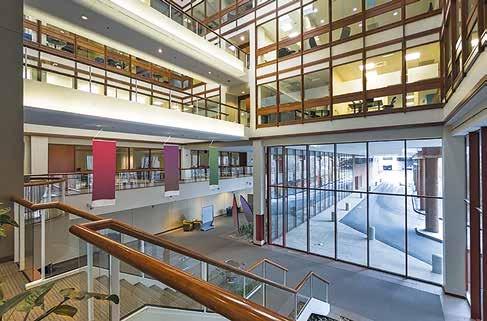
Finland’s education system began receiving worldwide attention in the 2000s, thanks
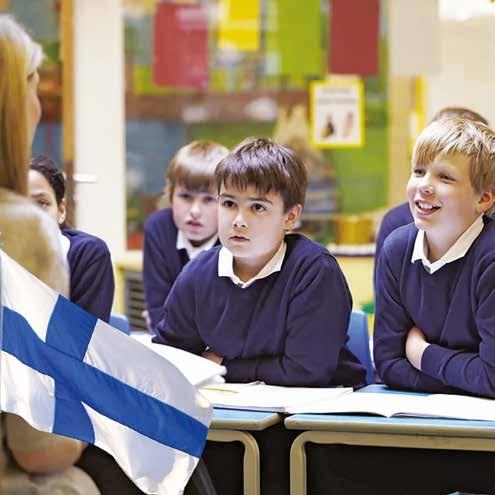
to high international rankings. Additionally, Finland achieved this result while spending only marginally more per student than the OECD average and much less than some countries. This prompted many countries to seek to work with Finland to develop their education systems.
Finnish higher education is often praised as being safe, well-functioning and close to nature, but also for having many high-quality degree programmes in English. Finnish higher education institutions are autonomous, despite being largely funded by the state. When it comes to student satisfaction surveys, Finland stands out as Europe’s number one place for international students. In a study conducted by global platform StudyPortals, Finland was given an average satisfaction rating of 9.2 out of 10. Finland also came top in the Student Satisfaction Awards 2014, gathering positive reviews of Finland’s academic standards from nearly 7,000 international students. Highly positive feedback was also given for services provided for international
Education 2023 30
Education in Finland
students. Finland believes that international cooperation in education is essential. Finnish companies and institutions eagerly seek international partners in order to receive mutual assistance in improving.
FINNS ALWAYS SEEK A PRACTICAL SOLUTION
Degrees from universities of applied sciences generally cover 210–240 credits (ECTS), meaning 3.5–4 years of full-time study for a bachelor’s degree and 60–90 credits (ECTS) achieved within 1–2 years for a master’s degree. At universities, students can study for bachelor’s and master’s degrees, as well as postgraduate degrees leading to a Ph.D.
Finns always seek a practical solution – turning setbacks into steps forward. Problem-based learning is at the core of the tuition offered by most Finnish universities and universities of applied sciences. Teaching methods are far from authoritarian, with learning being based on discussion, student participation and working together.
A thriving Education Technology (EdTech) sector has developed in recent years, merging Finnish software and education strengths. This is particularly important in the COVID-19 era, when distance and personalised learning have become more important. COVID-19 demonstrated the resilience and versatility of the Finnish education system. In the spring of 2020, Finland closed almost all schools and distance learning was implemented with minimal interruption. During physical school closures, pupils were asked to attend classes online, complete school tasks independently and submit them to teachers electronically.
All Finnish schools have tutors and mentors, as well as other peer support mechanisms for using digital tools, which proved crucial during the pandemic. While the ability of teachers to transfer their curriculum online proved even better than expected, it is clear that distance learning cannot currently replace classroom teaching fully.
The reform of the Finnish education system continues to this day. In 2021, the age of compulsory education system increased from 16 to 18. All young Finns are
required to have access to, and to enter, secondary level education.
AND NOW SOME INTERESTING FACTS...
* Popular magazine The Economist ranked Finland No.1 in their Educating for the future index (2019), and the OECD ranked
* 68.7% of adult Finns participated in informal learning during the past year, compared to the EU average of 59.9%, according to Eurostat.
* 73% of Finns aged 15 or over have completed a post-comprehensive level qualification, while 36% have completed a
The goal is for everyone to have equal opportunity to receive a high-quality education, regardless of their family background
Finland No.2 in the world for the highest performing graduates (2019).
* Finnish education exports represent a small sector of the economy, yet they have grown 49% in the last five years, according to Education Finland.
* Nine Finnish universities have been ranked among the world’s best according to The Times’ list (2020).
* Finns eagerly take advantage of their education system. The percentage of the population with a bachelor’s degree is the 4th highest in Europe, while the percentage of the population with a Doctorate is 3rd, according to Eurostat.
tertiary level qualification, according to the Ministry of Education and Culture.
* Finland has over 400 degree programmes taught in English, including 266 master’s-level and 62 doctorate-level, according to the Ministry of Education and Culture.
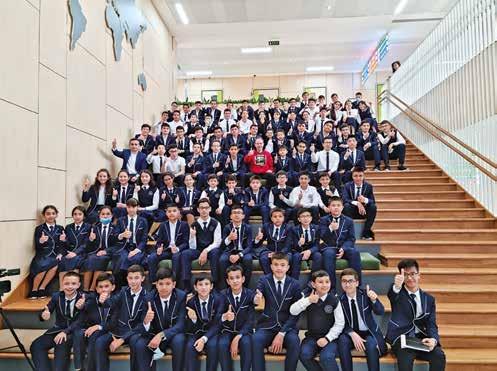
* The most popular source countries for foreign exchange students in Finland are Germany and France, according to the Ministry of Education and Culture.
* 90% of teachers in Finland are satisfied with their work, while 92% say the positive aspects of their job outweigh the negative ones, according to a survey commissioned by the Ministry of Education and Culture.
* Finland has been ranked the happiest country in the world for several consecutive years, according to the UN Happiness Report.
* Education Finland maintains a large list of companies that can be cross-filtered by fields of expertise and educational level.
Education 2023 31

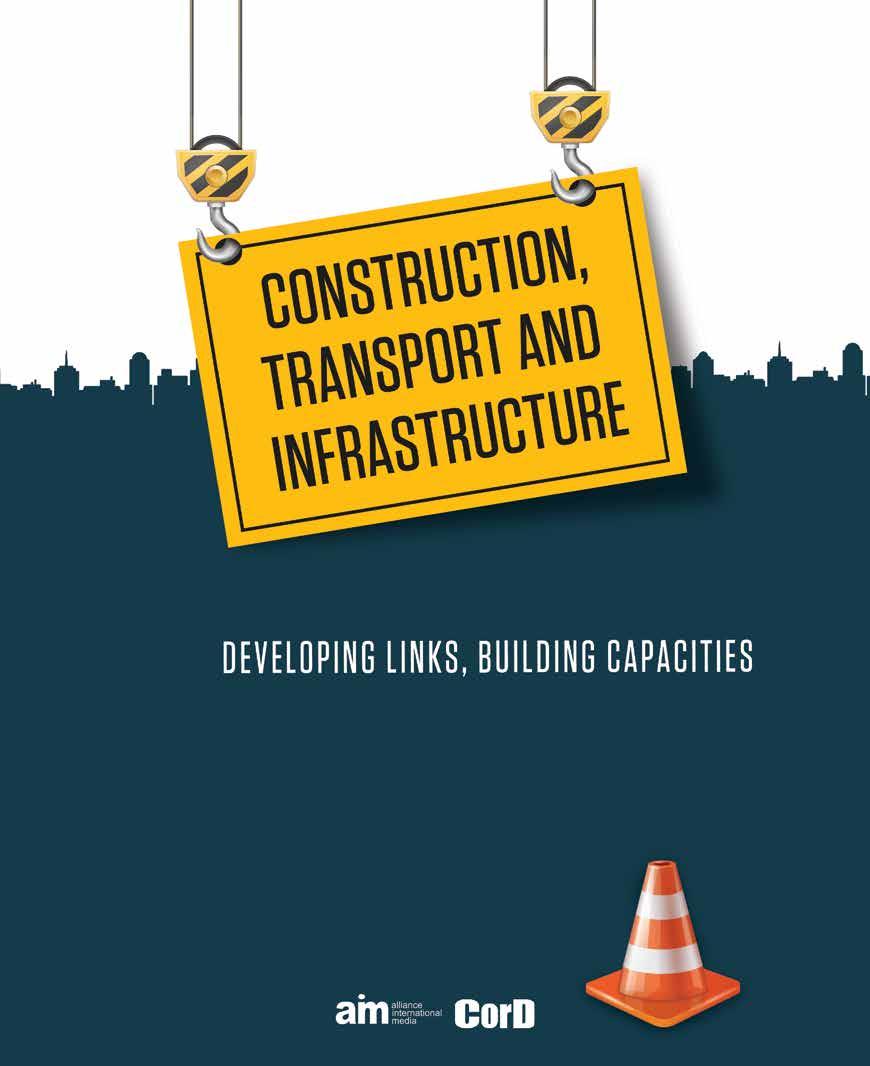 GORAN VESIĆ, MINISTER OF CONSTRUCTION, TRANSPORT AND INFRASTRUCTURE
GORAN VESIĆ, MINISTER OF CONSTRUCTION, TRANSPORT AND INFRASTRUCTURE
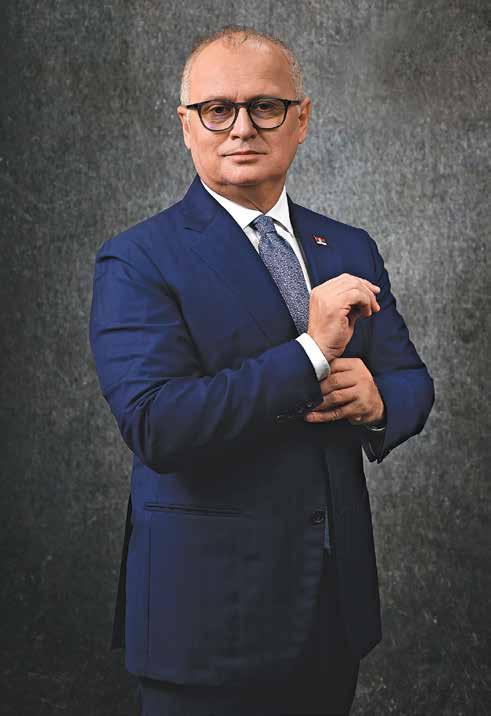
Nothing Will Stop Us
We want construction to continue at full steam in Serbia, for investors and citizens to be protected, deadlines for obtaining permits shortened, procedures made more efficient and the possibility of arbitrariness reduced
Important legislative amendments that should lead to the further development of the construction sector will soon enter the parliamentary procedure. These are the amendments to the Law on Planning and Construction, which is in principle a good law, but the time has come to innovate it to be even more efficient, says Serbian Minister of Construction, Transport and Infrastructure Goran Vesić. “It’s important that we maintain a high level of construction activities, which “fell” by around 10 per cent last year due to the crisis,” explains our interlocutor.
The amendments to this law are essentially aimed at ensuring greater transparency, introducing order and accelerating the adoption of green construction practises. Conditions for holders of public authority will in future be issued through the e-prostor [e-space] digital platform, rather than being issued in paper format. Clear deadlines will be included, and the holders of public authority won’t be able to change the conditions during the procedure for issuing a construction permit. Investors will have to secure an insurance policy prior to registering works, in order for any injured party to be able to receive compensation in the event of an accident, and investors will also have to provide proof of the steps to dispose of construction waste prior to obtaining building permits, in order to avoid the creation of wild dumpsites.
“We will stimulate green construction, and every public facility and other building covering an area greater than ten thousand square metres will have to possess a green construction certificate. We are also introducing an obligation for a certain number of parking spaces in new buildings to have an electric vehicle charger. Investors who build ecologically will pay reduced contributions for construction land,” explains Minister Vesić.
2 INFRASTRUCTURE 2023
INTERVIEW
DETERMINATION TRANSITION DEVELOPMENT
We haven’t given up on any project, and nor will we. And we are serious in our intentions to complete all projects according to plan and to launch new ones
The proposed abolishing of the conversion of construction land and associated fee has again been met with stormy reactions in the country. What are your reasons for advocating in favour of this position?
No country in Eastern Europe has a conversion institute. The cancelling of conversion will not harm the state in any way, because 90 per cent of conversions have been done without fees since 2011. On the contrary, following the abolition of that institute, the state will earn more, through the collection of fees for construction land contributions, the price per square metre, real estate turnover, the employing of people and the payment of taxes. That’s why I don’t understand the remarks claiming that cancelling conversion will cause the state to lose billions of euros in fees, because that is completely false.
Statistics show that, in the 13 years since the 2009 adoption of the law, the Serbian budget has received only 31 million euros on the basis of land conversion charges, while we’ve lost thousands of jobs. Local governments have lost out on hundreds of millions of euros through construction land contributions, which have not been collected, as well as through unpaid property taxes. So, we’ve lost much more than we’ve gained. If it were possible to collect those land conversion fee billions that the state has allegedly been deprived of, they would have been collected by now, and cities and municipalities wouldn’t have lost out on hundreds of millions of euros.
Under the scope of its obligations related to environmental protection and harmonisation with the European Union in the area of the Green Deal, Serbia has taken on a number of obligations to advance this area. Which parts impact your sector and how will they be addressed through proposed legal amendments?
The main targets defined by the Green Deal relate to greenhouse gas emissions,
It is estimated that approximately 15.7 million passengers and 87.92 million tons of goods in Serbia will switch from road traffic to rail by 2030, which will contribute to protecting the environment
and the most important target is to reduce emissions of those gases in the EU by 50-55 per cent by 2030, i.e., for the EU to become climate neutral by 2050. Considering that the transport sector has a major impact on the environment, this area is recognised as an important issue to which attention needs to be paid. Serbia is not an EU member state, but this framework relates to us massively. I will remind you that in October 2020, at the Berlin Process summit in Sofia, the governments of the six countries of the Western Balkans committed themselves to implementing the Green Agenda for the Western Balkans, as a tangible plan to extend the Green Deal to Southeast Europe.
A total of 134.7 kilometres of new railways have been built in Serbia since 2012, with 754.9 kilometres of railways reconstructed, while at present 156.8 kilometres are under construction or reconstruction.
Serbia is working to improve the area of rail transport significantly. In order to further reduce emissions of harmful gases, railway infrastructure projects also imply the electrification of rail lines that have not yet been electrified, such as the Niš-Dimitrovgrad or Belgrade Centre-Vršac lines. Likewise, we are strengthening capacities linked to combined transport, and we’re doing so through investments in the construction and reconstruction of intermodal terminals, but also by strengthening the capacities of companies with operations related to combined transport, and all in order for us to be able to transfer “goods flows” from roads to railways. It is estimated that about 15.7 million passengers and approximately 87.92 million tons of goods in Serbia will switch from road traffic to rail by 2030, which will contribute to protecting the environment.
All the corridors that we are building should enable the easier and faster flow of people, goods and services, which is crucial to the further economic growth of all countries of the region
Furthermore, we are working on the establishment of the European Rail Traffic Management System (ERTMS) and the implementation of TSIs (Technical Specifications interoperability), in order to provide for automation and facilitate traffic management along the main corridors connecting Serbia with the countries of the region and further with the EU countries. However, first and foremost, Belgrade and Novi Sad have been connected via the country’s first high-speed railway, which will be extended northwards to Subotica and Budapest, and southwards to Niš.
You took over the post of construction minister at a time when many countries, including ours, need to solve the problem of fiscal stabilisation and stimulate economic growth due to the global crisis. How does this situation reflect on the plans of your ministry?
We haven’t given up on any project, and nor will we. And we are serious in our intentions to complete all projects according to plan and to launch new ones. First of all, the 18-kilometre-long section of the Moravian Corridor from Pojat to Makrešan will be completed on 31st March, while the 28-kilometre-long section to Koševi will be completed by the end of September, which means that Kruševac will have a direct connection to the highway before the end of the year. Works are also being implemented on other sections, to Adran and between Čačak and Kraljevo. The section to Adran, which means connecting Kraljevo with the highway, will be completed in the first quarter of 2024, with the last section – between Koševi and Vrba near Kraljevo – to be completed in 2025.
We will also open the Surčin-New Belgrade section to traffic by the end of March. This section is eight kilometres long and represents the closest connection of that part of the city to Miloš the Great Motorway. The Belgrade Bypass to Bubanj Potok will be
INFRASTRUCTURE 2023 3
INTERVIEW
finalised on 1st June, and we will continue building the bypass all the way to Pančevo. Design works are underway and we will build a road-rail bridge over the Danube, near Ada Huja, to Pančevo. Final works are also being completed on the Iverak-Lajkovac expressway, which will connect Valjevo to Miloš the Great Motorway.
The motorway section from Pakovraće to Požega will be completed by the end of this year. The Ruma-Šabac section that forms part of the Ruma-Šabac-Loznica expressway, is being constructed and will be completed by August or early September, and this year will also see the completion of works on the Kuzmin-Sremska Rača section, together with a bridge over the Sava linking to Republika Srpska. Agreement is being reached on the part from the bypass in Kragujevac, via the road towards Mrčajevci and connection with the Moravian Corridor.
We are also working on expressways in the east, from the motorway at Požarevac and further onwards to Veliko Gradište, Golubac. The 70-kilometre-long Požarevac-Golubac section is being constructed without interruption, while work will continue on the project design for the Danube national road, as a tender has been announced for the design of that section. Works are also being carried out on the Niš-Merdare motorway, along the 33-kilometre-long section from Niš to Pločnik.
We will launch works this year on the construction of the motorway between Bački Breg and Nakov, which will connect the border with Hungary and the border with Romania. We should start building the Belgrade-Zrenjanin-Novi Sad expressway next year. We will also build a new Novi Pazar-Kraljevo expressway, covering a distance of 103 kilometres. Works are also massively underway on the construction of the Fruška Gora Corridor, which includes the longest tunnel in Serbia (Iriški Venac Tunnel), at 3.6 kilometres long.
When it comes to transport, Serbia forms part of the European transport corridors. How does inclusion in this network impact our choice of construction and connection priorities within the Western Balkans?
Regional connectivity is among Serbia’s priorities. Our country lies on the European
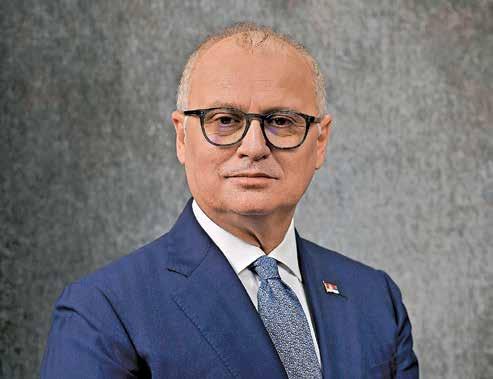
We have 5,000 “captured” locations that would be freed by the abolishing of land conversion provisions, finally making it possible to build on them. Everyone who deals with the GDP and investments in Serbia responsibly knows how important this is
corridors, and that’s why it’s important for us to be in full harmony with the EU, which treats us almost like an EU member in the area of transport. In the European Union, during my recent visit to Brussels, our proposal that the EU assist us in the project to reconstruct 588 kilometres of regional railways, which need to be completely reconstructed and electrified, was well received. These routes include the railway connecting Serbia and Romania, one heading from Belgrade to Pančevo and Vršac, and another other to Romania, via Belgrade, Zrenjanin and Kikinda, then the Vrbas-Sombor route and the railway that leads to Bosut on the border with Bosnia-Herzegovina. And then also the one from Kraljevo to Kosovo.
When it comes to road links, we are building motorways with the precise purpose of improving regional connectivity in the Western Balkans, including the Motorway of Peace [auto-put Mira], which should connect Niš to the Albanian coast via Priština. Then there’s the Kuzmin-Sremska Rača expressway heading towards Bijeljina in Republika Srpska, and from there Bosnia-Herzegovina will further construct the route to Sarajevo. Moreover, upon completion of the Preljina-Požega section of the motorway, we will continue building two motorways from Požega: one to Kotroman, Višegrad and Republika Srpska; and the other to Duga Poljana and Boljare, i.e., to the border with Montenegro.
These corridors should all enable the easier and faster flow of people, goods and services, which is crucial to the further economic growth of all countries of the region. Apart from that, we are completing the intermodal terminal in Batajnica, while we are also building another one the same in Makiš, as a road-rail hub where goods will be transferred from one mode of transport to another, which will make Belgrade and Serbia a real “transport hub” in this part of Europe. And this means that there will be ever-more work for all people engaged in the field of traffic and transport.
4 INFRASTRUCTURE 2023

The infrastructure projects implemented in Serbia over recent years have proved to be the most complex and demanding investments in the construction industry. At the centre of attention have very often been excavations, construction works, weight-bearing and finishing layers. In the past, the topic of professional tunnel drainage, highway and bridge drainage, as well as the treatment of water from these surfaces, has been considered a secondary priority.
However, serious accidents that occurred in several European tunnels during the 1990s led to the 2004 proclamation of the European Parliament Directive on minimum safety requirements for tunnels in the trans-European road network.
Since then, more attention has been given to professional systems for the drainage and treatment of water in highway projects, from design to the construction phase. The danger of fire in tunnels, and the grave consequences it can have on human lives, is linked directly to the efficiency of tunnels’ internal drainage systems.
Looking back, without existing local regulations, it was quite a challenge to create modern and functional solutions that are fully compliant with the new safety requirements at the European level.

ACO, as the leading global producer of system solutions in the area of water management, had already amassed substantial experience in a large number of infrastructure projects worldwide and was able to offer expertise that proved extremely useful in the initial development of new Serbian highway network routes.
ACO, as the leading global producer of system solutions in the area of water management, had already amassed substantial experience in a large number of infrastructure projects worldwide and was able to offer expertise that proved extremely useful in the initial development of new Serbian highway network routes

The first designs with professional drainage and water treatment systems were developed back in 2008. The first implementations, however, only came several years later, in 2014.
During that time, ACO’s local experts worked closely with designers and construction companies to clear all the necessary details, requirements, calculations and installation details.
This resulted in the implementation of modern drainage systems, with the task of taking care of hazardous liquids in the case of an accident inside the tunnel, through hydraulic intake of 20,000 litres in a period of just five minutes. That means that the design of the drainage system enables the content of one cistern transporting hazardous, flammable liquids to be cleared in the required time. These dangerous liquids are then conveyed to the system for water treatment – an oil separator equipped with an alarm system and storage tanks of the required volume. This system was designed locally, with ACO components, and approved by the Serbian fire service. In the case that a fire does break out inside the tunnel, the design of drainage shafts prevents the fire spreading to the rest of the system and protects the tunnel’s main collector.
Beyond the tunnels, wherever the highway traverses water catchment areas, the protection of ground water is required through the implementation of separators for oil and heavy metals.
This ensures that the safety of people, groundwater and equipment in highway projects is raised to the level of safety required by European norms. Most of the new infrastructure developments, such as tunnels on Miloš the Great Motorway E-763, Šarani, Brđani, Savinac, Brančić, Lipak, Železnik and the latest Laz and Munjino Brdo, the Požega-Preljina highway section, the Belgrade ring-road and the Moravian Corridor are all equipped with ACO professional drainage and water treatment systems and boast the highest level of safety.
INFRASTRUCTURE 2023 6
Professional solutions for water management in modern infrastructure projects
BUSINESS JELENA ANDRIĆ GRAFAKOS, MANAGING DIRECTOR, ACO EAST EUROPE ADRIATIC
MIA ZEČEVIĆ, NOVASTON CEO

Retail Sector’s Further Development Expected
Novaston unique real estate platform – encompassing Novaston Asset Management, Novaston Project and Facility Management and Novaston Marketing Consultancy – is set to mark 10 years of operations in Serbia and the region with more than 40 strategic projects and 500,000m2 of space under management for more than 15 international clients
Novaston announces the further development of its services for the coming period – from project development support and property management services, via real estate valuations, mediation in the sale and leasing of facilities, to marketing – but also better project positioning as a business partner and investor.

Despite challenges, the real estate sector is not only being marked by recovery, but is also recording new development opportunities. We believe that this reflects favourably on your business?
If we exclude the turnover of residential real estate, the influx of foreign investments increases demand for office and logistics space, but also demand for the further development of the retail sector. Apart from a good location, real estate’s market attractiveness is also influenced by the energy efficiency and independence that’s now mandatory. NOVASTON Project Management, as part of the platform, was engaged in the BREEAM certification process for STOP SHOP retail parks in Serbia and Croatia, which are part of the CPI Property Group. Moreover, the offer of our leasing team includes high-tech business premises in the Central Business District, as well as other modern offices and logistics facilities in Belgrade and nationwide across Serbia. When it comes to the retail sector, in which NOVASTON is already a renowned name, we receive many inquiries from local investors regarding the development of retail parks beyond the larger economic centres. We are also continuing our cooperation with IKEA Serbia on the implementation of the second phase of its AVA Shopping Park. Simultaneously, in the hotel industry, we
are strategically developing a sales strategy, commercialisation and the management for special custom made aparthotels in the region.
An ever-increasing number of companies are expressing an interest in the “combined
model” of work. How will the offices of the future look?
The best example of the business space of the future is the project we’re currently working on with Schneider Electric and investor Aleksandar Gradnja – to reconstruct the Novkabel industrial facility, a complex in Novi Sad, which is set to become a modern development centre upon completion, covering an area of 17,000m2 of gross space. This facility is in the process of obtaining LEED Gold certification, which means that it will be harmonised with the principles of environmental and social sustainability. Research shows that social sustainability is actually a critical aspect of every business, which is why companies are increasingly choosing facilities that promote a sense of wellbeing by understanding people’s business and private needs. That’s why the best solutions are represented by green gardens, zones for relaxation and informal communication, music and meditation rooms, childcare areas, kitchens etc.
What are your plans for the coming period?
We are developing further operations around the region through services – from project development support and property management services, via real estate valuations, mediation in the sale and leasing of facilities, to marketing –but also better project positioning as a business partner and investor. We have utilised our many decades of expertise to create, together with law firm Gecić Law, a “Guide for real estate development” in Serbia, in order for us to be able to provide future foreign and domestic investors with a comprehensive overview of the process and requirements to realise an investment in business premises with assured profitability
INFRASTRUCTURE 2023 7 INTERVIEW
We are strategically developing a sales strategy, commercialisation and the management for special custom made aparthotels in the region
Top Trends In The Construction Industry For 2023
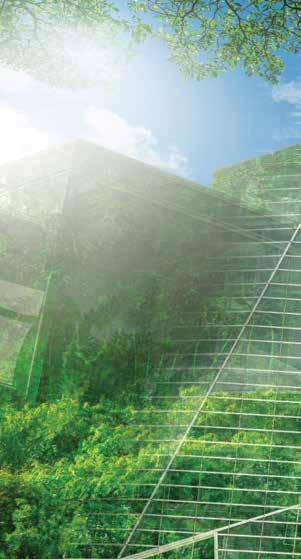
These are some of the many construction industry trends that people should stay aware of in 2023, and perhaps beyond. They’ll undoubtedly affect current construction projects and those in the pipeline for the months ahead. Some of the topics here might even inspire people to pursue their first construction jobs
Many innovations in the construction industry require people to go outside their comfort zones and use new technologies and tools. Doing things differently often causes anxiety in the beginning. However, when business leaders know their peers have gotten great results with updated methods, they’ll be more open to following suit. Here are some of the most prominent construction industry trends that will shape 2023.
CONTINUED LABOUR SHORTAGE
Anyone reading about trends in construction industry publications knows they’ll often come across content detailing the difficulties of the continued labour shortage. It is a multifaceted issue.
Many construction industry professionals are near retirement or have already left the workforce. It takes significant time for the necessary knowledge transfer to occur between industry veterans and younger new hires. A related problem is that many people who have entered the workforce relatively recently don’t consider construction a viable option.
INCREASED RELIANCE ON WOMEN IN CONSTRUCTION
There’s no quick fix to the labour shortage. However, one of the trends in the construction industry that’s getting attention from news outlets is the growing evidence of women entering
the sector to help fill employment-related gaps.
Recruitment campaigns targeting women have led to a more than 50% jump in females taking construction roles over the past decade or so. Many such positions don’t require a college degree. Another advantage is that the pay gap between men and women in construction is typically much smaller than in other sectors.
Many women decide it’s time for a career change and ultimately realise the construction industry could give them the new option they seek. Some companies are making changes that could influence long-term construction industry trends. For example, they’re offering parental leave and making other fundamental changes to make construction positions and providers more appealing to females seeking work.
COST OF CONSTRUCTION MATERIALS
As previously mentioned, the COVID-19 pandemic disrupted construction projects worldwide. However, researchers suggest the situation is taking a positive turn. An Oxford Economics report revealed a 2.3% increase in the real value of worldwide construction projects finished in 2021. However, the labour shortage, combined with supply chain difficulties, is making it challenging for construction project managers to get the resources they need to proceed smoothly.
One of the prevailing trends in construction industry analyses is the rising costs of critical materials. As people increasingly encounter sourcing difficulties, many have no choice but
to pay premium prices. Some also stay tuned to tips in construction industry discussions that could cut costs.
Fortunately, one of the positive construction industry trends of note is that relief is near. Numerous experts agree that 2023 should ease the burdens of high construction material costs. They point to several indicators of construction-related inflation becoming less intense.
DEVELOPMENT OF NEW CONSTRUCTION MATERIALS
Construction leaders are under increased pressure to cut construction material costs and find sustainable materials. These two trends in construction industry efforts have led to many in the sector developing new building materials that meet both of these aims. Some of them involve recycling construction and demolition (C&D) waste to create engineered wood or aggregate.
Such efforts reduce the overall quantities of construction materials ending up in landfills. They also cater to an increasing desire in modern society for people to make more-sustainable choices and reflect on how choices made now
INFRASTRUCTURE 2023 8
TRENDS
could positively or negatively impact future generations for decades.
People are also interested in how alternative construction materials could be kinder to the Earth than some of today’s most popular options. For example, individuals can harvest bamboo in only three to five years. Compare that to timber, which needs decades to grow. The faster growth period makes bamboo more sustainable.
MODULAR AND PREFABRICATED BUILDING
People who follow trends in construction industry building techniques often note that there’s historically a cyclical nature to what becomes popular. In other words, even if something falls out of fashion periodically, that might not be the case forever.
Such is the case with modular and prefabricated construction. Families of the early half of the 1900s heavily relied on those options to realise their homeownership dreams. They ordered home-building kits and enjoyed the convenience of all the supplies arriving ready to assemble.
Modular construction happens when most of the structure is built offsite before being trans-
ferred to the final destination. Prefabrication is similar and involves making or assembling certain components elsewhere and attaching them to the building later. Together, these options target much of the waste and transportation-related emissions typically associated with construction. They also often allow the building process to proceed more efficiently, with fewer errors or budgetary overruns.
THE RISE OF SMART CITIES
Many modern households have several smart devices in their homes. These gadgets do everything from helping people find information more quickly to enabling them to keep their homes clean and energy-efficient with less effort. It’s
not surprising that innovations in construction industry companies often also centre on making entire cities “smarter”.
These projects often result in destinations that are safer and let residents live better, happier lives. They also give engineers, designers and other professionals exciting opportunities to push the boundaries of what’s possible and be directly responsible for long-term progress.
When planned correctly, smart cities facilitate continual improvement. That’s because they collect real-time and historical data to optimise decision-making. The statistics could prevent traffic jams, promote eco-friendly development and more. Some of the largest smart city projects cost more than $100 billion. However, the people financing them believe they’ll facilitate long-term positive changes in construction and society at large.
GREEN BUILDING
Eco-friendly practises encompass some of the prevailing trends in construction industry discussions. Efforts could include putting solar panels on the roofs of residential and commercial buildings. Doing so is good for the planet and
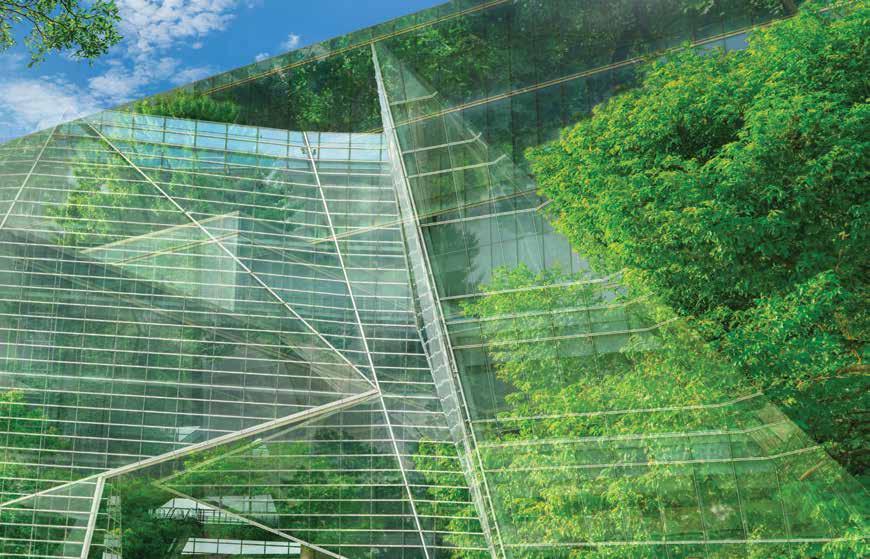
INFRASTRUCTURE 2023 9
One of the trends in the construction industry that’s getting attention from news outlets is the growing evidence of women entering the sector to help fill employment-related gaps
often saves money. Another option is to recycle as many construction materials as possible during and after a project.
Construction company employees are also working hard to reach a status of net-zero emissions by 2050. That will occur if there is a correlation between the amount of greenhouse gas emissions produced and removed from the atmosphere.
There’s no single way to reach that goal. Some leaders will explore innovations in construction industry processes. Others will use bamboo and other sustainable materials more frequently. Some options are unconventional but exciting. For example, research is underway to use the mycelium fungus to make natural bricks. It will take time for such possibilities to become mainstream. However, they give hope for the future.
3D PRINTING
3D printing has been a game-changer in the manufacturing sector. Many companies opt to print the spare parts and other essentials they need for their equipment rather than reordering them. However, 3D printing has also become one of the technology trends in construction industry methods. It reduces building time and promotes sustainability.
3D printing is also one of the top trends in construction industry circles because of how it could help tackle the housing shortage. Widespread usage of the technology could make houses more available to people who are unable to buy them now.
This construction method extends beyond homes. People have experimented with it to build schools and refugee shelters, finding it suitable for those more-specific needs. Some individuals caution that this way of building could have unknown consequences that become apparent after people use the structures for years. For now, though, many people are excited about the possibilities 3D printing offers.
TECH AND DIGITALISATION
The construction industry has not been on the cutting edge of technology. However, that’s changing in significant ways. Some site managers use drones to monitor for safety risks or check measurements. Analysts have also pointed out that the move towards connected construction will unlock new capabilities.
People no longer need paper documents
that could get lost or damaged. Instead, they can pull up the required information on a cloud platform that lets them see a digital version on demand. This improvement enhances collaboration and leads to faster problem resolution. Team members can also see digital models of buildings before construction begins.
It takes time and effort for construction company leaders to figure out the best ways to embrace digital technologies in their businesses. However, one way to do that is to stay abreast of trends in construction industry improvements. They can then learn more about how peers achieved meaningful gains.
ROBOTICS AND IoT
Any thorough coverage of construction industry trends cannot overlook the influence of robotics and the Internet of Things (IoT) Both those industries also influence other sectors. A robot called Moxie helps kids learn social skills and other vital capabilities. Many manufacturers use IoT sensors to monitor the condition of equipment.
One notable trend in construction industry management is the use of IoT sensors and geofencing technology. Site leaders can then
ensure employees only use machines and tools at approved times and in the right places. This approach also thwarts attempted theft by sending alerts when assets leave designated locations.
Many robotics applications in the sector reduce risks or assist with primarily manual tasks, such as bricklaying. Humans can thus often do the work faster with reduced risk of injuries. The use of construction robots is becoming more commonplace.

SUPPLY CHAIN TECHNOLOGIES
Many trends in the construction industry focus on reducing weaknesses. Doing so gives the affected individuals a stronger competitive advantage. Today’s leaders in the sector face increased bottom line pressure. Some pursue supply chain technologies to reduce extra expenses associated with stockouts or surplus items.
Some high-tech supply chain platforms also have forecasting features. They allow people to react to possibly detrimental construction industry trends in time. The associated companies are then more likely to remain stable, rather than experiencing major ramifications. Smart sensors let people track parcel statuses and locations in real-time.
Supply chain technologies also often have features that let people cut down on or eliminate manual tasks. They might automatically send out or fill in the fields of invoices. Other options capture digital necessities, such as weigh station receipts. This makes it easier for people in the construction industry and elsewhere to track goods moving to their destinations.
INFRASTRUCTURE 2023 10
TRENDS
Numerous experts agree that 2023 should ease the burdens of high construction material costs. They point to several indicators of construction-related inflation becoming less intense
Pupin’s Palace New Belgrade

As the investor of a new residential and commercial centre, Galens Invest is once again pushing the boundaries of comfort and quality of life and work in the capital city. As always, their first priority is the users' safety, needs and quality of life
Pupin’s Palace New Belgrade is a project of the new age. Its exceptional location, top facilities and recognisable quality of construction, will make it a favourite place to live and work in an urban environment.


Due to its road infrastructure and organisation, New Belgrade has become the centre of the most important business events, but also an extremely desirable place for the life of modern families. This city municipality will be enriched by the new residential and business centre, which will push the boundaries of comfort and quality of life and work in the capital. This is Pupin’s Palace New Belgrade, the successor to the impressive Pupin’s Palace in Novi Sad.
Designed to meet all the needs of the modern way of living and working, Pupin’s Palace New Belgrade is the ideal combination of premium quality materials and state-of-the-art technology. Besides the recognisable quality of construction, the condominium concept is marked by many other features that make life in this urban quarter of the capital more beautiful. Galens Invest has designed an underground garage with more than 1,000 parking spaces as part of the building itself. The complex will also include premises for hospitality establishments, sports centres, markets, playrooms and other activities that will enrich and improve the lives of the users of Pupin’s Palace New Belgrade.
An ideal business environment, which includes proximity to some of the largest business parks, such as Airport City, close access to the motorway and excellent connections with other parts of the city, makes Pupin’s Palace the optimal choice for business premises. This part of the building will be built and decorated to the highest international standards, in the service of employee satisfaction and motivation.
The complex will include premises for hospitality establishments, sports centres, markets, playrooms and other activities
In addition to great business potential, Pupin’s Palace New Belgrade offers a comfortable and functional living environment for all those striving for a meaningful and harmonious life in an attractive and dynamic part of Belgrade. For further information, call the following numbers: +381/64-89-55-699 and +381/64-89-55-711.
INFRASTRUCTURE 2023 11
BUSINESS
The Sava Centre Is Restoring Its Former Glow
Jadran is one of our oldest construction companies. Over the course of 70 years, it has grown step by step from a contractor for finishing works, renovation of facades and buildings under state protection and anticorrosion protection to the position of general contractor

Although they have more than 16,000 successfully completed projects behind them, they are currently fully focused on the reconstruction of the Sava Centre. This began at the end of 2021 and is proceeding according to plan. The congress section with 40 halls, a shopping area and offices is planned to open to its first guests during November 2023.
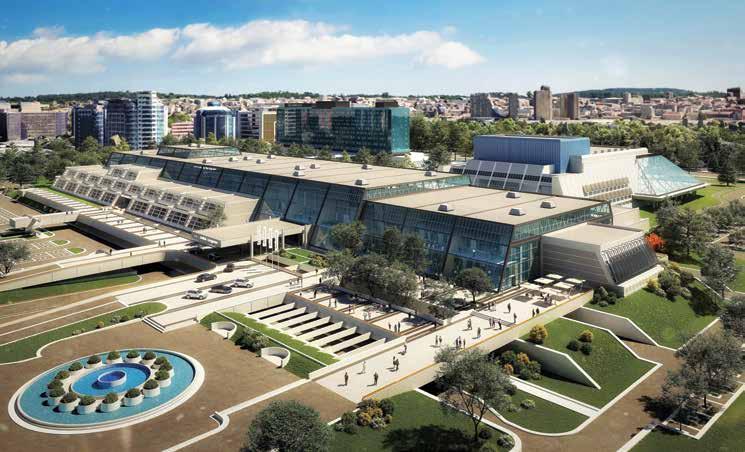
From when it was founded back in 1950 until today, Jadran has been delivering the highest quality, durable construction solutions. In the beginning this was through painting works, and then through anti-corrosion protection in large systems. Their high quality generated demand,
and demand brought expansion of the service portfolio. They started to deal with reconstructions, renovations and all finishing works. Their quality was recognised even beyond the country’s borders and today they are firmly positioned as a company that carries out large ‘design&build’ projects. Behind them are many successfully completed buildings, among them the Đerdap and Mali Zvornik hydroelectric plants, the Svetozar Marković University Library, the Royal Villa on Oplenac, the Konstantinovsky Palace in St. Petersburg, the Marriot hotel in Cairo and military bases in Baghdad, and before them are further great works and ambitious plans.
THE COMPLETE RENOVATION WILL COST MORE THAN 100 MILLION EUROS
The reconstruction of the Sava Centre in Belgrade is one of the most important jobs Jadran has undertaken. The investor is Delta Congress Centre (Delta Real Estate), expert supervision is entrusted to Zoling, the designer is Centroprojekt, and Jadran d.o.o. is the general contractor. The area of the building is 100,000 m2 and it is estimated that the complete renovation will cost more than 100 million euros.
“Our company is general contractor for the reconstruction of one of the symbols of Belgrade”, says Nikola Malbaša, director of Jadran. “This is
INFRASTRUCTURE 2023 12
BUSINESS
the largest congress centre in this part of Europe, a masterpiece of the Yugoslav socialist construction tradition, whose progressive achievements in the last century changed construction technology. With its grandiose size, futuristic design and content, Belgrade’s glass castle the Sava Centre has witnessed key political and cultural moments for more than four decades, while hosting several generations at full capacity.”
Following reconstruction, the Sava Centre will retain its original purpose, but this time it will be an energy-efficient building, built according to the most modern standards to become the best in the region and a globally recognisable congress centre, as it was when François Mitterrand, Indira Gandhi, Josip Broz Tito and many others walked its corridors.
CONFERENCE HALLS FOR A NEW AGE
The rebuilt Sava Centre will have the most modern conference rooms with the latest audio and visual technology, modern and attractive spaces for networking, halls for corporate meetings and parallel sessions during large congresses, a hybrid studio, restaurant and catering, and new spaces and zones, such as an immersive hall and an unusual green oasis - a winter garden. There will also be the indispensable office and shopping area with further attractions.
“The reconstruction of a building of cultural importance is in itself a serious challenge for us as contractors”, says Malbaša. “The building covers an area of almost 100,000 m2, which brings all kinds of surprises. During its four-decadelong existence, 10 million visitors have passed through, while almost nothing was invested in the building, which has led to the complete deterioration of some of its parts. Minor renovations and additions were often not properly recorded, so we also have to face the problem of lack of data. The inconsistency of archival documentation with the situation on the spot further complicates the situation.”
ALL ACCORDING TO THE ORIGINAL DESIGN
The renovation of the facades, glass and concrete, is being done according to the original design of Stojan Maksimović with the approval of the Institute for the Protection of Monuments, but aligned with current energy efficiency standards. The visual identity, the color of the glass and the recognisable verticals and horizontals are retained, but all vastly improved by the use of highly energy-efficient glass.
Our company is general contractor for the reconstruction of one of the symbols of Belgrade, the largest congress centre in this part of Europe
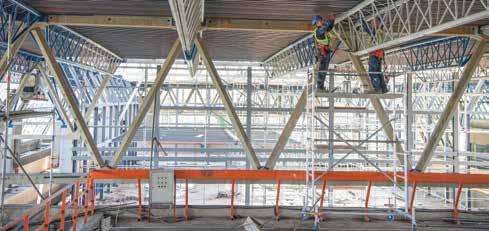
“We have to date carried out the rehabilitation of the building structure, the sandblasting, impregnation and rehabilitation of the concrete surfaces on the facade have been completed, and the installation of facade glass with high energy efficiency is being finalised. Strengthening of the foundations and the building’s seismic stability have been completed. The replacement of all installation systems is in progress: new electrical installations, cooling and heating, and the introduction of completely new multimedia installations”, notes a Jadran statement. “The renovation of the roofs is almost complete and the finishing works have begun. Work has also started on the Blue Hall, which will be one of the most sophisticated elements of the renovated Sava Centre.”
QUALITY AND COMPLIANCE WITH DEADLINES ARE THE PRIORITY
According to Malbaša, more than 600 workers are currently engaged on the project, including 30 Jadran engineers. And while we are talking numbers, we should mention almost 200 new mega-piles reinforcing the foundations, over 4,500 cubic metres of new concrete structures, 200-plus tons of new steel structures, over 15,000m 2 of anti-corrosion steel protection, more than 8,000m 2 of new energy-efficient glass facades, over 25,000m2 of roofing works...
“Help us keep our speed up, check we’re meeting our deadlines. We set them very strictly, but Jadran believes in its ability, and in the quality and motivation of our partners to complete the project in an exceptional way, giving it a special place in our corporate portfolio and in our hearts. It is interesting that Jadran worked on the Sava Centre during its construction in 1977-79. We were then responsible for painting and flooring works, and for anti-corrosion protection of steel structures”, recalls Jadran’s director.
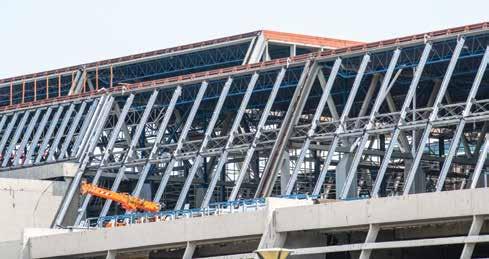
INFRASTRUCTURE 2023 13
STOJAN RANGELOV, PUTEVI IVANJICA DIRECTOR BUSINESS
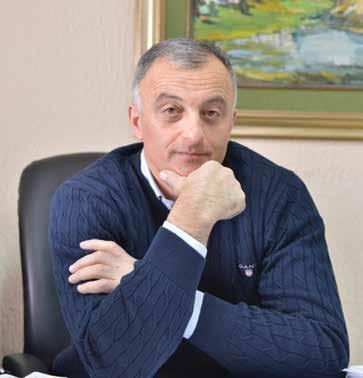
We Advance Safety
Over the previous 60 years, this company has amassed vast experience working in the demanding and inhospitable territories of southwest Serbia, Ivanjica and the surrounding area. The roads that this company has constructed have immeasurable importance to the local population and tourists, while some of them are considered Serbia’s most beautiful panoramic roads
ment of the Republic of Serbia, as investor, has planned the further construction and connection of Golija as a tourist centre, so we are hopeful of receiving support and continuing works. We want to continue participating in the construction of corridors and highways through this part of Serbia and to maintain the roads of this area in both summer and winter, as we have throughout all these years, which is also a major challenge.
How do your combined systems, safety barriers and soundwalls improve safety; does that receive sufficient attention in our country?
of safety, because these barriers are certified by crash tests, there is no penetration and crossing to the opposite lane while, on the other hand, the energy of the impact on passengers is distributed in such a way that they don’t suffer from excessive strain. These systems are in much wider use in Western Europe than they are in our country, but we hope that will change. Nevertheless, the greatest advantage of our systems is its durability and maintenance. Our systems cost up to 25% of the cost of systems produced from other materials.
Putevi Ivanjica has been a licensed partner of Austria’s Deltabloc Gmbh since 2013, which enables this Serbian company to produce concrete safety barriers and soundwalls. According to company director Stojan Rangelov, this saves time and money, but also keeps us safe.

Putevi Ivanjica was still working to the max when there was no work for others. Have you impsoed yourself thanks to the quality you provide?
Harsh nature and the geological composition of the terrain have often posed great challenges to us in the construction of roads,
We have spent many years investing the largest part of our revenue in modernising production and renewing our machinery and fleet
supporting walls, bridges and other structures. We worked on the Rudnik-Topola section a few years ago, then continued with the construction of roads in Golija, Preko Brdo-Odvraćenica, covering a road length of 16 km, and last year we completed the Pridvorica-Devići road, covering 8.3 km. The Govern-
We produced and installed dozens of kilometres of barriers and fences on all major highways and corridors in Serbia over the previous decade. Within the scope of concrete barriers are also bridge systems that absorb impact energy to ensure the structure of the bridge is not damaged. This creates savings in terms of the dimensions of the bridge structure and, most importantly, improves safety for road users.
Combined systems are an amalgamation of a concrete safety barrier and an anti-noise barrier, so 2 in 1. They improve the safety of road users, while they also save space by being placed immediately along the roadside. The construction is free-standing, faster and easier to assemble, without foundations, so it requires less time and money.
Applying such systems brings guaranteed improvements in terms
You have two quarries, stone crushing plants, two asphalt and concrete bases, cutting edge machinery, equipment and fleet, but would all that be of little value without your experienced and professional workers?
We have spent many years investing the largest part of our revenue in modernising production and renewing our machinery and fleet. We also invest in environmental standards, as well as workplace safety and protection for all employees. We consider that as being the only way to ensure the progress of the company itself, but also of employees and their families. We acknowledge the commitment of workers with adequate salaries, increasing their satisfaction and improving working conditions. We believe that we’ve proved successful in this to date, though we are also feeling the labour shortage, as is the construction industry as a whole.
INFRASTRUCTURE 2023 14
A Reliable Partner For Two Decades
Putinvest, a company for road studies, design and engineering, celebrates this year two decades of successful work. They welcome the anniversary with an enviable reputation and excellent business results

something that still gives us the opportunity for personal and professional development. The company was founded by engineers who at that time had extensive experience and major references behind them, so from the start we aimed for the highest quality in the services we provide. Over time, we strengthened our position on the market and became recognised as a responsible and professional partner.
experience in work on all types of traffic artery (streets, highways, wind farms, roads within complexes and facilities, etc.), our projects have a major economic and social impact on the entire community.
The key goal of every project we work on is a positive impact on both our clients and the end users. This has meant that we have reliable cooperation both with the Ministry of Construction, Transport and Infrastructure, Roads of Serbia and Corridors of Serbia, and with local governments and private investors throughout the country. We also have more than good feedback from contractors and end users.
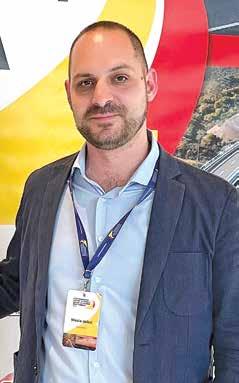
We act responsibly in all areas of business, we take care of both the client and our staff, we cultivate environmental and community awareness, and we are part of a global business community that is guided by internationally recognised principles and values - this is the message from Putinvest.
How was it when you started, and how is it today?
Although every beginning is uncertain and difficult because it is unknown territory, in 2003 we started with a lot of self-confidence,
Multidisciplinarity is not only inevitable in the world of innovation, it also appears in every project we work on. That’s why we believe that the structure of our team, which is made up of engineers from a range of specialties, is important for high-quality and efficient implementation of projects. Also, all our young engineers are supported by experienced colleagues who pass on their valuable experience to them. We are recognised on the market as a responsible and professional partner, and for the projects we have carried out.
Would you say that your best references are the roads and infrastructure in whose construction you participated?
Since we make technical documentation for traffic surfaces with accompanying utilities and provide consulting services in this field (design review, technical acceptance, project management, etc.) and as we have extensive
The state has planned many capital infrastructure facilities for this and the following years. Are you involved in any of them?
The company’s portfolio includes various projects, specific and interesting from a professional viewpoint and important both for the entire Republic of Serbia and for the development of our engineers. As a company or as individual engineers, we have been involved in all major projects in the country in the last 35 years. Through design and design review services, our experts have participated in rehabilitation and construction projects for more than 700 kilometres of state roads, while we have worked on urban road projects for more than 50 local governments. Among other things, we are currently working on road projects for nine wind farms, over 500 kilometres of roads for more than 230 turbines. We design roads according to the specifications of various wind turbine manufacturers (Siemens, Vestas, GE and ENERCON).
INFRASTRUCTURE 2023 15
NIKOLA JELKIĆ, DEPUTY DIRECTOR, PUTINVEST
BUSINESS
The key goal of every project we work on is a positive impact on both our clients and the end users







































 MARIYA GABRIEL
EUROPEAN COMMISSIONER FOR INNOVATION, RESEARCH, CULTURE, EDUCATION AND YOUTH
MARIYA GABRIEL
EUROPEAN COMMISSIONER FOR INNOVATION, RESEARCH, CULTURE, EDUCATION AND YOUTH




 CHARLOTTE RUHE
CHARLOTTE RUHE








































































































































 H.E. Maria Levanti, Ambassador of Greece to Serbia
H.E. Maria Levanti, Ambassador of Greece to Serbia






























































































 GORAN VESIĆ, MINISTER OF CONSTRUCTION, TRANSPORT AND INFRASTRUCTURE
GORAN VESIĆ, MINISTER OF CONSTRUCTION, TRANSPORT AND INFRASTRUCTURE
































































